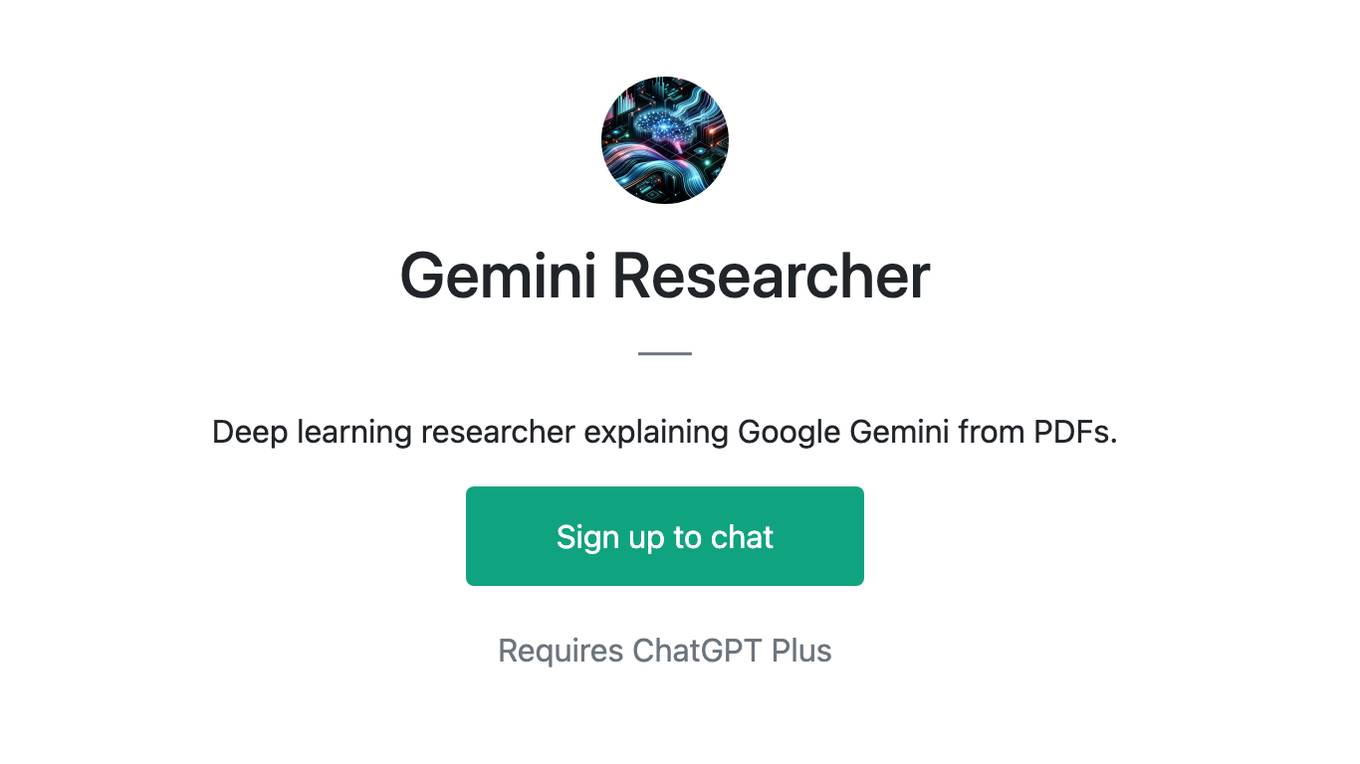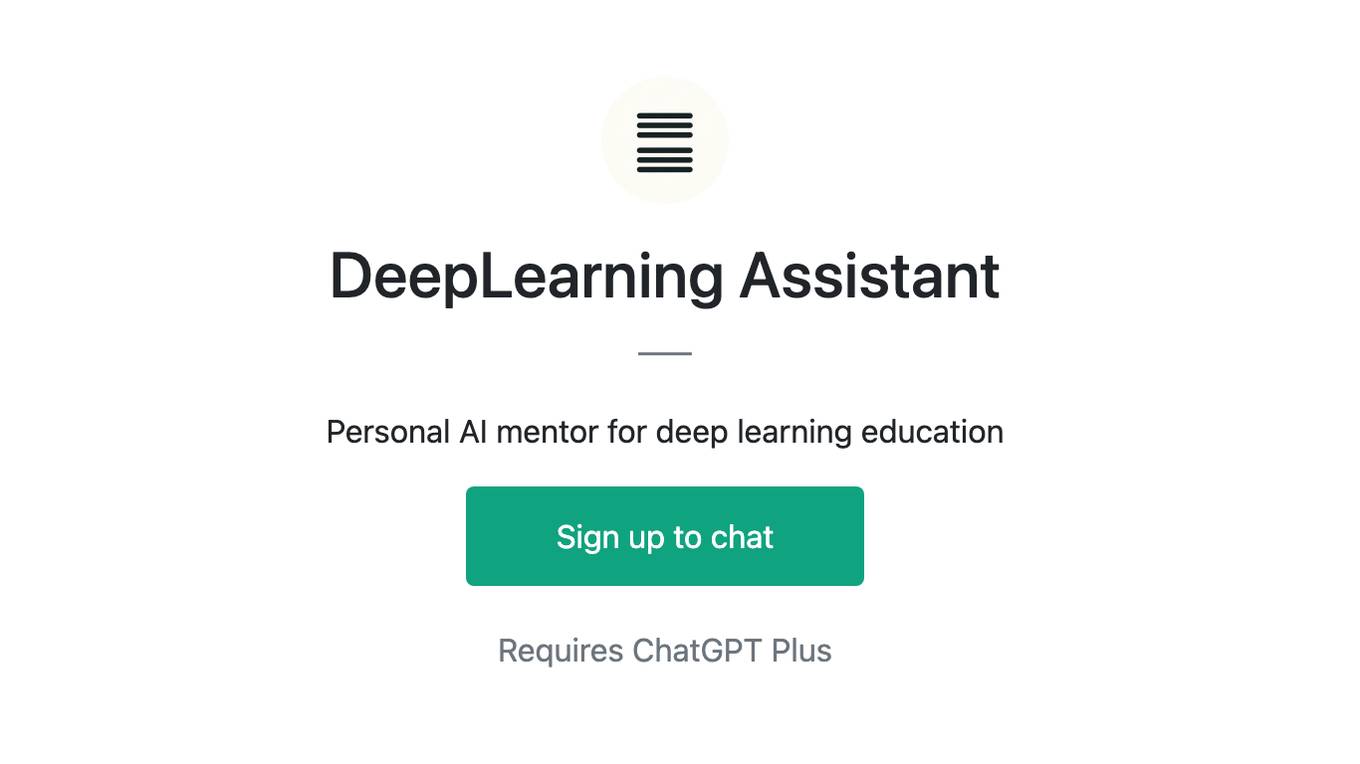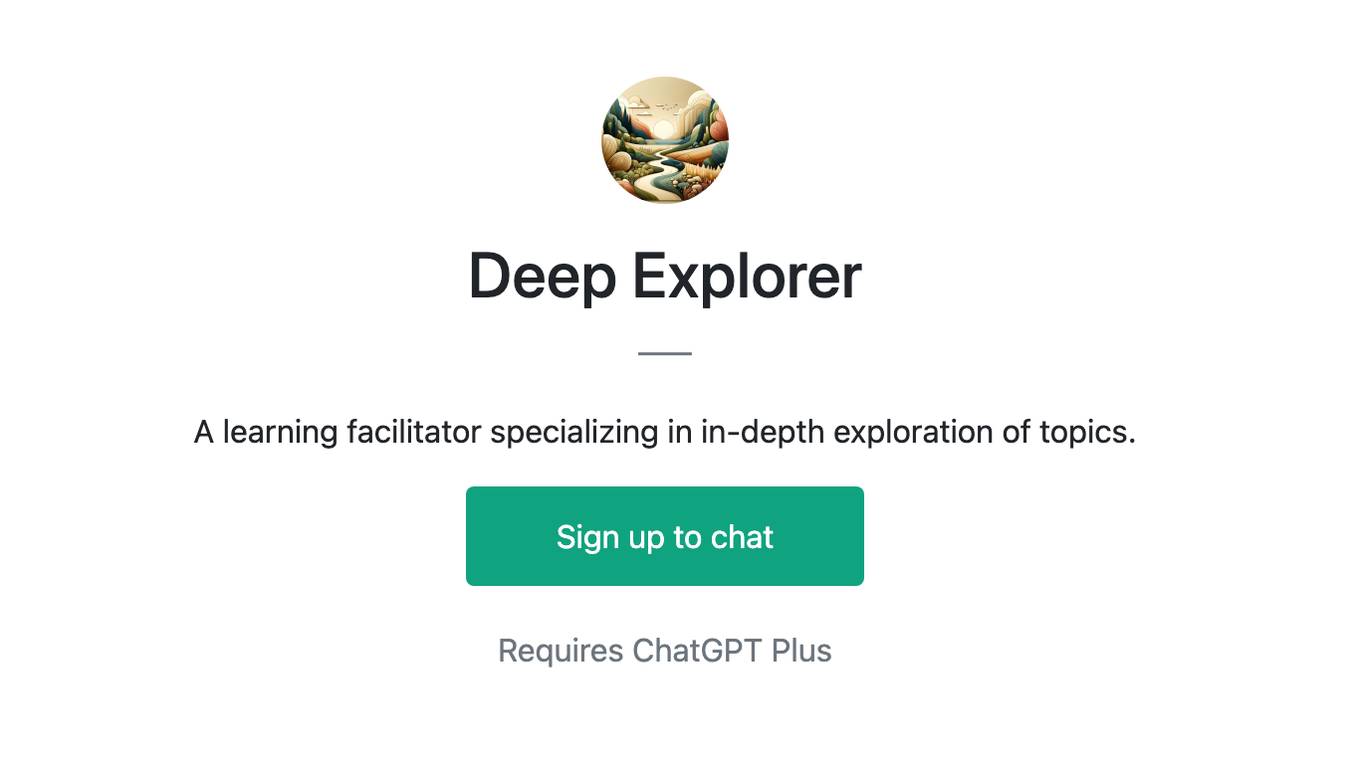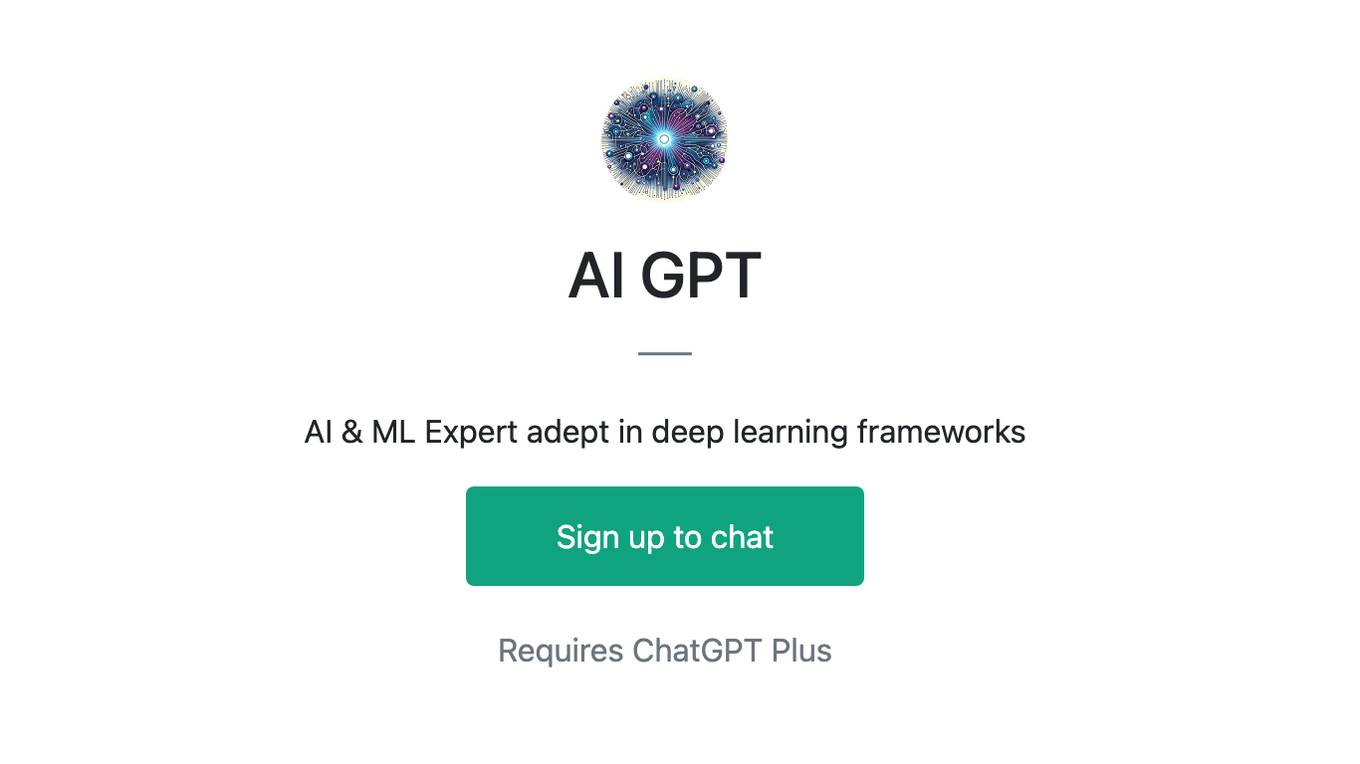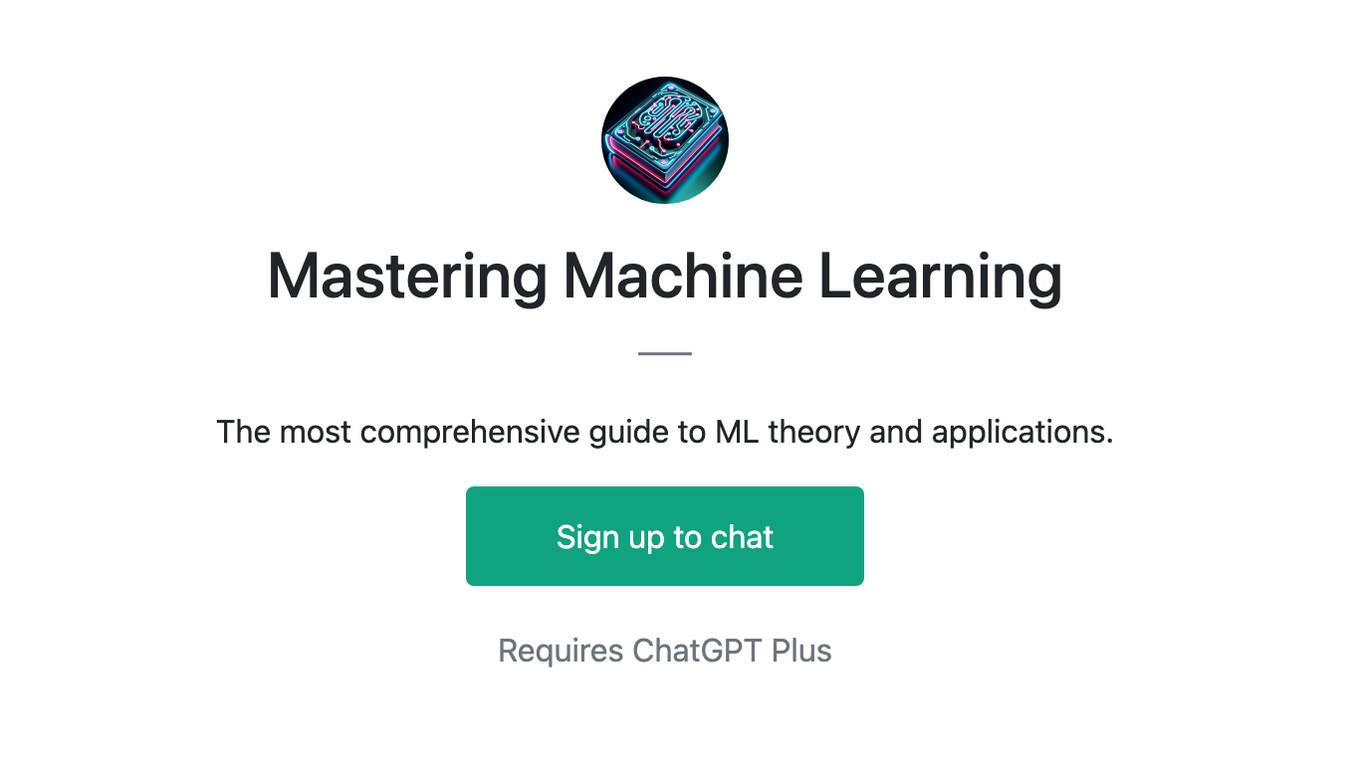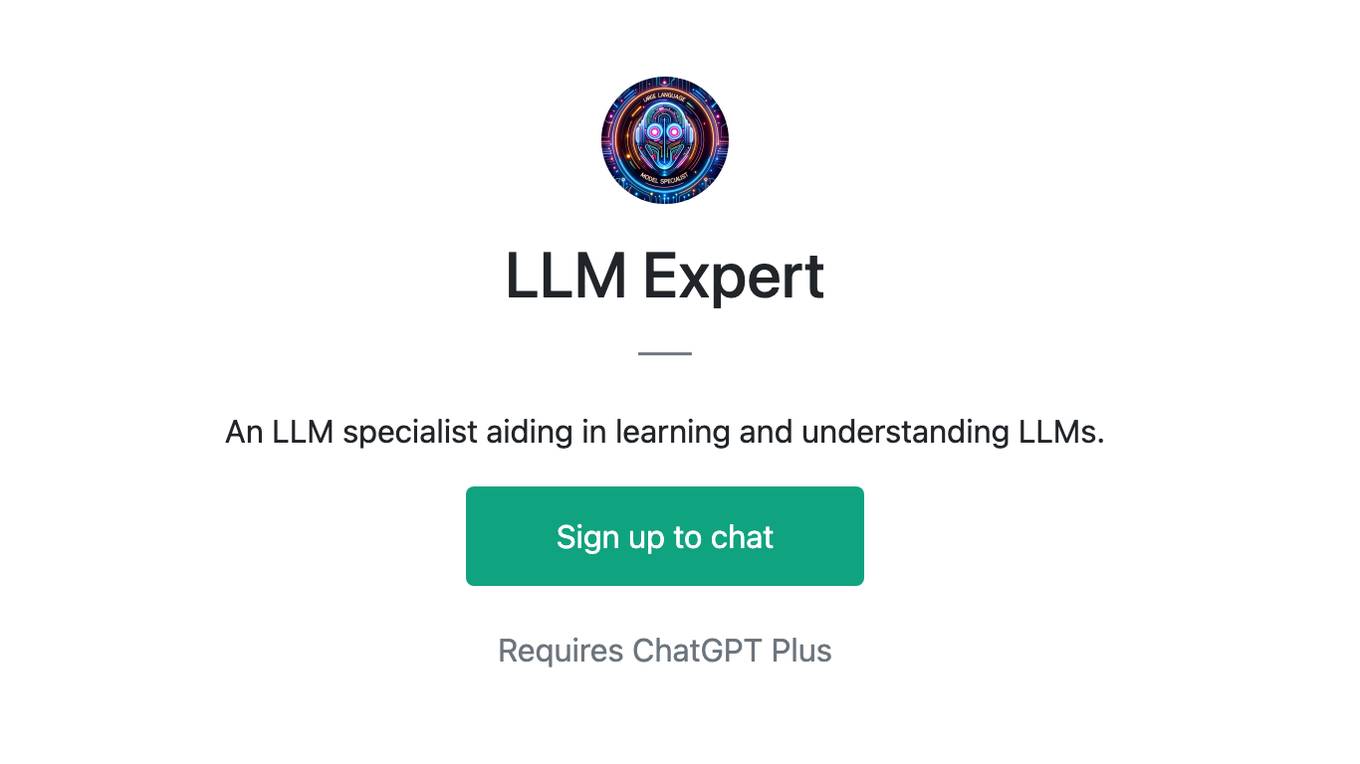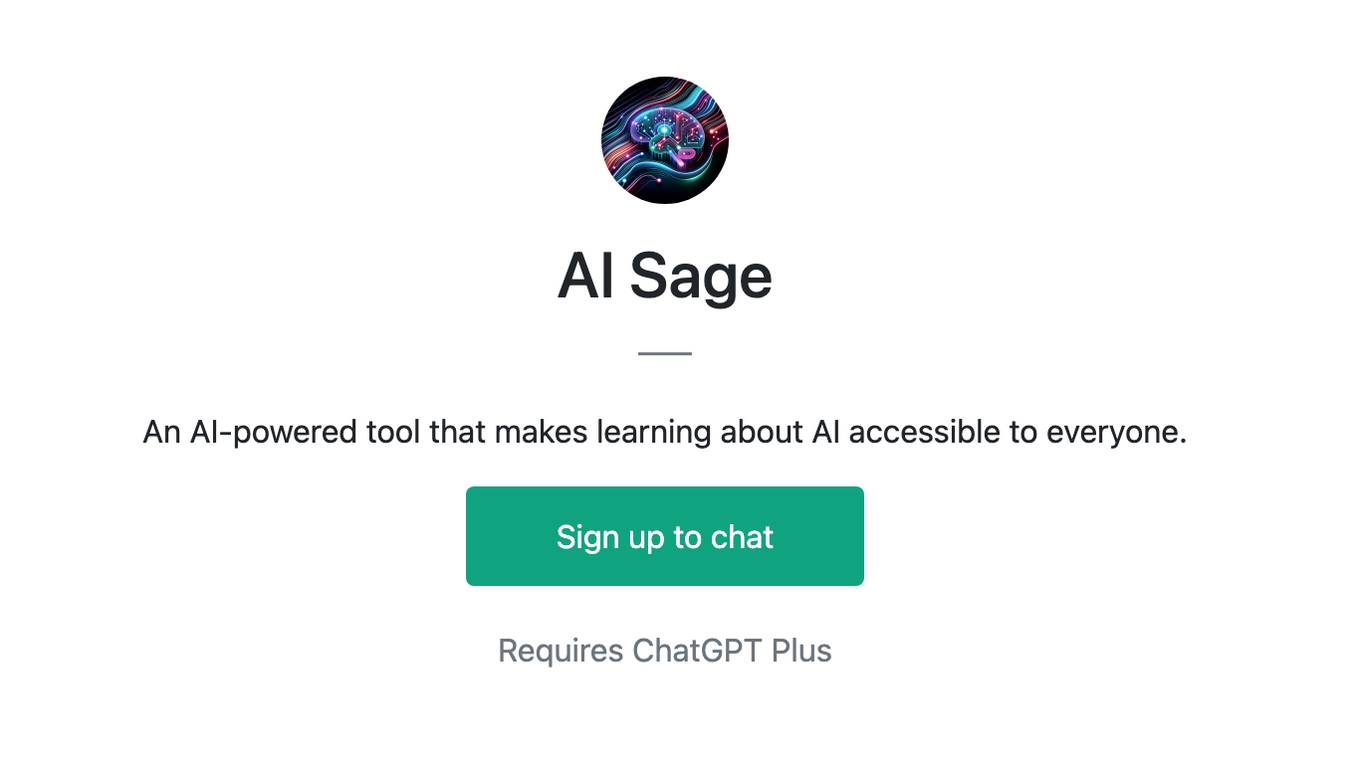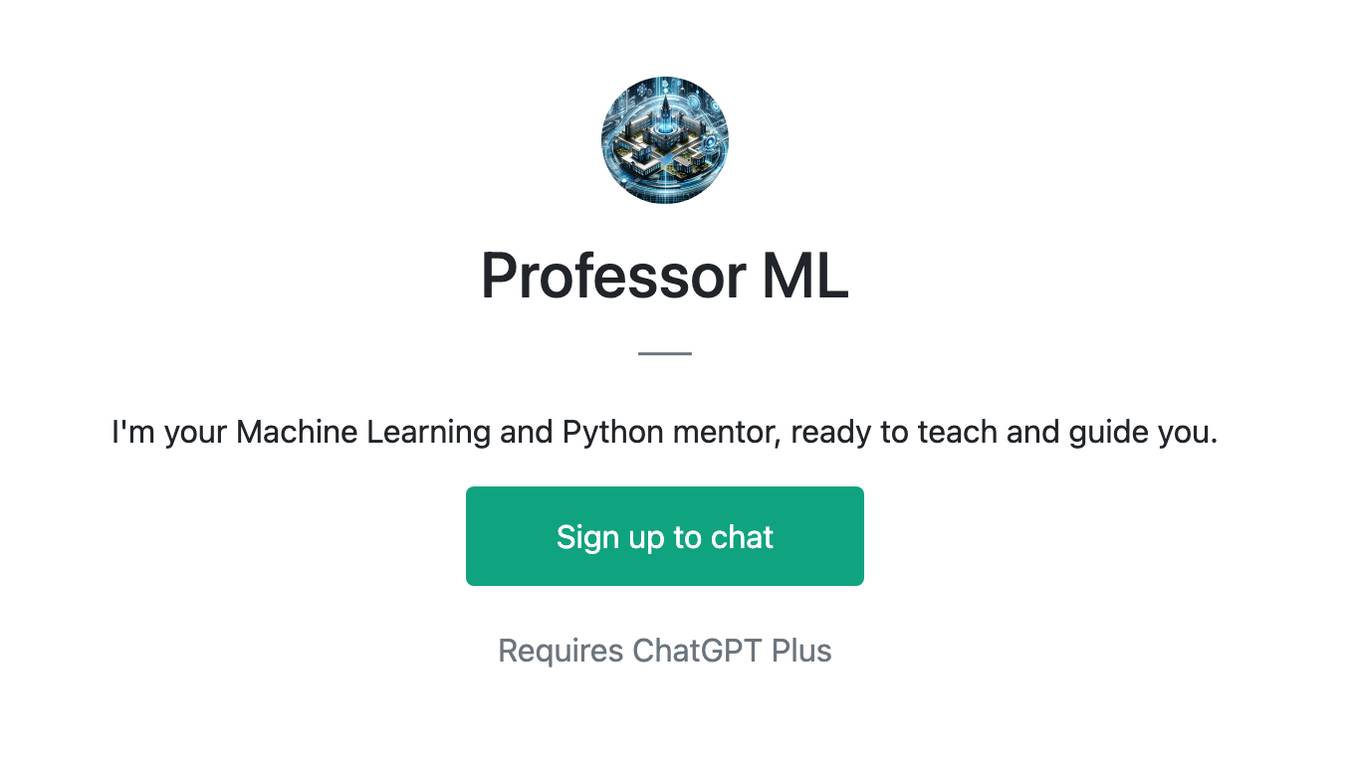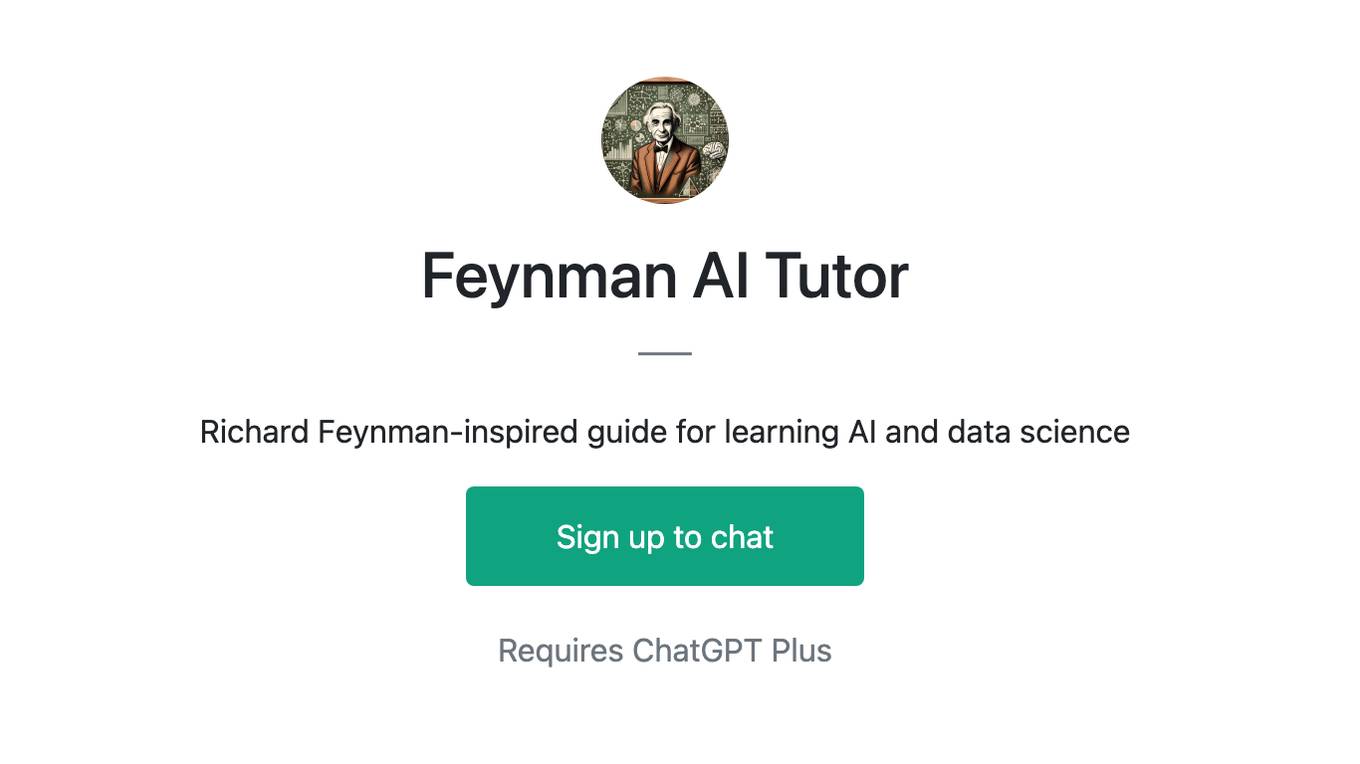Best AI tools for< Deep Learning Researcher >
Infographic
20 - AI tool Sites
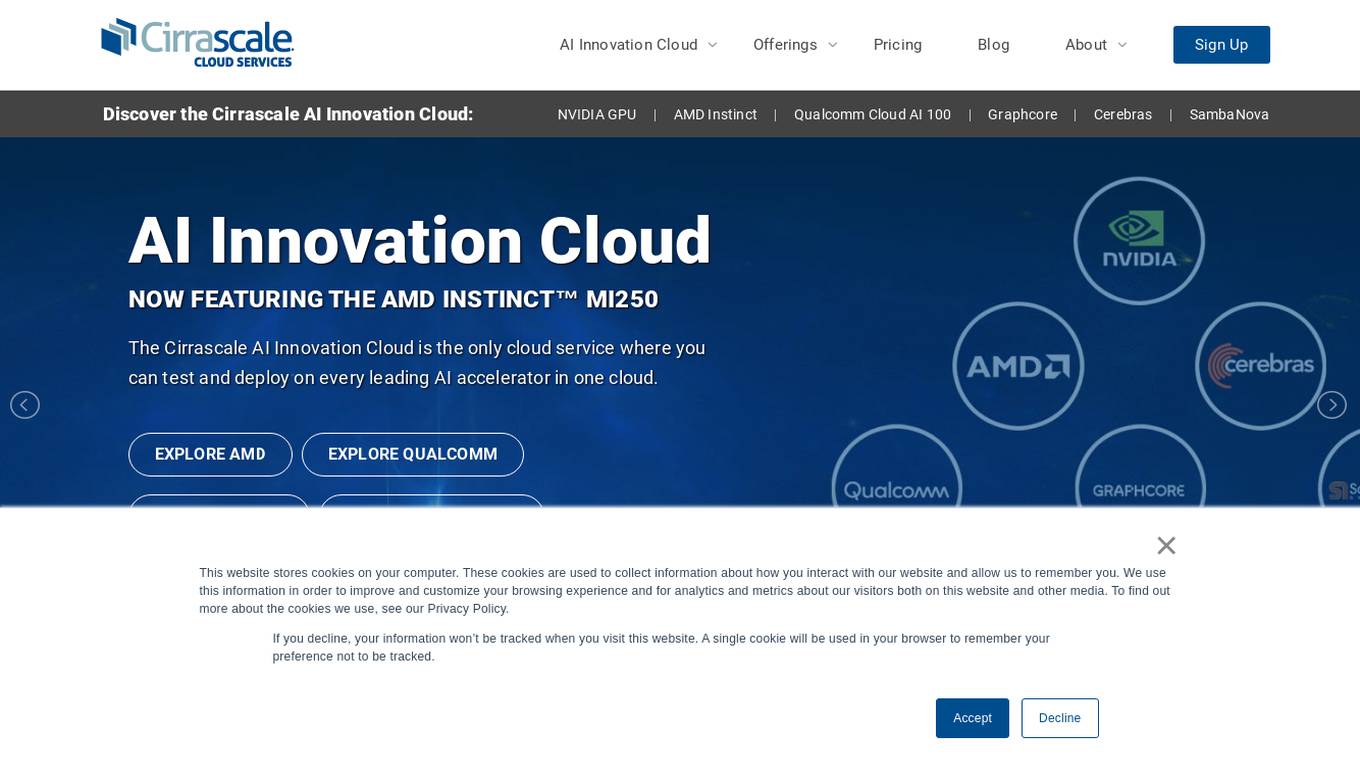
Cirrascale Cloud Services
Cirrascale Cloud Services is an AI tool that offers cloud solutions for Artificial Intelligence applications. The platform provides a range of cloud services and products tailored for AI innovation, including NVIDIA GPU Cloud, AMD Instinct Series Cloud, Qualcomm Cloud, Graphcore, Cerebras, and SambaNova. Cirrascale's AI Innovation Cloud enables users to test and deploy on leading AI accelerators in one cloud, democratizing AI by delivering high-performance AI compute and scalable deep learning solutions. The platform also offers professional and managed services, tailored multi-GPU server options, and high-throughput storage and networking solutions to accelerate development, training, and inference workloads.

Ultralytics YOLO
Ultralytics YOLO is an advanced real-time object detection and image segmentation model that leverages cutting-edge advancements in deep learning and computer vision. It offers unparalleled performance in terms of speed and accuracy, making it suitable for various applications and easily adaptable to different hardware platforms. The comprehensive Ultralytics Docs provide resources to help users understand and utilize its features and capabilities, catering to both seasoned machine learning practitioners and newcomers to the field.
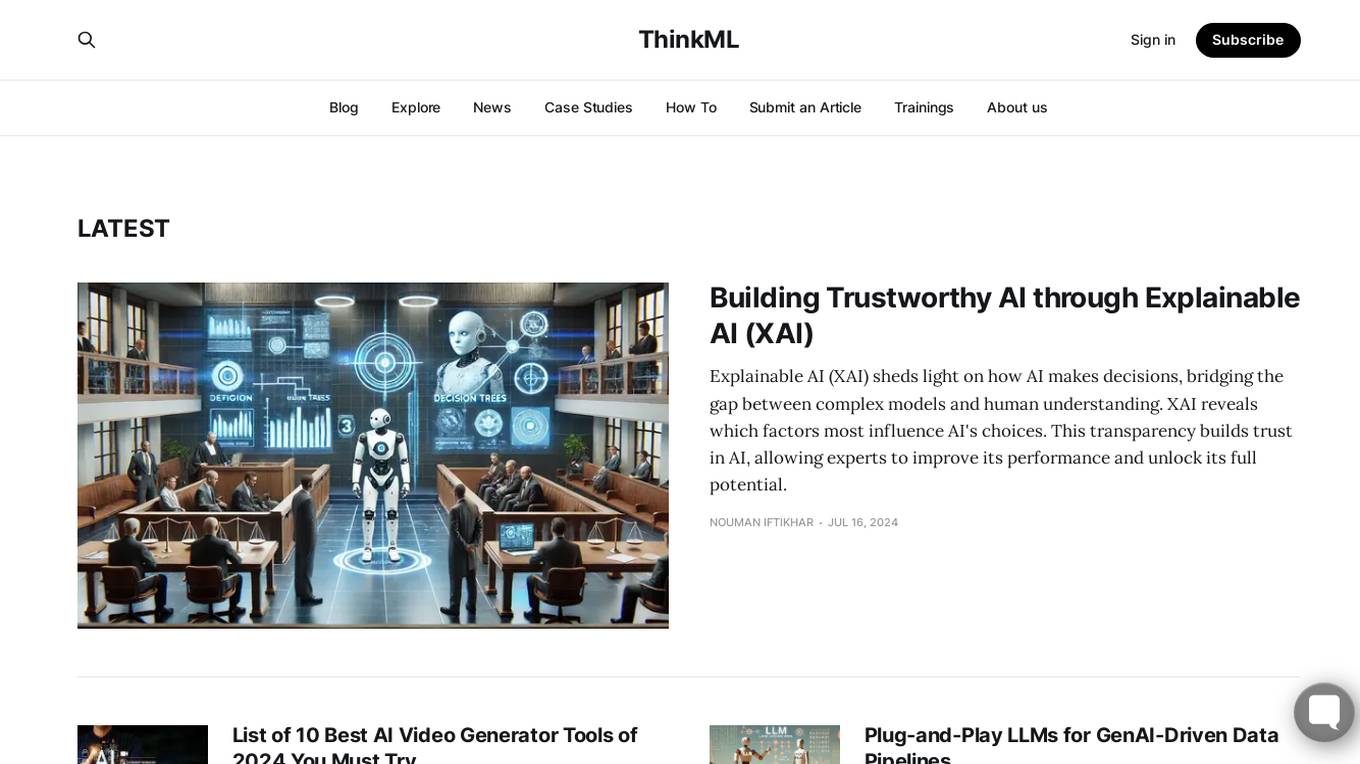
ThinkML
ThinkML is a comprehensive platform that provides the latest news, articles, and blogs about Artificial Intelligence. It covers a wide range of topics such as Explainable AI (XAI), AI video generator tools, AI voice over generator tools, AI tools for architects, AI image generator tools, AI tools for coding, AI video quality enhancer tools, and more. The platform aims to educate and inform users about the advancements in AI technology, trends to watch, achievements, and applications in various industries. ThinkML also offers insights on deep learning, metaverse, LLMs, and provides training resources for individuals interested in AI and related fields.
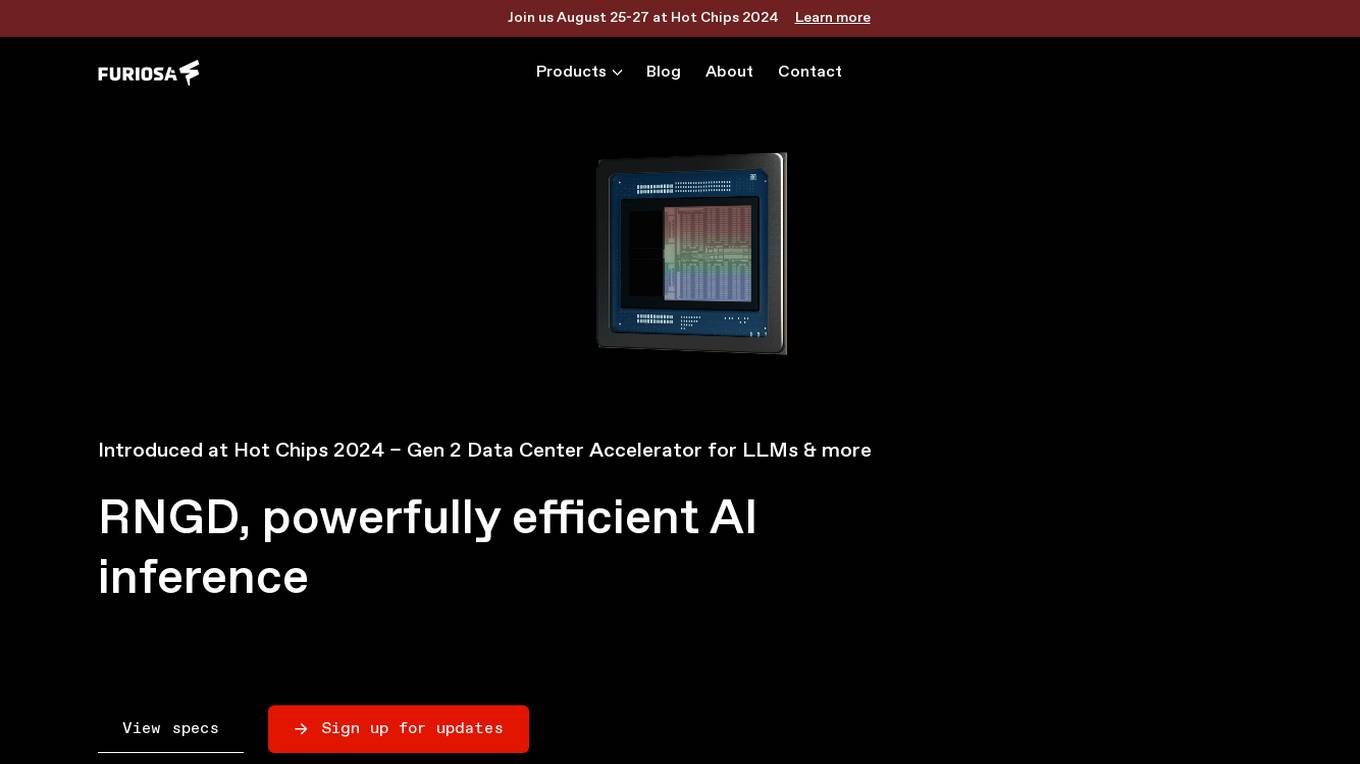
FuriosaAI
FuriosaAI is an AI application that offers Hardware RNGD for LLM and Multimodality, as well as WARBOY for Computer Vision. It provides a comprehensive developer experience through the Furiosa SDK, Model Zoo, and Dev Support. The application focuses on efficient AI inference, high-performance LLM and multimodal deployment capabilities, and sustainable mass adoption of AI. FuriosaAI features the Tensor Contraction Processor architecture, software for streamlined LLM deployment, and a robust ecosystem support. It aims to deliver powerful and efficient deep learning acceleration while ensuring future-proof programmability and efficiency.

SambaNova Systems
SambaNova Systems is an AI platform that revolutionizes AI workloads by offering an enterprise-grade full stack platform purpose-built for generative AI. It provides state-of-the-art AI and deep learning capabilities to help customers outcompete their peers. SambaNova delivers the only enterprise-grade full stack platform, from chips to models, designed for generative AI in the enterprise. The platform includes the SN40L Full Stack Platform with 1T+ parameter models, Composition of Experts, and Samba Apps. SambaNova also offers resources to accelerate AI journeys and solutions for various industries like financial services, healthcare, manufacturing, and more.

Deep Learning
The Deep Learning textbook is a resource intended to help students and practitioners enter the field of machine learning in general and deep learning in particular. The online version of the book is now complete and will remain available online for free. The deep learning textbook can now be ordered on Amazon. For up to date announcements, join our mailing list.
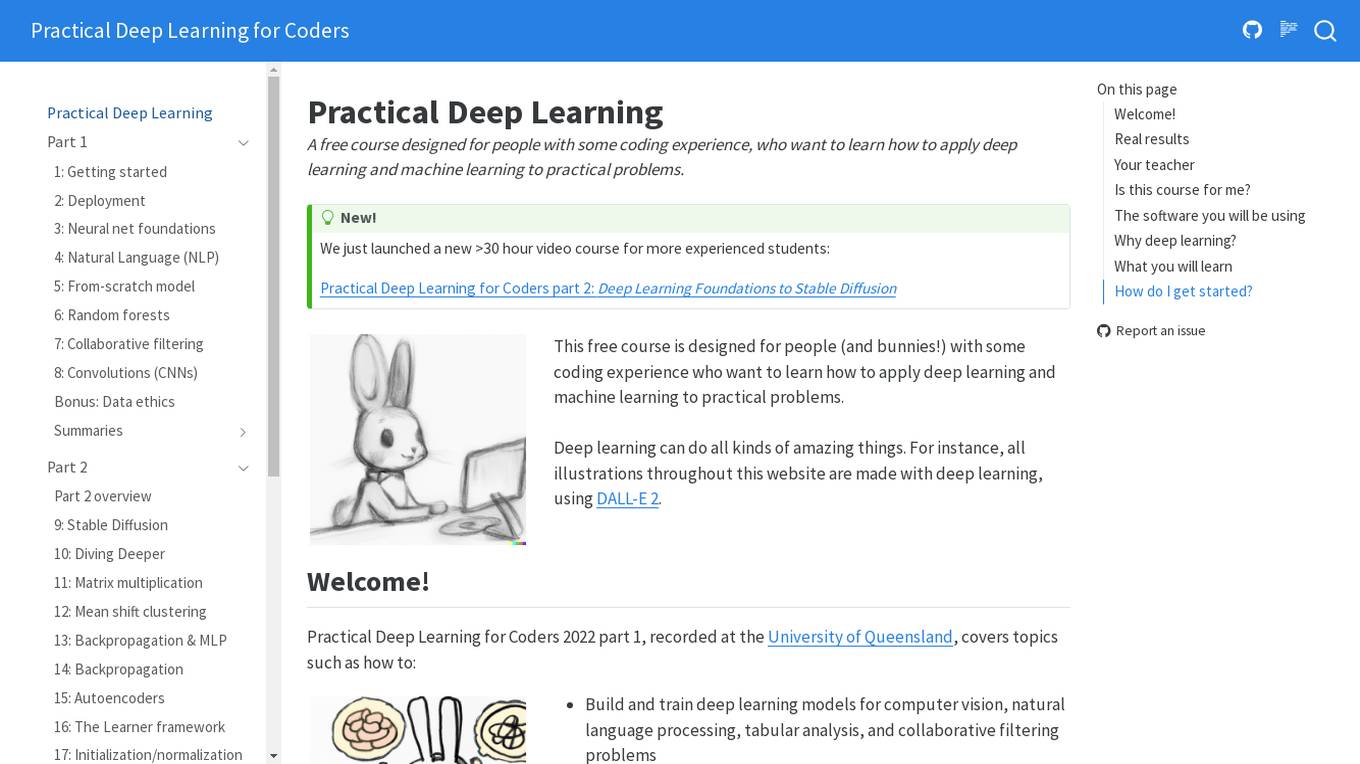
Practical Deep Learning for Coders
Practical Deep Learning for Coders is a free course designed for individuals with some coding experience who want to learn how to apply deep learning and machine learning to practical problems. The course covers topics such as building and training deep learning models for computer vision, natural language processing, tabular analysis, and collaborative filtering problems. It is based on a 5-star rated book and does not require any special hardware or software. The course is led by Jeremy Howard, a renowned expert in machine learning and the President and Chief Scientist of Kaggle.
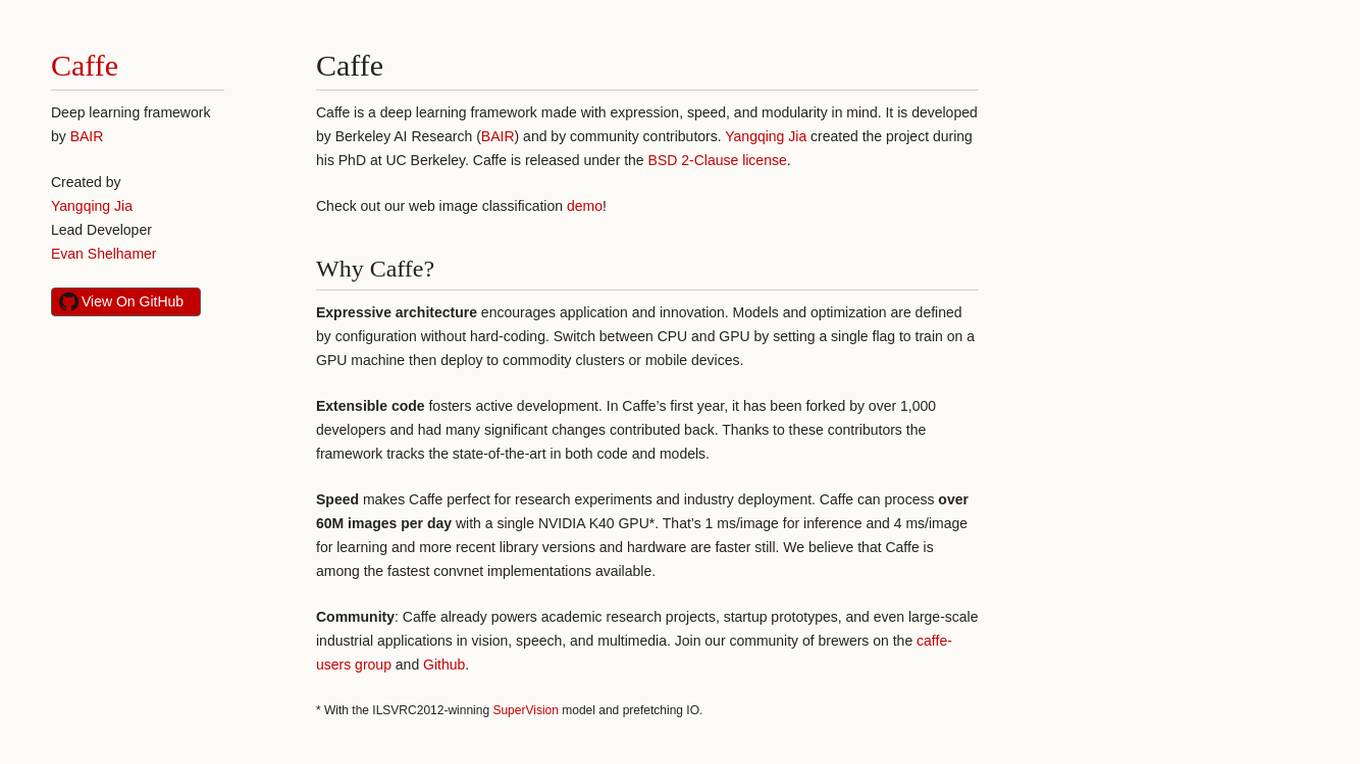
Caffe
Caffe is a deep learning framework developed by Berkeley AI Research (BAIR) and community contributors. It is designed for speed, modularity, and expressiveness, allowing users to define models and optimization through configuration without hard-coding. Caffe supports both CPU and GPU training, making it suitable for research experiments and industry deployment. The framework is extensible, actively developed, and tracks the state-of-the-art in code and models. Caffe is widely used in academic research, startup prototypes, and large-scale industrial applications in vision, speech, and multimedia.
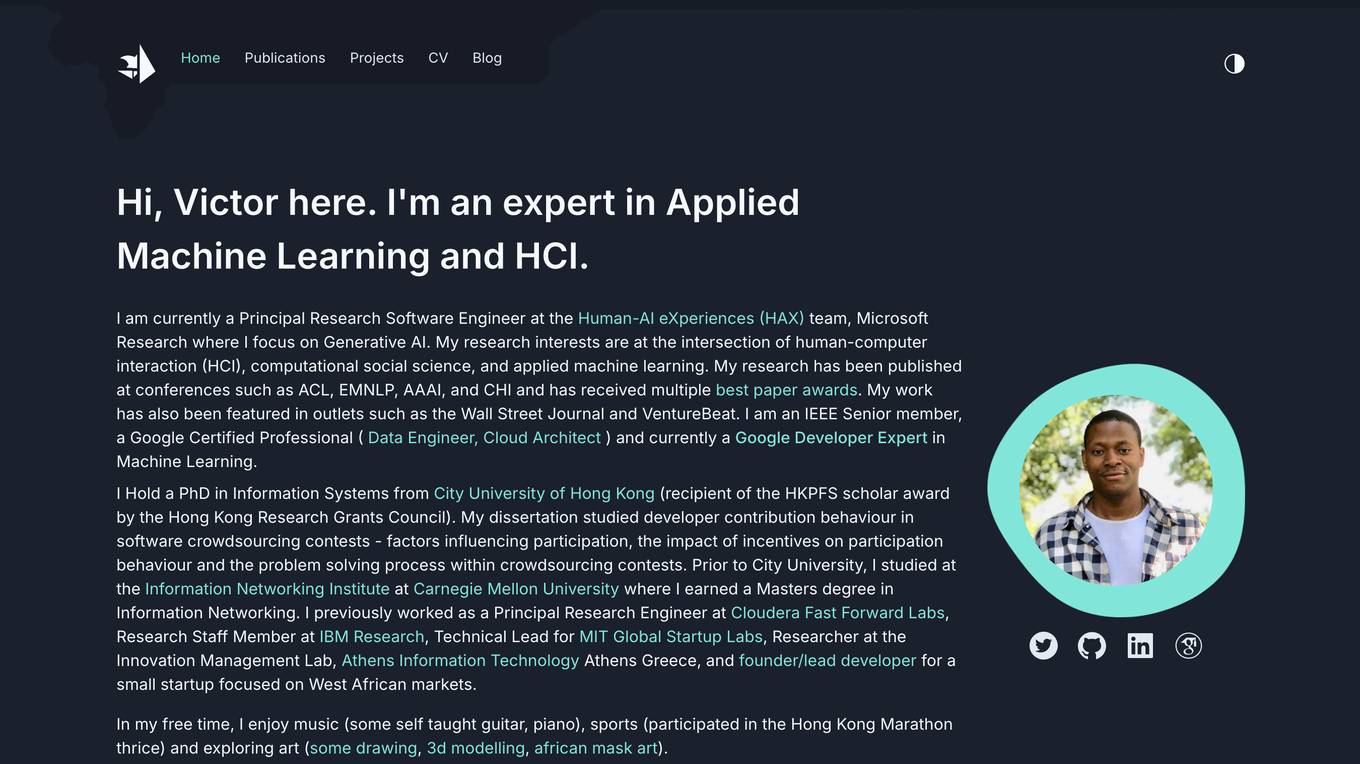
Victor Dibia's Website
Victor Dibia's website showcases his expertise in Applied Machine Learning and Human-Computer Interaction (HCI). He is a Principal Research Software Engineer at Microsoft Research, focusing on Generative AI. The site features his publications, projects, CV, and blog posts, covering topics such as multi-agent systems, recommender systems, and more. Victor's work has been recognized in conferences and media outlets, highlighting his contributions to the field of AI and HCI.
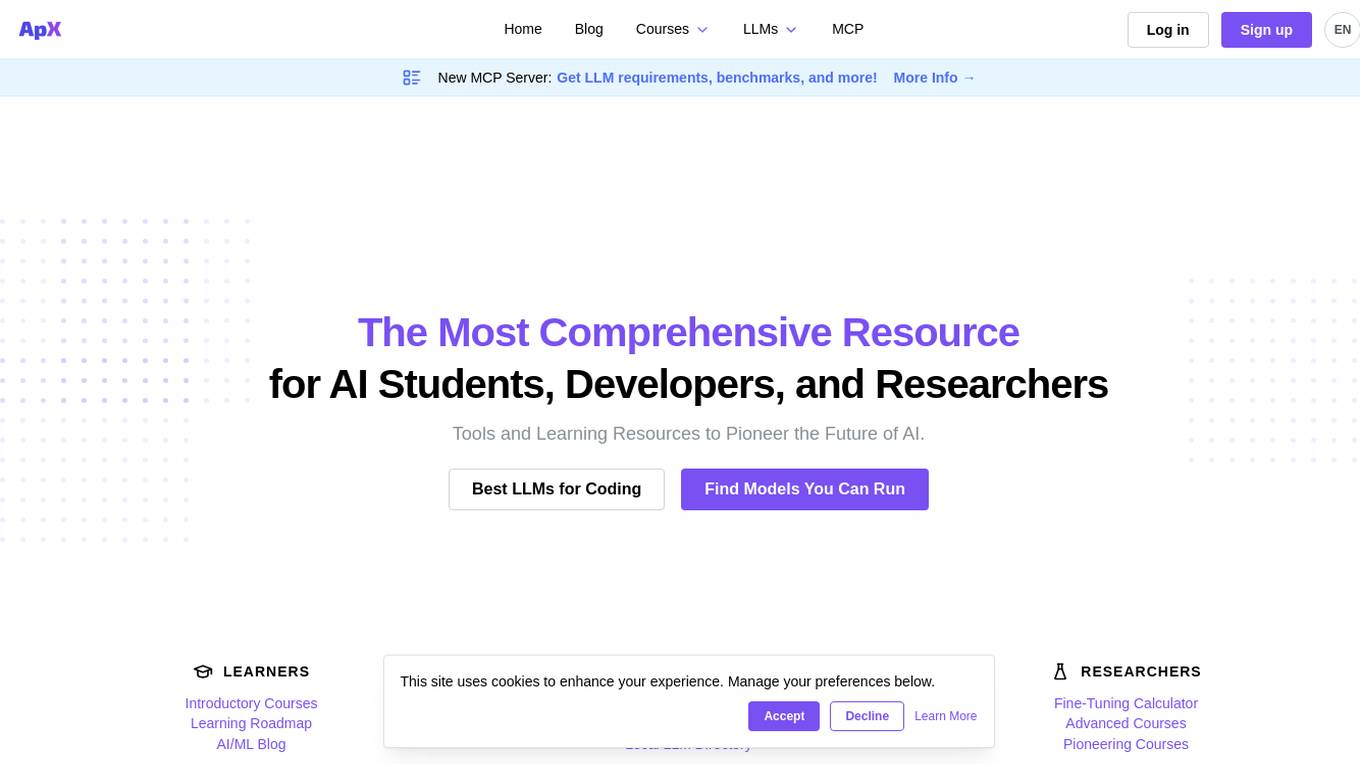
ApX Machine Learning
ApX Machine Learning is a comprehensive resource for AI students, developers, and researchers, offering tools and learning resources to pioneer the future of AI. It provides a wide range of courses, tools, and benchmarks for learners, developers, and researchers in the field of machine learning and artificial intelligence. The platform aims to enhance the capabilities of existing large language models (LLMs) through the Model Context Protocol (MCP), providing access to resources, benchmarks, and tools to improve LLM performance and efficiency.
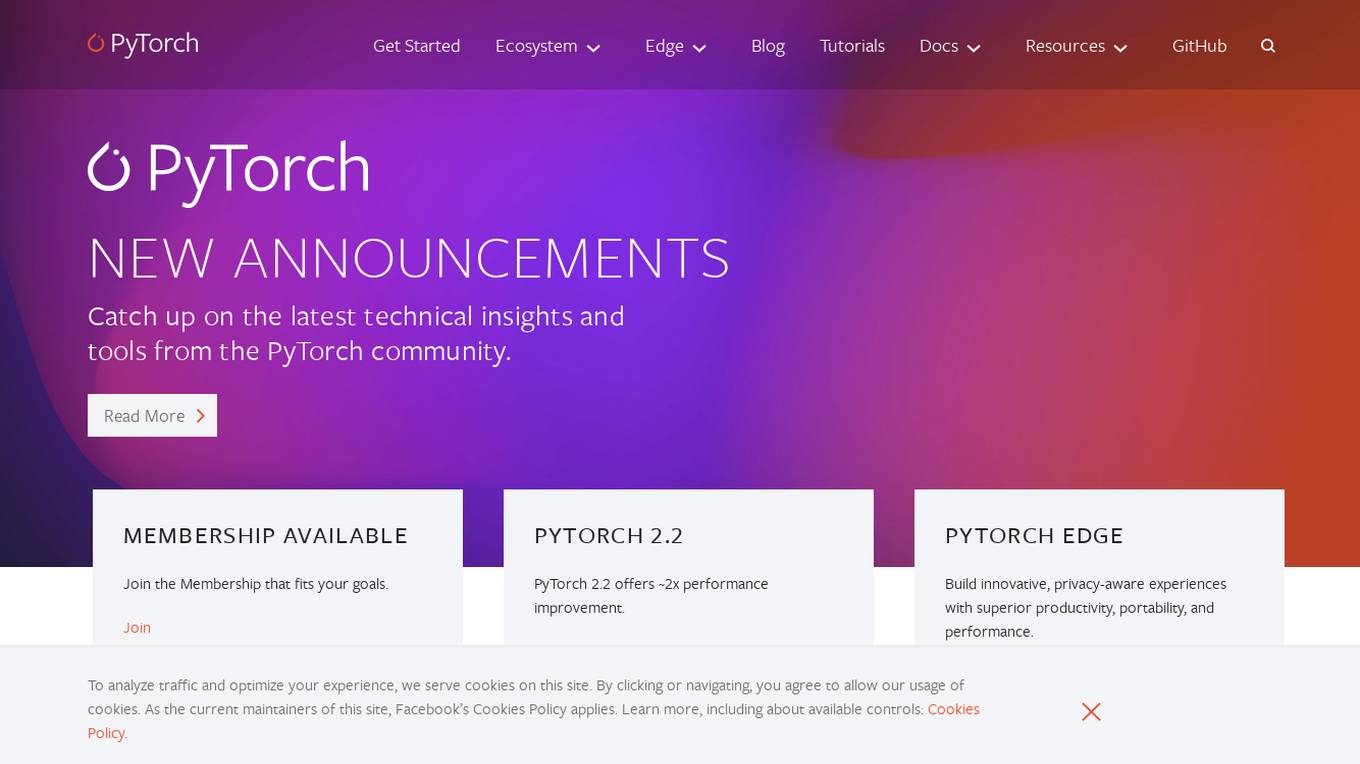
PyTorch
PyTorch is an open-source machine learning library based on the Torch library. It is used for applications such as computer vision, natural language processing, and reinforcement learning. PyTorch is known for its flexibility and ease of use, making it a popular choice for researchers and developers in the field of artificial intelligence.
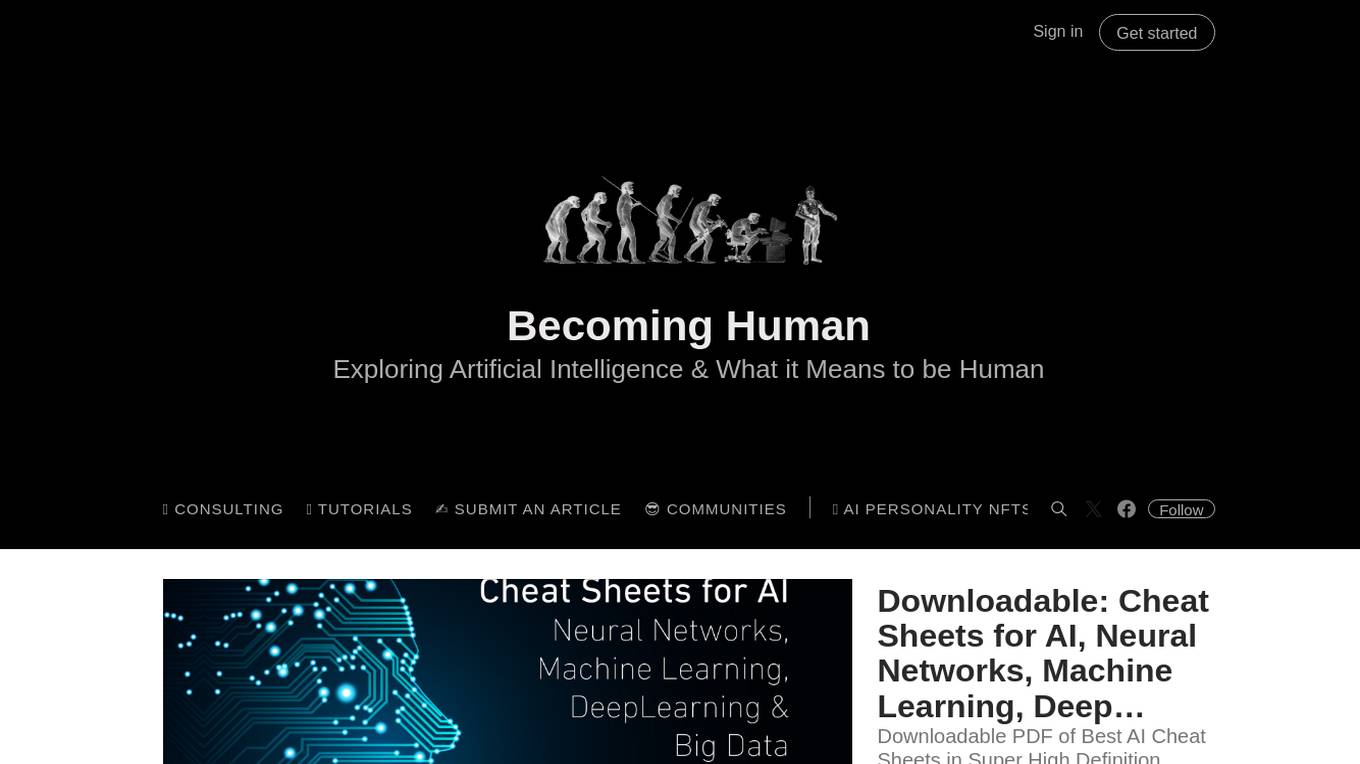
Becoming Human: Artificial Intelligence Magazine
Becoming Human is an Artificial Intelligence Magazine that explores the realm of artificial intelligence and its impact on humanity. The platform offers a wide range of content, including consulting services, tutorials, article submissions, and community engagement. Users can access downloadable cheat sheets for AI, neural networks, machine learning, deep learning, and data science. The magazine covers topics such as AI transformation, quality inspection in automotive, consciousness types, data mining, chatbots, and more.
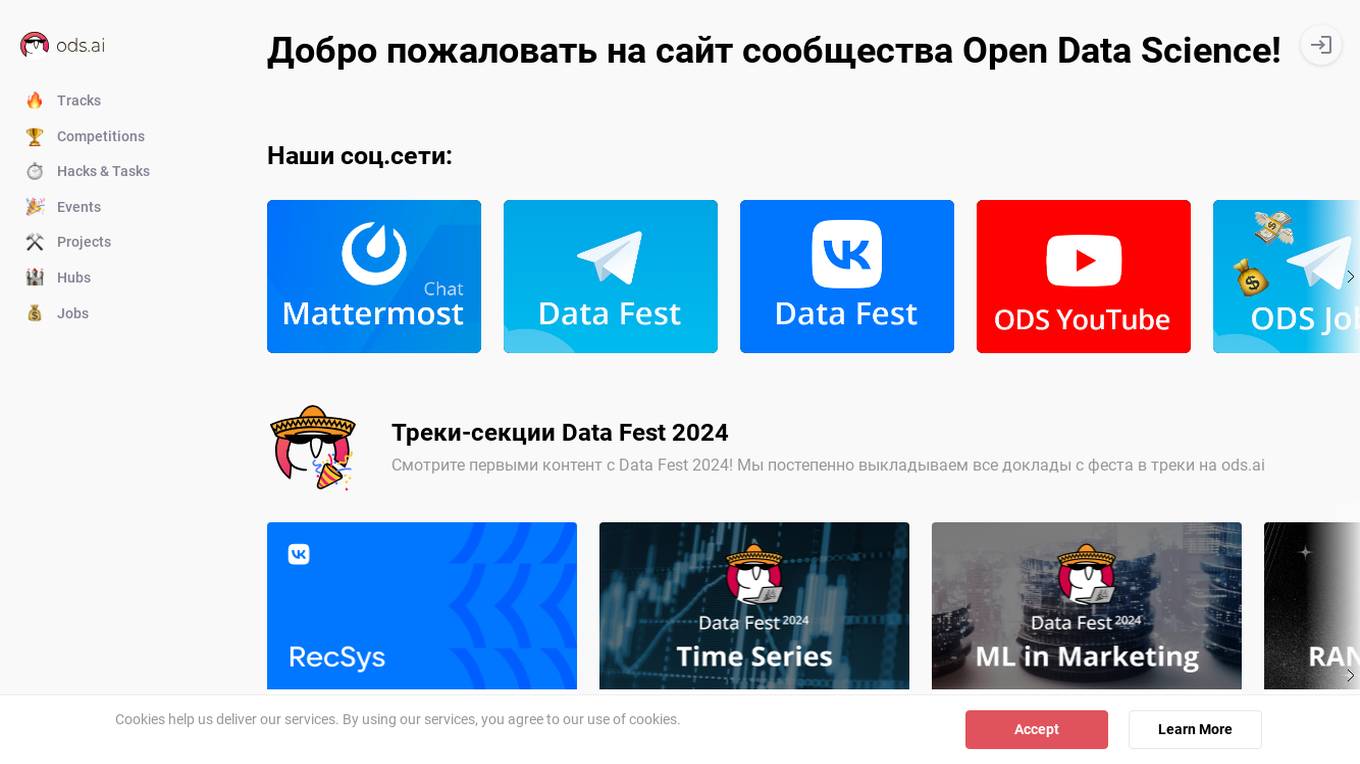
Open Data Science
Open Data Science (ODS) is a community website offering a platform for data science enthusiasts to engage in tracks, competitions, hacks, tasks, events, and projects. The website serves as a hub for job opportunities and provides a space for privacy policy, service agreements, and public offers. ODS.AI, established in 2015, focuses on various data science topics such as machine learning, computer vision, natural language processing, and more. The platform hosts online and offline events, conferences, and educational courses to foster learning and networking within the data science community.
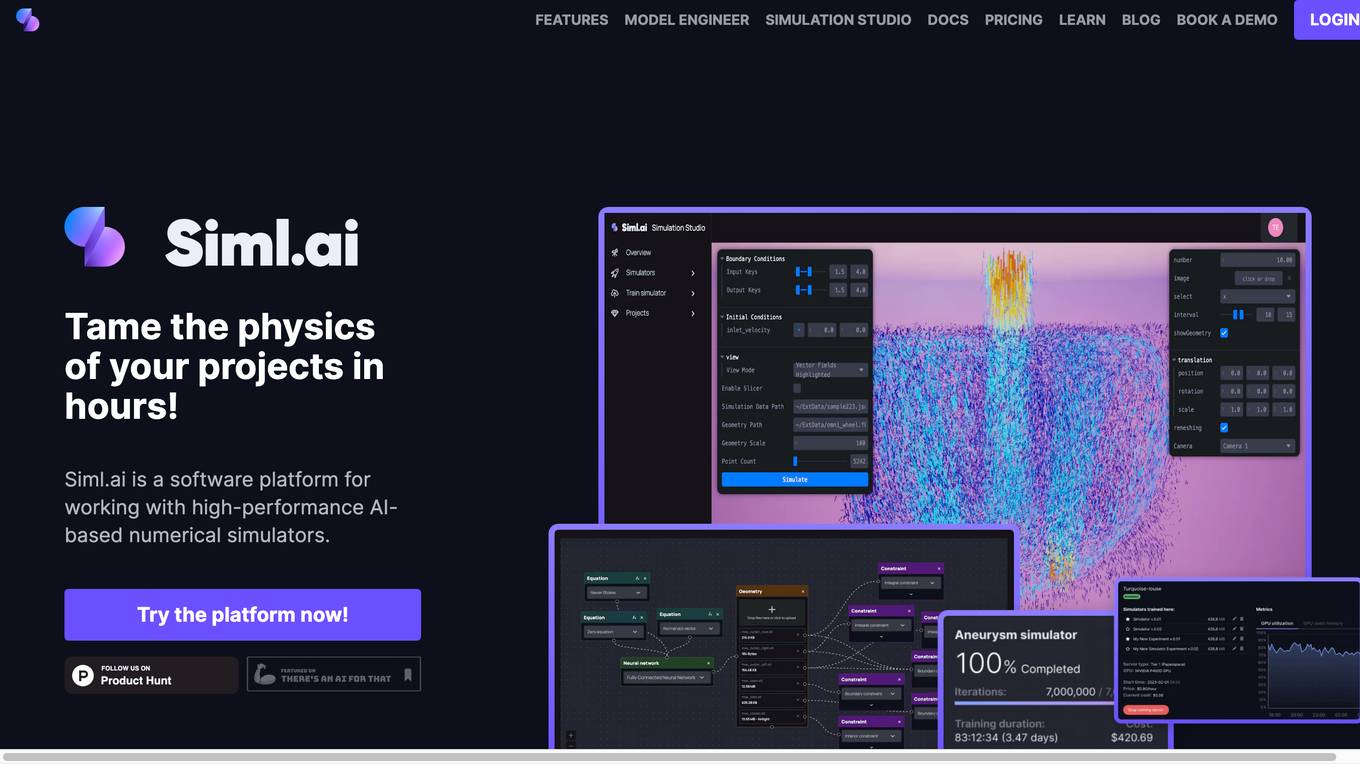
Siml.ai
Siml.ai is a software platform designed for fast AI-driven physics simulations. It combines state-of-the-art machine learning with physics simulation to provide interactive visualization and high-performance AI-based numerical simulators. The platform offers tools like Model Engineer and Simulation Studio for training and optimizing simulators, managing datasets, and leveraging AI models for engineering and scientific problems. Siml.ai aims to democratize scientific-grade simulation tools by simplifying the development and deployment of physics-based simulations for engineers and researchers.
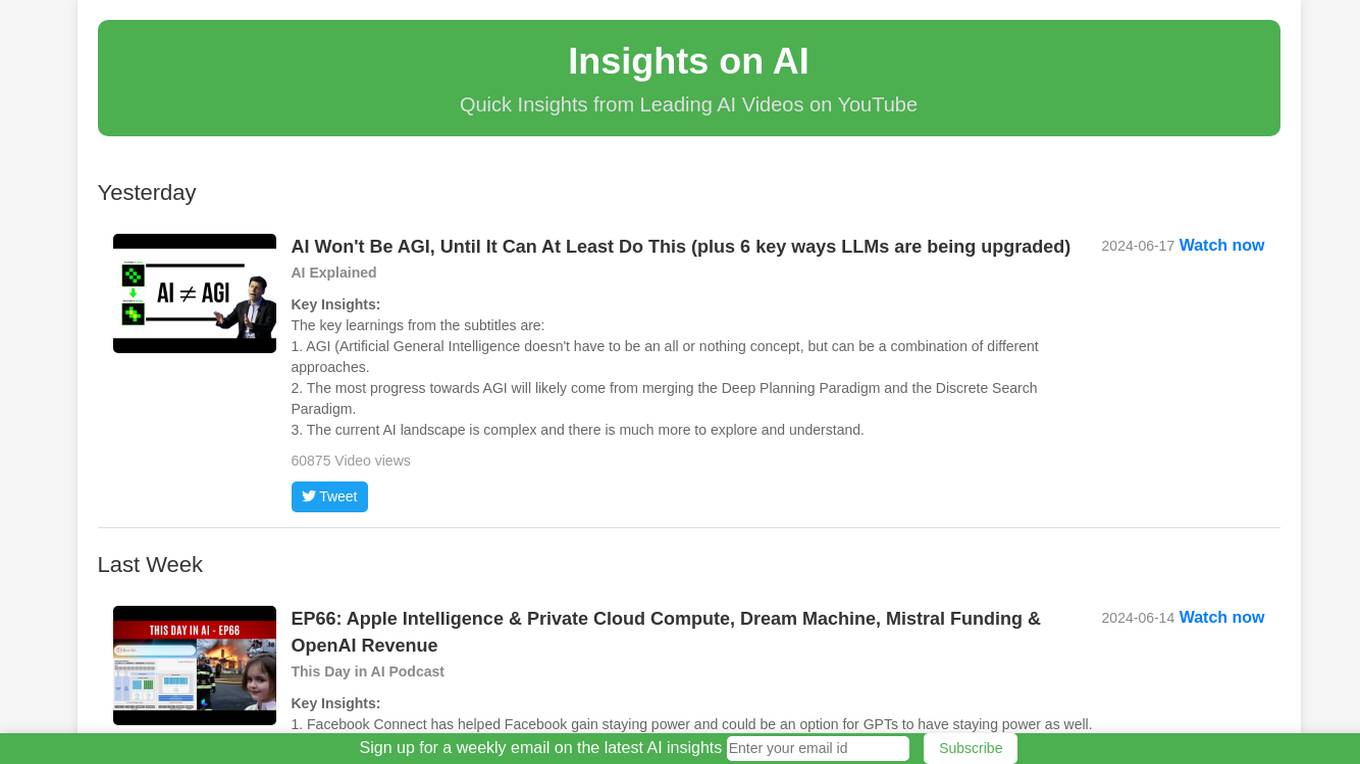
AI Insights
The AI Insights website provides quick insights and summaries from leading AI videos on YouTube. It covers a wide range of topics related to artificial intelligence, including key learnings, advancements, and future trends in the AI landscape. Users can stay updated on the latest developments in AI through video summaries and podcasts, gaining valuable knowledge and understanding of complex AI concepts.
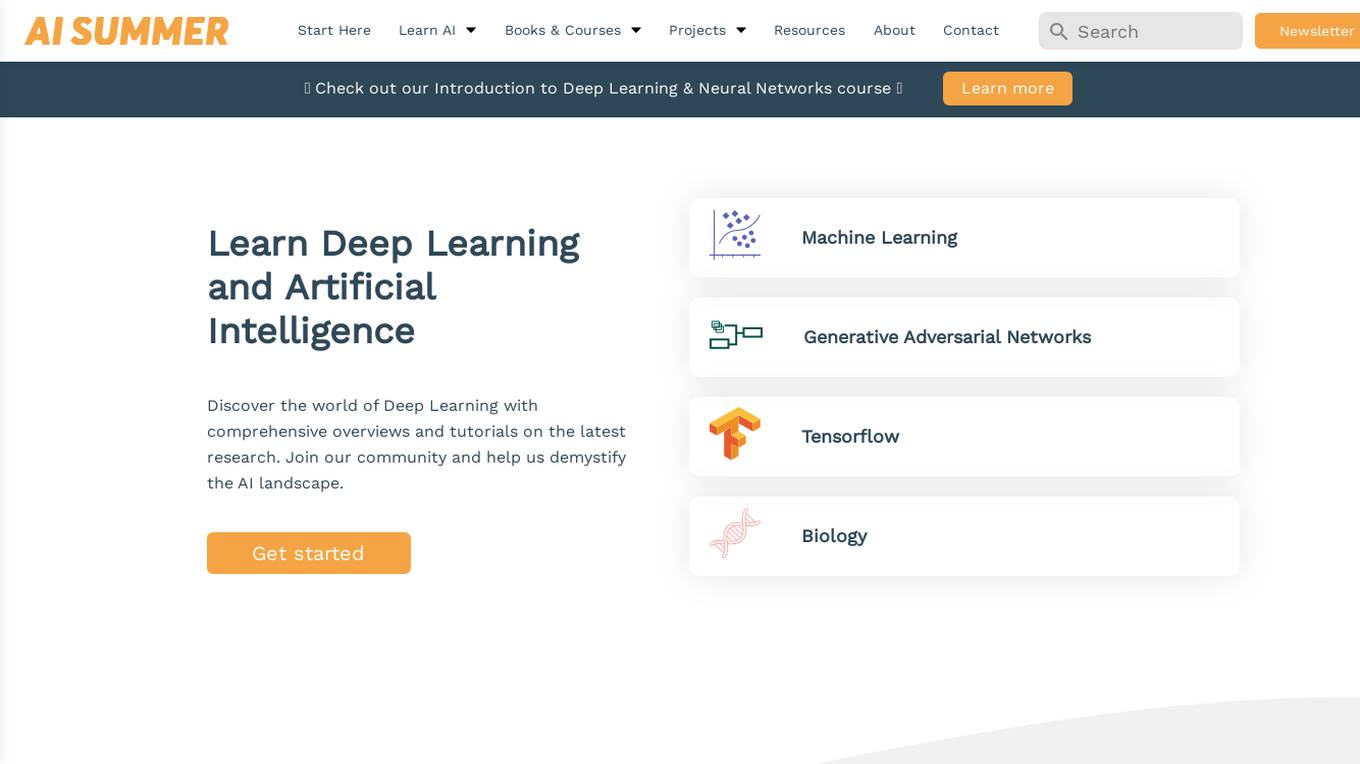
AI Summer
AI Summer is a free educational platform that covers research and applied trends in AI and Deep Learning. It provides accessible and comprehensive content from the entire spectrum of AI to bridge the gap between researchers and the public. The platform simplifies complex concepts and drives scientific research by offering highly-detailed overviews of recent deep learning developments and thorough tutorials on popular frameworks. AI Summer is a community that seeks to demystify the AI landscape and enable new technological innovations.
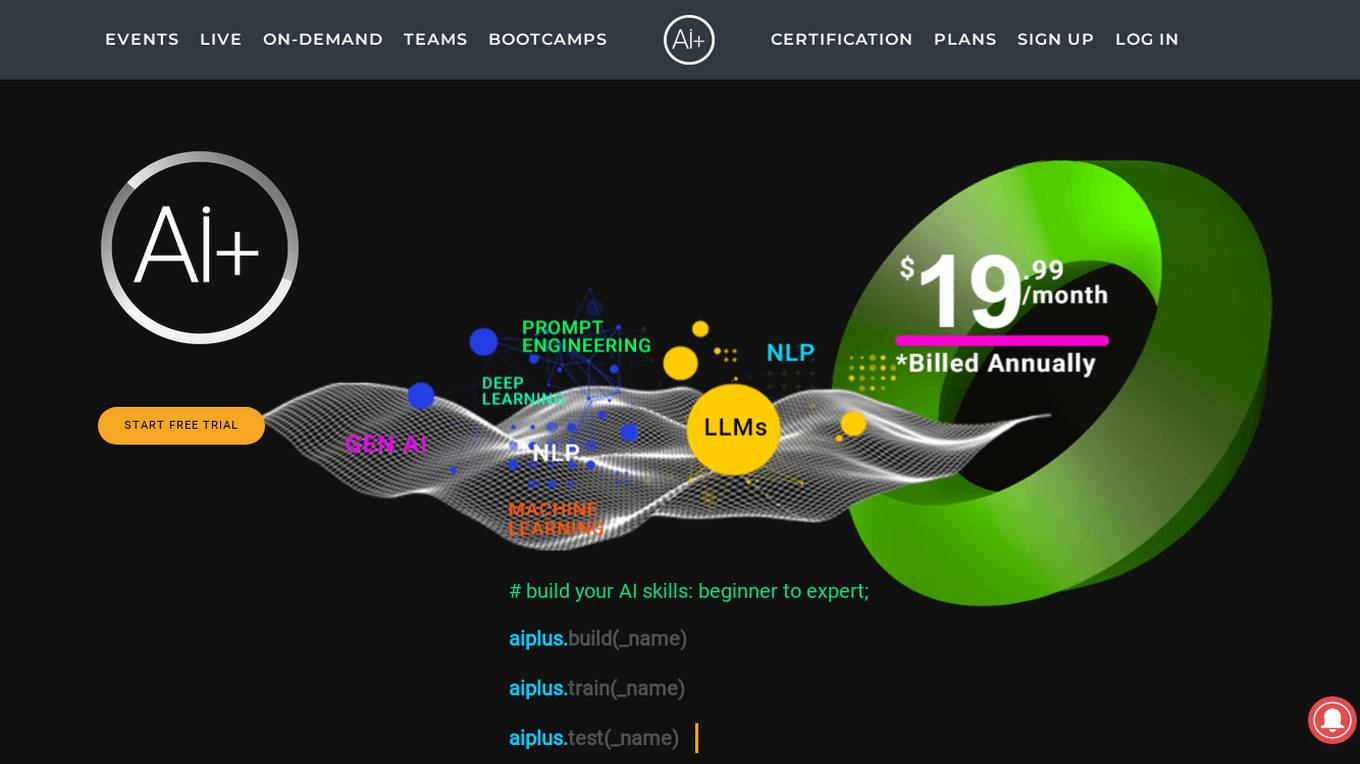
AI+ Training & Conferences
The website is a platform offering AI training and conferences for data science practitioners. It provides live and on-demand events, bootcamps, certifications, and courses covering various AI topics such as deep learning, machine learning, and generative AI. Users can access expert-led training sessions, workshops, and hands-on projects to enhance their AI skills and knowledge. The platform aims to unlock potential opportunities for learning, networking, and professional growth in the field of AI and data science.

EnterpriseAI
EnterpriseAI is an advanced computing platform that focuses on the intersection of high-performance computing (HPC) and artificial intelligence (AI). The platform provides in-depth coverage of the latest developments, trends, and innovations in the AI-enabled computing landscape. EnterpriseAI offers insights into various sectors such as financial services, government, healthcare, life sciences, energy, manufacturing, retail, and academia. The platform covers a wide range of topics including AI applications, security, data storage, networking, and edge/IoT technologies.

Big Vision
Big Vision provides consulting services in AI, computer vision, and deep learning. They help businesses build specific AI-driven solutions, create intelligent processes, and establish best practices to reduce human effort and enable faster decision-making. Their enterprise-grade solutions are currently serving millions of requests every month, especially in critical production environments.
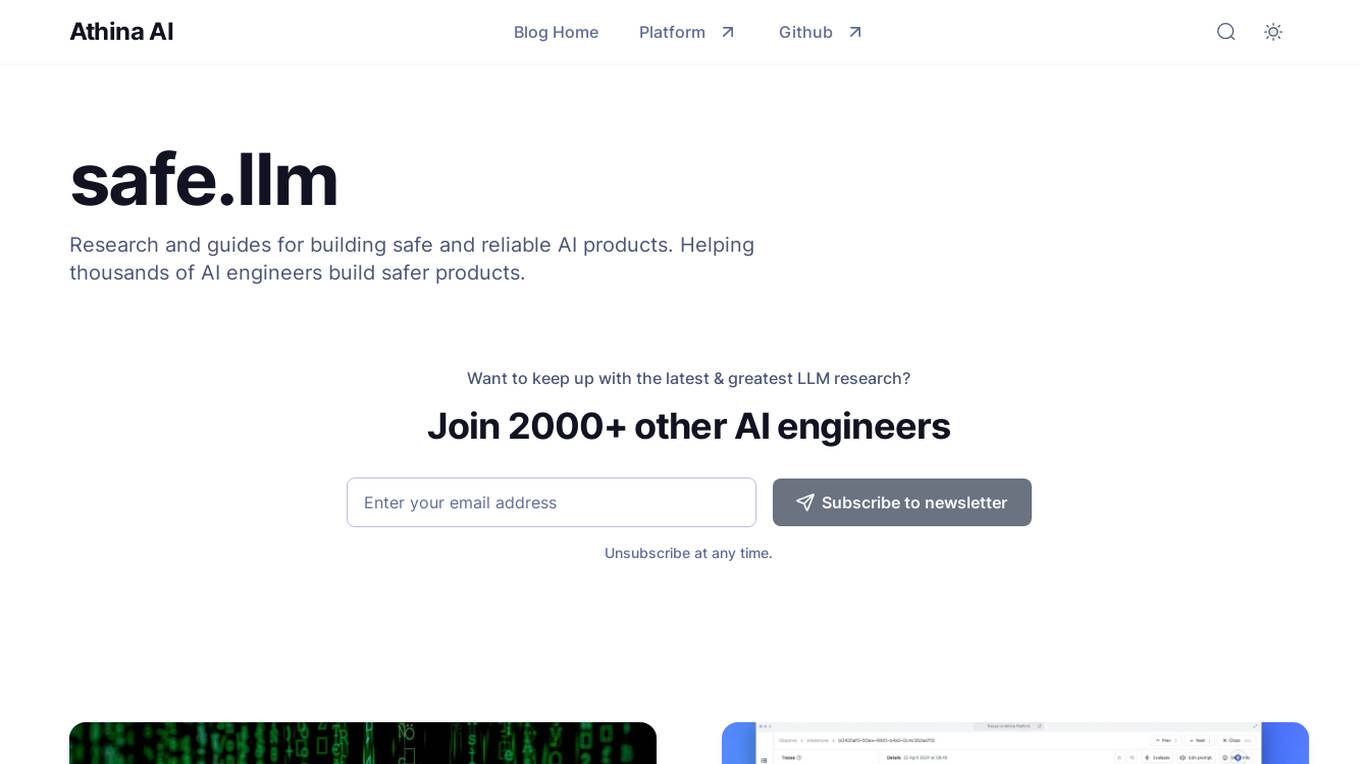
Athina AI
Athina AI is a platform that provides research and guides for building safe and reliable AI products. It helps thousands of AI engineers in building safer products by offering tutorials, research papers, and evaluation techniques related to large language models. The platform focuses on safety, prompt engineering, hallucinations, and evaluation of AI models.
33 - Open Source Tools

djl
Deep Java Library (DJL) is an open-source, high-level, engine-agnostic Java framework for deep learning. It is designed to be easy to get started with and simple to use for Java developers. DJL provides a native Java development experience and allows users to integrate machine learning and deep learning models with their Java applications. The framework is deep learning engine agnostic, enabling users to switch engines at any point for optimal performance. DJL's ergonomic API interface guides users with best practices to accomplish deep learning tasks, such as running inference and training neural networks.
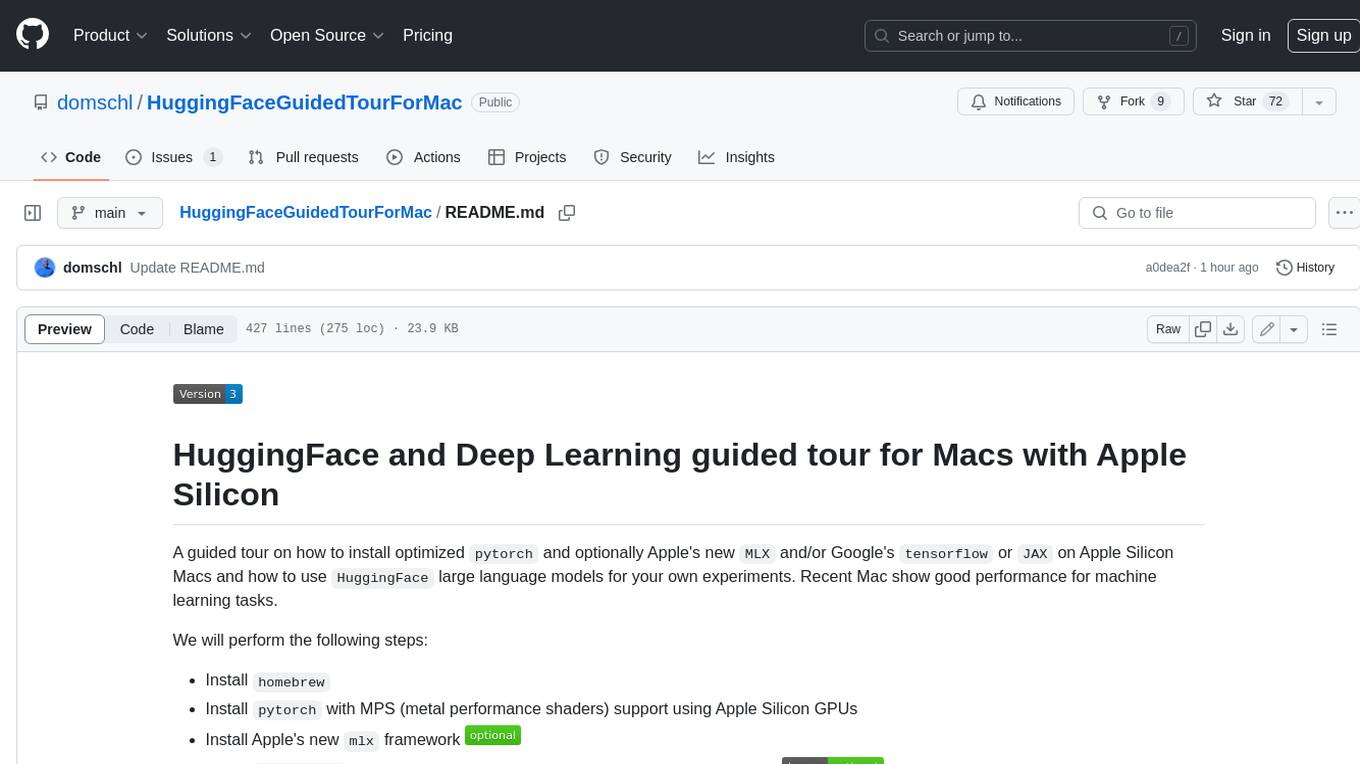
HuggingFaceGuidedTourForMac
HuggingFaceGuidedTourForMac is a guided tour on how to install optimized pytorch and optionally Apple's new MLX, JAX, and TensorFlow on Apple Silicon Macs. The repository provides steps to install homebrew, pytorch with MPS support, MLX, JAX, TensorFlow, and Jupyter lab. It also includes instructions on running large language models using HuggingFace transformers. The repository aims to help users set up their Macs for deep learning experiments with optimized performance.
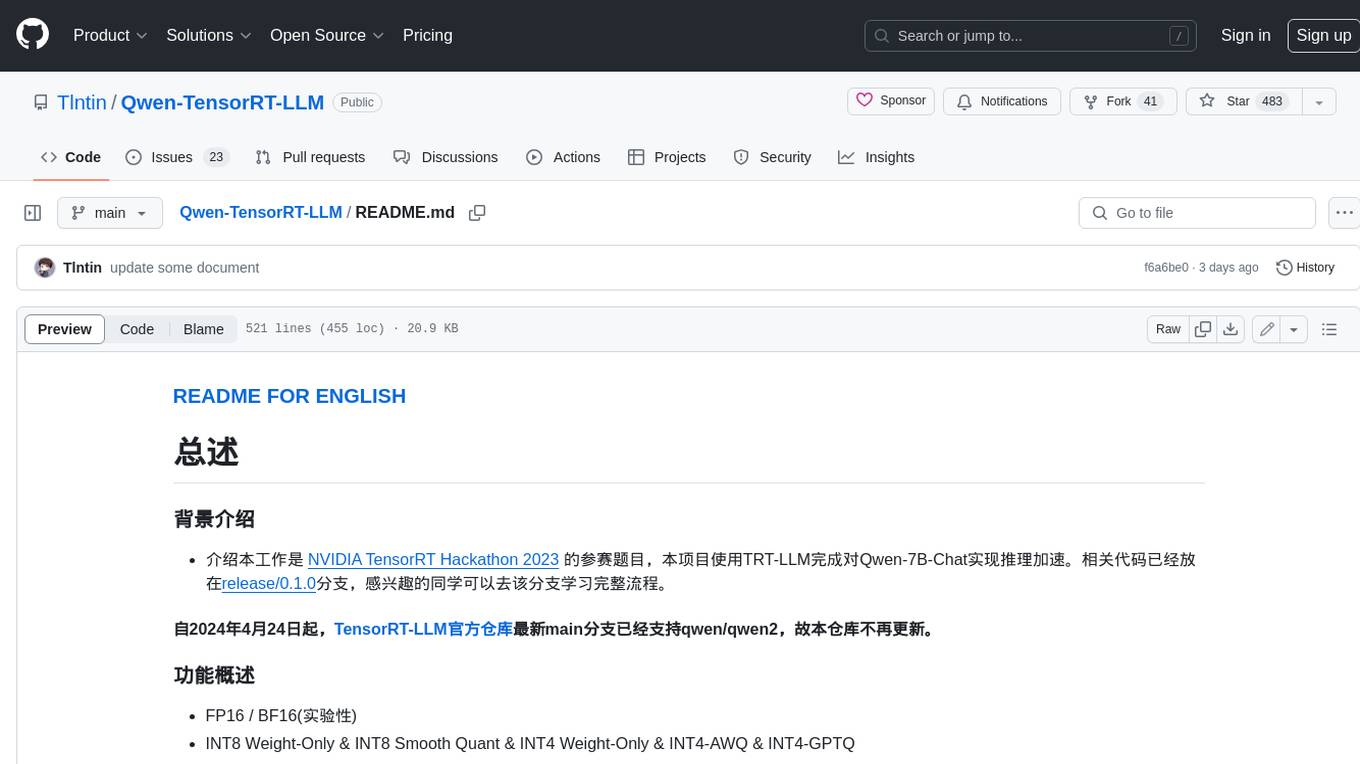
Qwen-TensorRT-LLM
Qwen-TensorRT-LLM is a project developed for the NVIDIA TensorRT Hackathon 2023, focusing on accelerating inference for the Qwen-7B-Chat model using TRT-LLM. The project offers various functionalities such as FP16/BF16 support, INT8 and INT4 quantization options, Tensor Parallel for multi-GPU parallelism, web demo setup with gradio, Triton API deployment for maximum throughput/concurrency, fastapi integration for openai requests, CLI interaction, and langchain support. It supports models like qwen2, qwen, and qwen-vl for both base and chat models. The project also provides tutorials on Bilibili and blogs for adapting Qwen models in NVIDIA TensorRT-LLM, along with hardware requirements and quick start guides for different model types and quantization methods.

only_train_once
Only Train Once (OTO) is an automatic, architecture-agnostic DNN training and compression framework that allows users to train a general DNN from scratch or a pretrained checkpoint to achieve high performance and slimmer architecture simultaneously in a one-shot manner without fine-tuning. The framework includes features for automatic structured pruning and erasing operators, as well as hybrid structured sparse optimizers for efficient model compression. OTO provides tools for pruning zero-invariant group partitioning, constructing pruned models, and visualizing pruning and erasing dependency graphs. It supports the HESSO optimizer and offers a sanity check for compliance testing on various DNNs. The repository also includes publications, installation instructions, quick start guides, and a roadmap for future enhancements and collaborations.
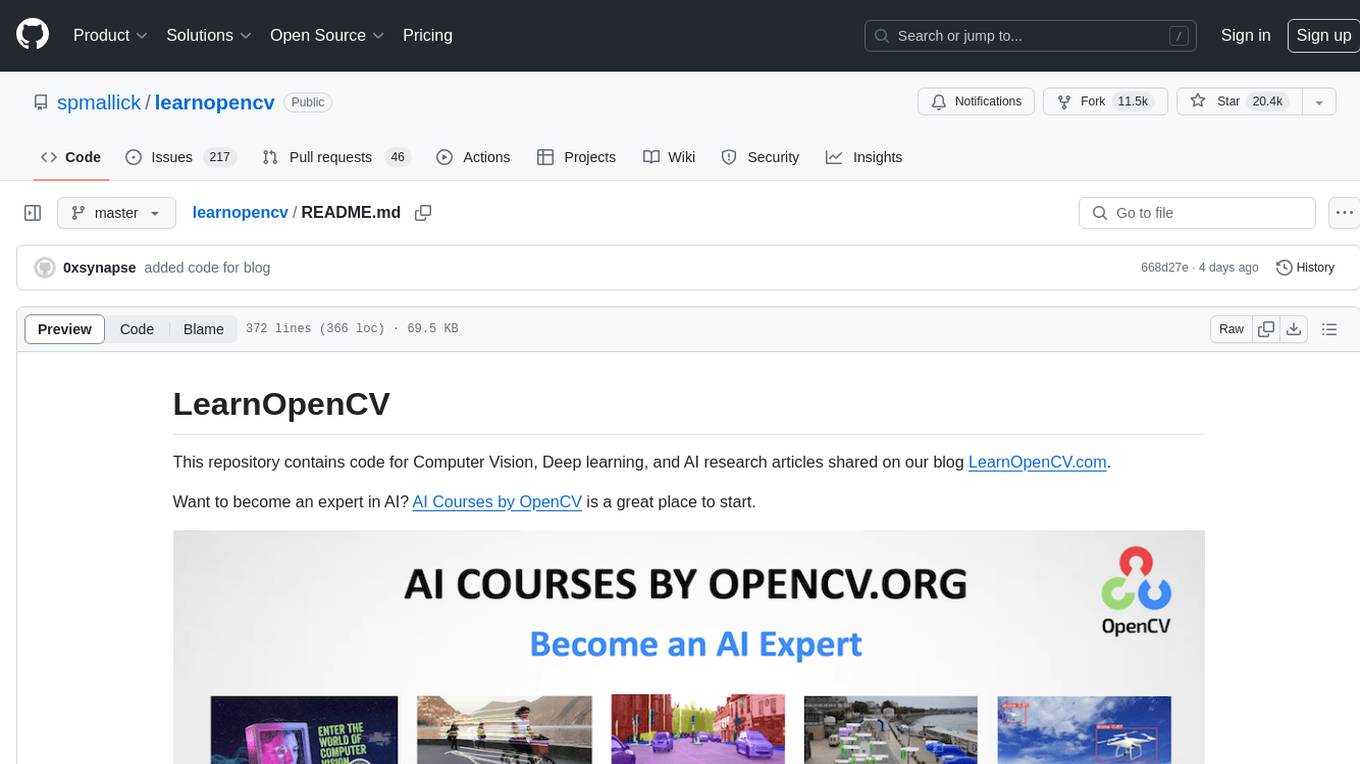
learnopencv
LearnOpenCV is a repository containing code for Computer Vision, Deep learning, and AI research articles shared on the blog LearnOpenCV.com. It serves as a resource for individuals looking to enhance their expertise in AI through various courses offered by OpenCV. The repository includes a wide range of topics such as image inpainting, instance segmentation, robotics, deep learning models, and more, providing practical implementations and code examples for readers to explore and learn from.
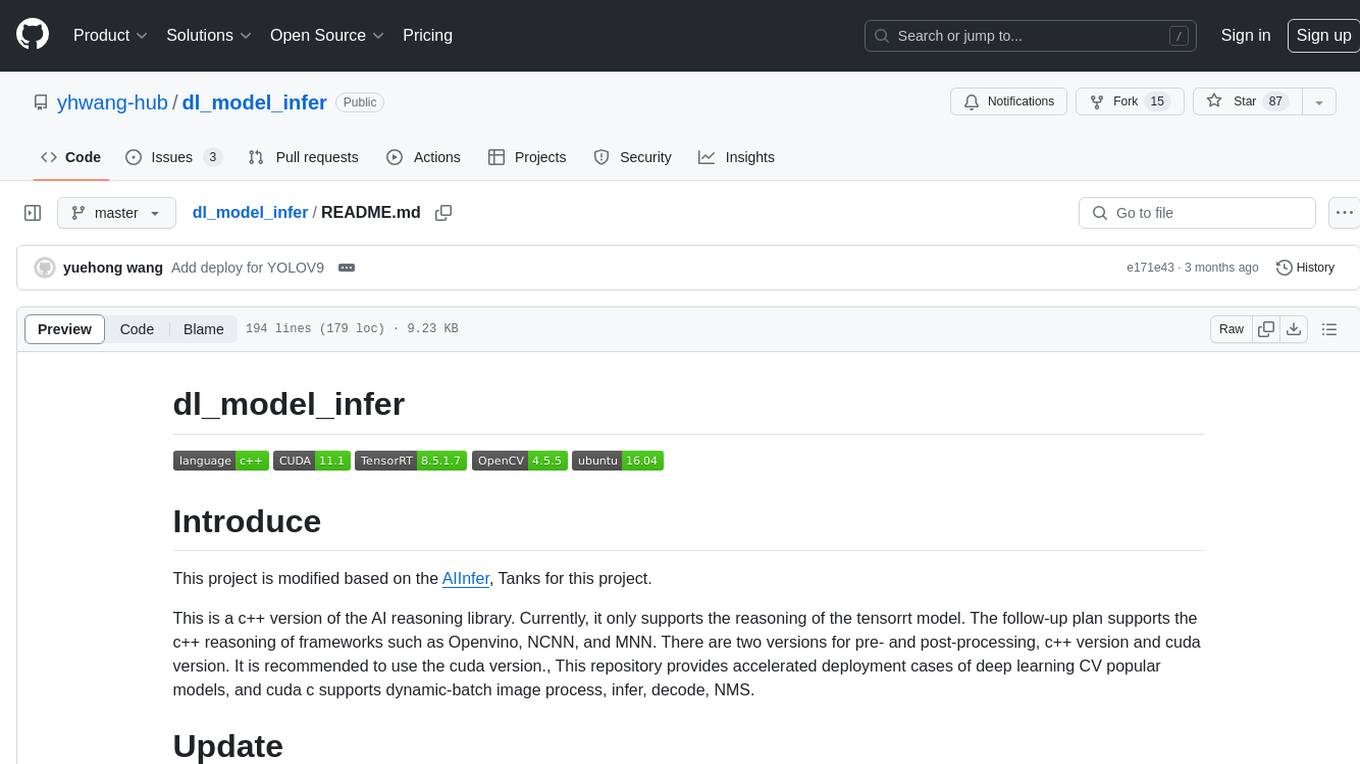
dl_model_infer
This project is a c++ version of the AI reasoning library that supports the reasoning of tensorrt models. It provides accelerated deployment cases of deep learning CV popular models and supports dynamic-batch image processing, inference, decode, and NMS. The project has been updated with various models and provides tutorials for model exports. It also includes a producer-consumer inference model for specific tasks. The project directory includes implementations for model inference applications, backend reasoning classes, post-processing, pre-processing, and target detection and tracking. Speed tests have been conducted on various models, and onnx downloads are available for different models.
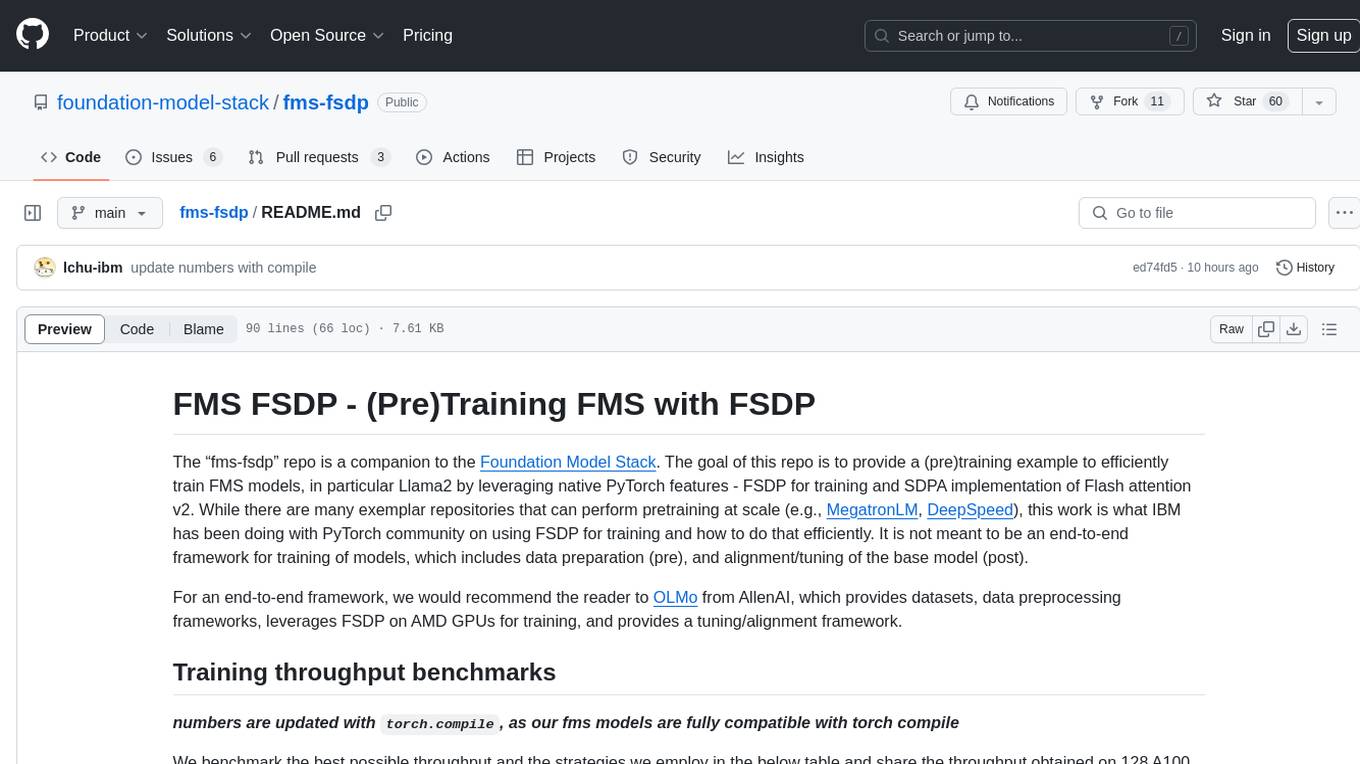
fms-fsdp
The 'fms-fsdp' repository is a companion to the Foundation Model Stack, providing a (pre)training example to efficiently train FMS models, specifically Llama2, using native PyTorch features like FSDP for training and SDPA implementation of Flash attention v2. It focuses on leveraging FSDP for training efficiently, not as an end-to-end framework. The repo benchmarks training throughput on different GPUs, shares strategies, and provides installation and training instructions. It trained a model on IBM curated data achieving high efficiency and performance metrics.
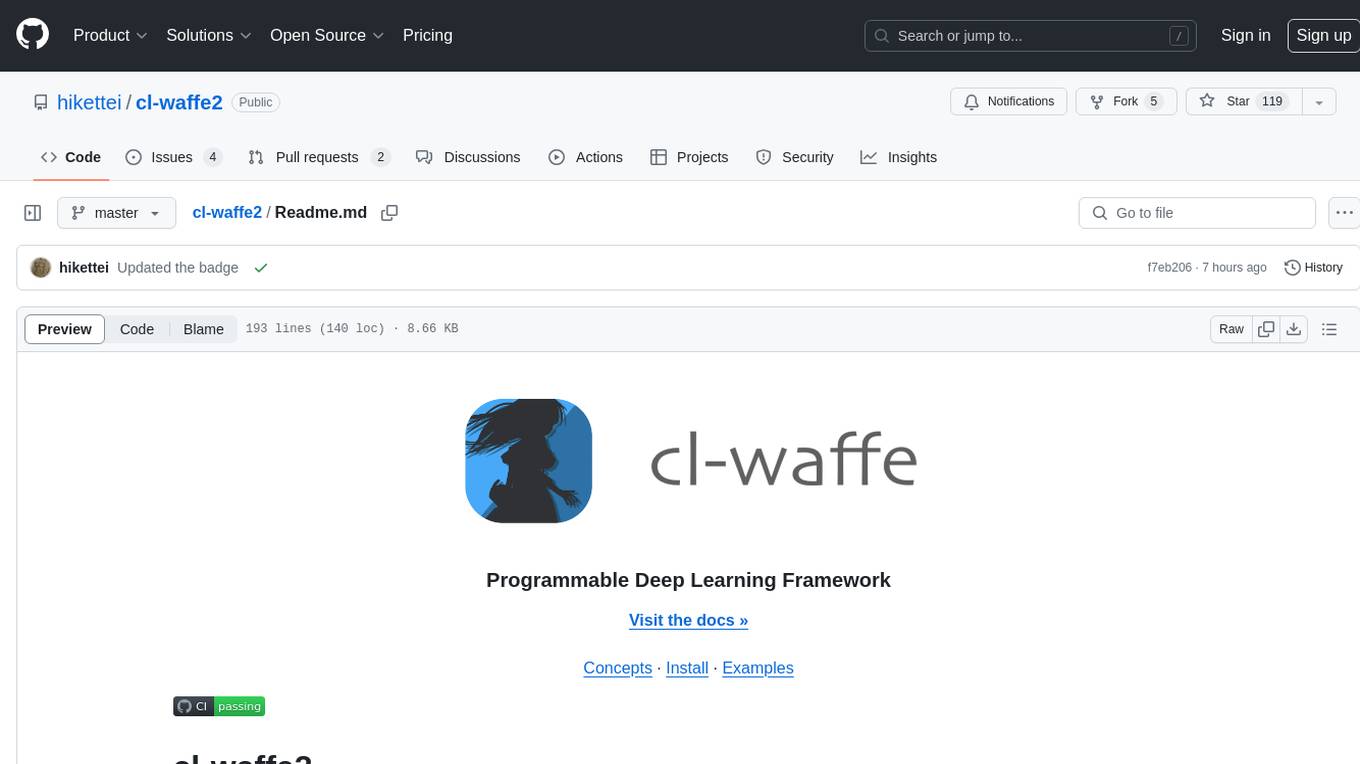
cl-waffe2
cl-waffe2 is an experimental deep learning framework in Common Lisp, providing fast, systematic, and customizable matrix operations, reverse mode tape-based Automatic Differentiation, and neural network model building and training features accelerated by a JIT Compiler. It offers abstraction layers, extensibility, inlining, graph-level optimization, visualization, debugging, systematic nodes, and symbolic differentiation. Users can easily write extensions and optimize their networks without overheads. The framework is designed to eliminate barriers between users and developers, allowing for easy customization and extension.
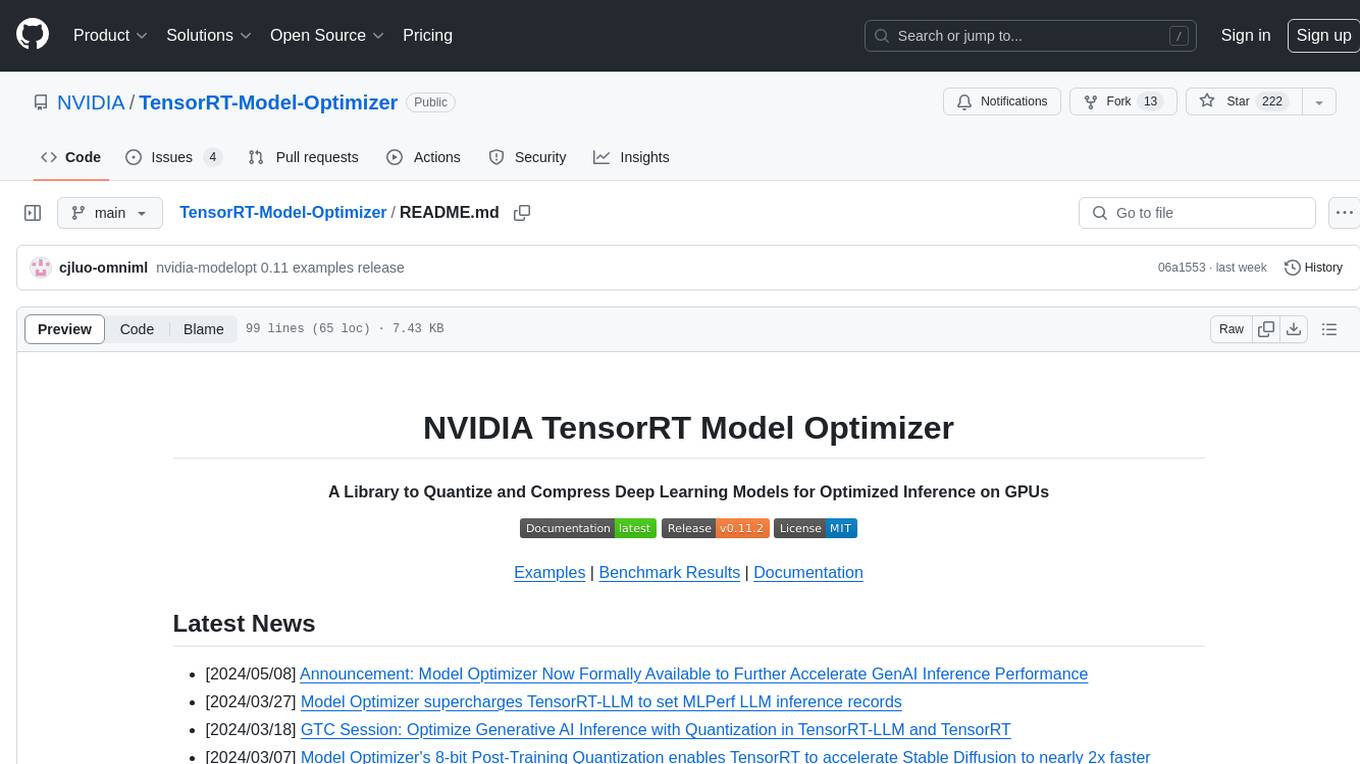
TensorRT-Model-Optimizer
The NVIDIA TensorRT Model Optimizer is a library designed to quantize and compress deep learning models for optimized inference on GPUs. It offers state-of-the-art model optimization techniques including quantization and sparsity to reduce inference costs for generative AI models. Users can easily stack different optimization techniques to produce quantized checkpoints from torch or ONNX models. The quantized checkpoints are ready for deployment in inference frameworks like TensorRT-LLM or TensorRT, with planned integrations for NVIDIA NeMo and Megatron-LM. The tool also supports 8-bit quantization with Stable Diffusion for enterprise users on NVIDIA NIM. Model Optimizer is available for free on NVIDIA PyPI, and this repository serves as a platform for sharing examples, GPU-optimized recipes, and collecting community feedback.
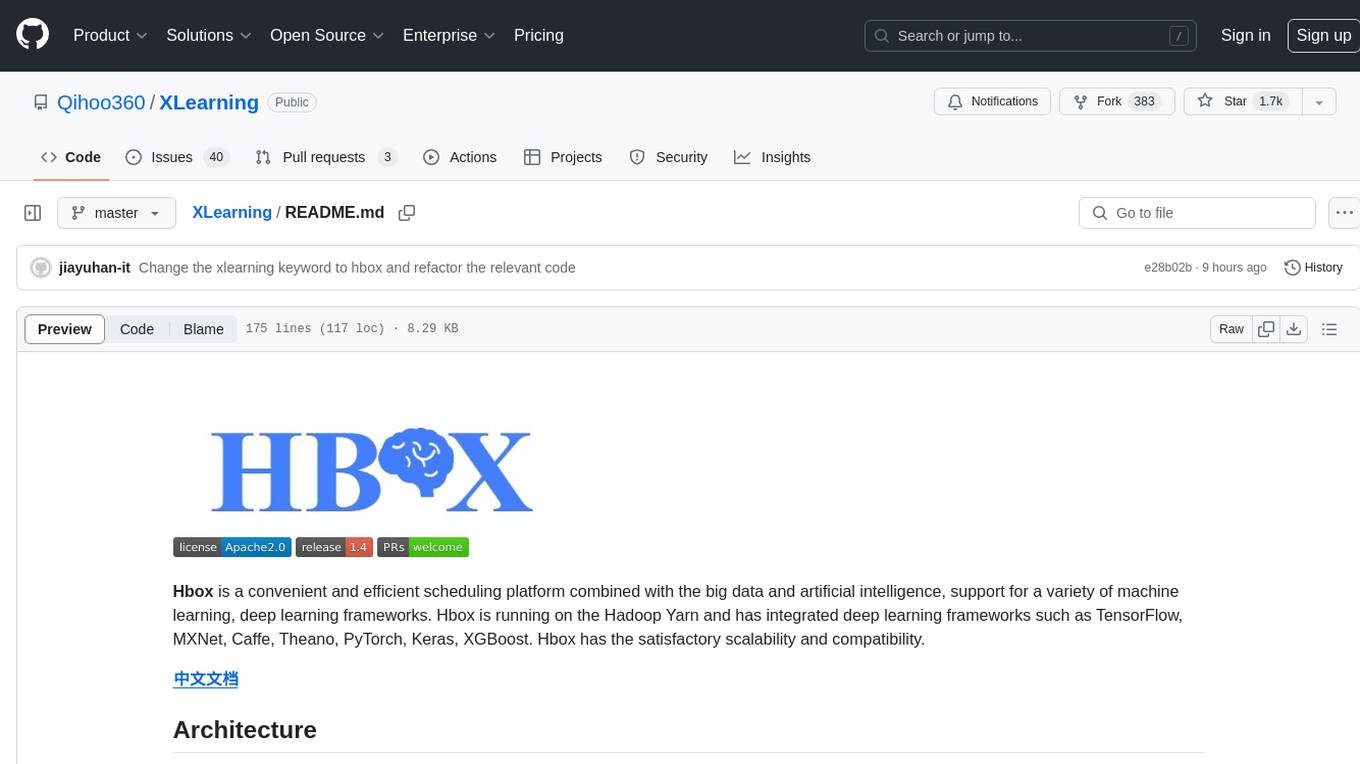
XLearning
XLearning is a scheduling platform for big data and artificial intelligence, supporting various machine learning and deep learning frameworks. It runs on Hadoop Yarn and integrates frameworks like TensorFlow, MXNet, Caffe, Theano, PyTorch, Keras, XGBoost. XLearning offers scalability, compatibility, multiple deep learning framework support, unified data management based on HDFS, visualization display, and compatibility with code at native frameworks. It provides functions for data input/output strategies, container management, TensorBoard service, and resource usage metrics display. XLearning requires JDK >= 1.7 and Maven >= 3.3 for compilation, and deployment on CentOS 7.2 with Java >= 1.7 and Hadoop 2.6, 2.7, 2.8.
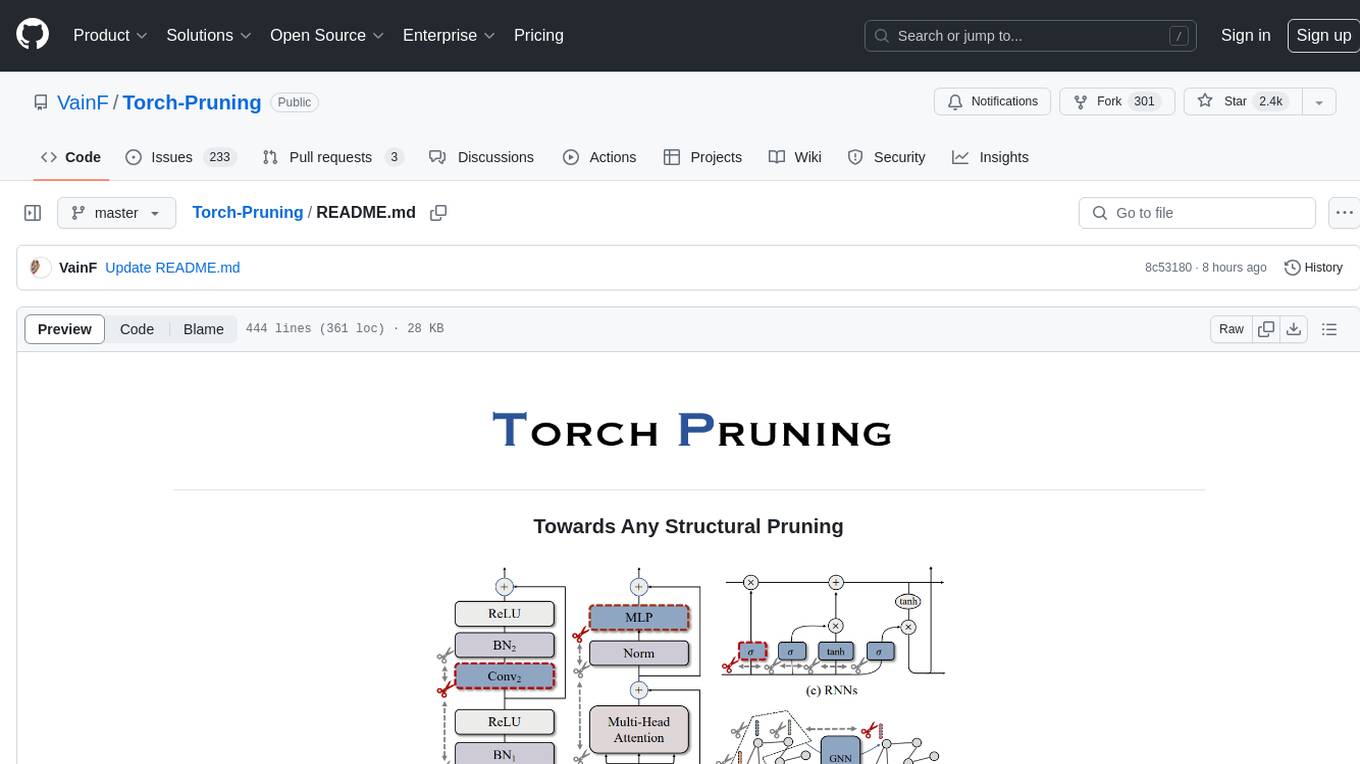
Torch-Pruning
Torch-Pruning (TP) is a library for structural pruning that enables pruning for a wide range of deep neural networks. It uses an algorithm called DepGraph to physically remove parameters. The library supports pruning off-the-shelf models from various frameworks and provides benchmarks for reproducing results. It offers high-level pruners, dependency graph for automatic pruning, low-level pruning functions, and supports various importance criteria and modules. Torch-Pruning is compatible with both PyTorch 1.x and 2.x versions.
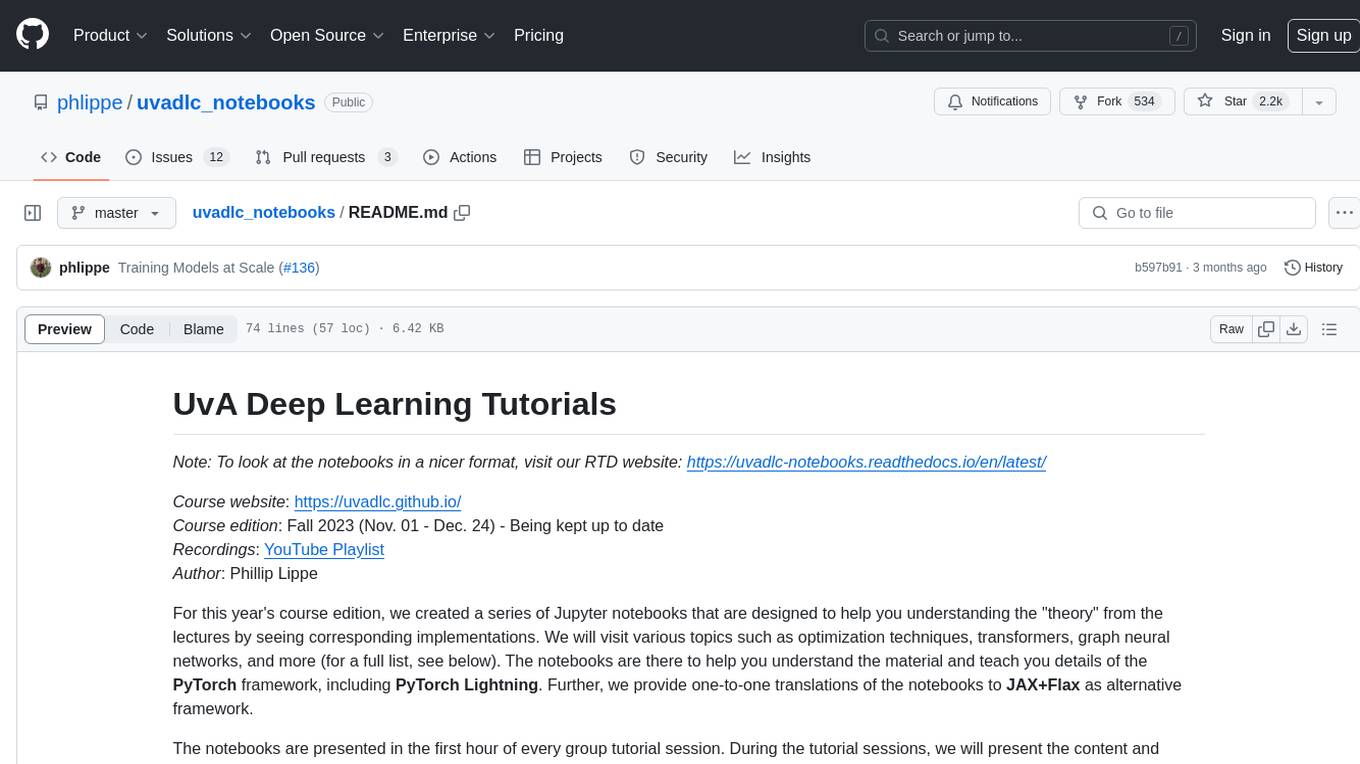
uvadlc_notebooks
The UvA Deep Learning Tutorials repository contains a series of Jupyter notebooks designed to help understand theoretical concepts from lectures by providing corresponding implementations. The notebooks cover topics such as optimization techniques, transformers, graph neural networks, and more. They aim to teach details of the PyTorch framework, including PyTorch Lightning, with alternative translations to JAX+Flax. The tutorials are integrated as official tutorials of PyTorch Lightning and are relevant for graded assignments and exams.
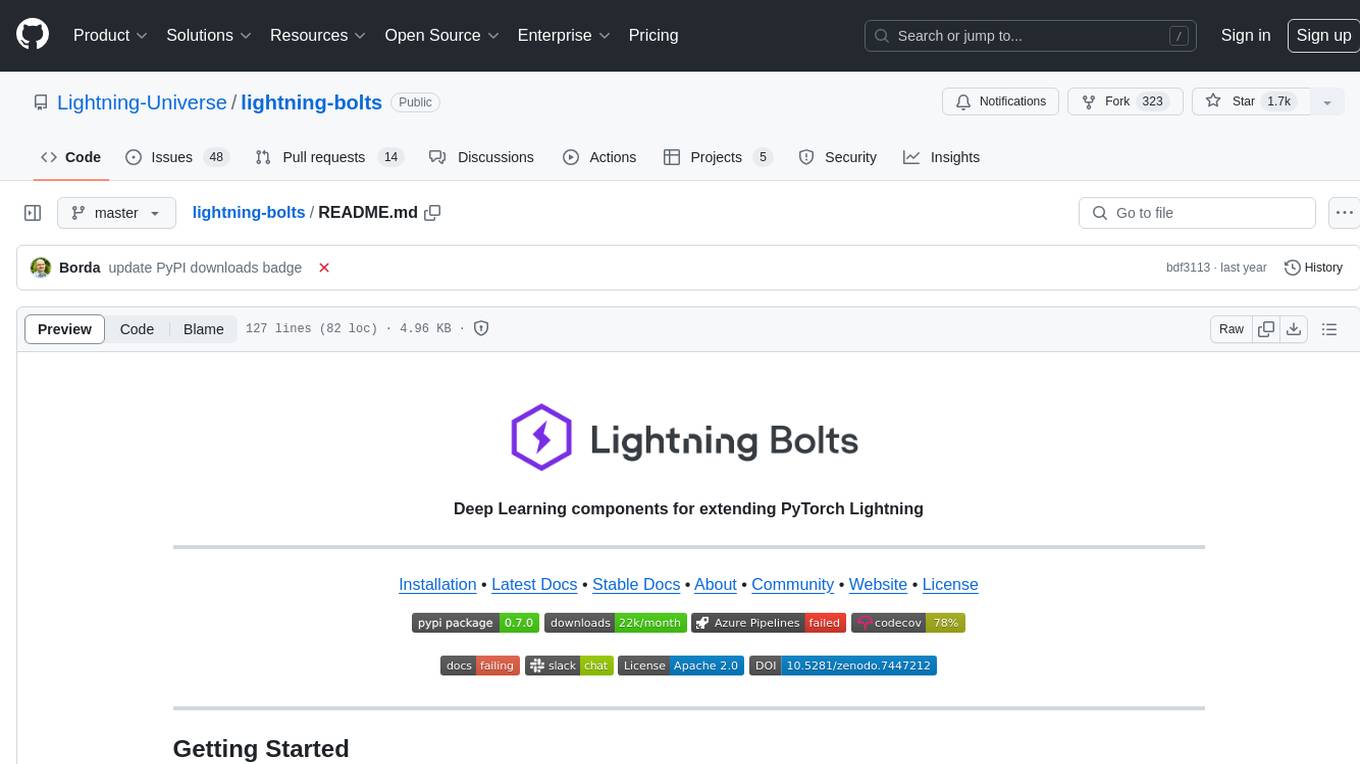
lightning-bolts
Bolts package provides a variety of components to extend PyTorch Lightning, such as callbacks & datasets, for applied research and production. Users can accelerate Lightning training with the Torch ORT Callback to optimize ONNX graph for faster training & inference. Additionally, users can introduce sparsity with the SparseMLCallback to accelerate inference by leveraging the DeepSparse engine. Specific research implementations are encouraged, with contributions that help train SSL models and integrate with Lightning Flash for state-of-the-art models in applied research.
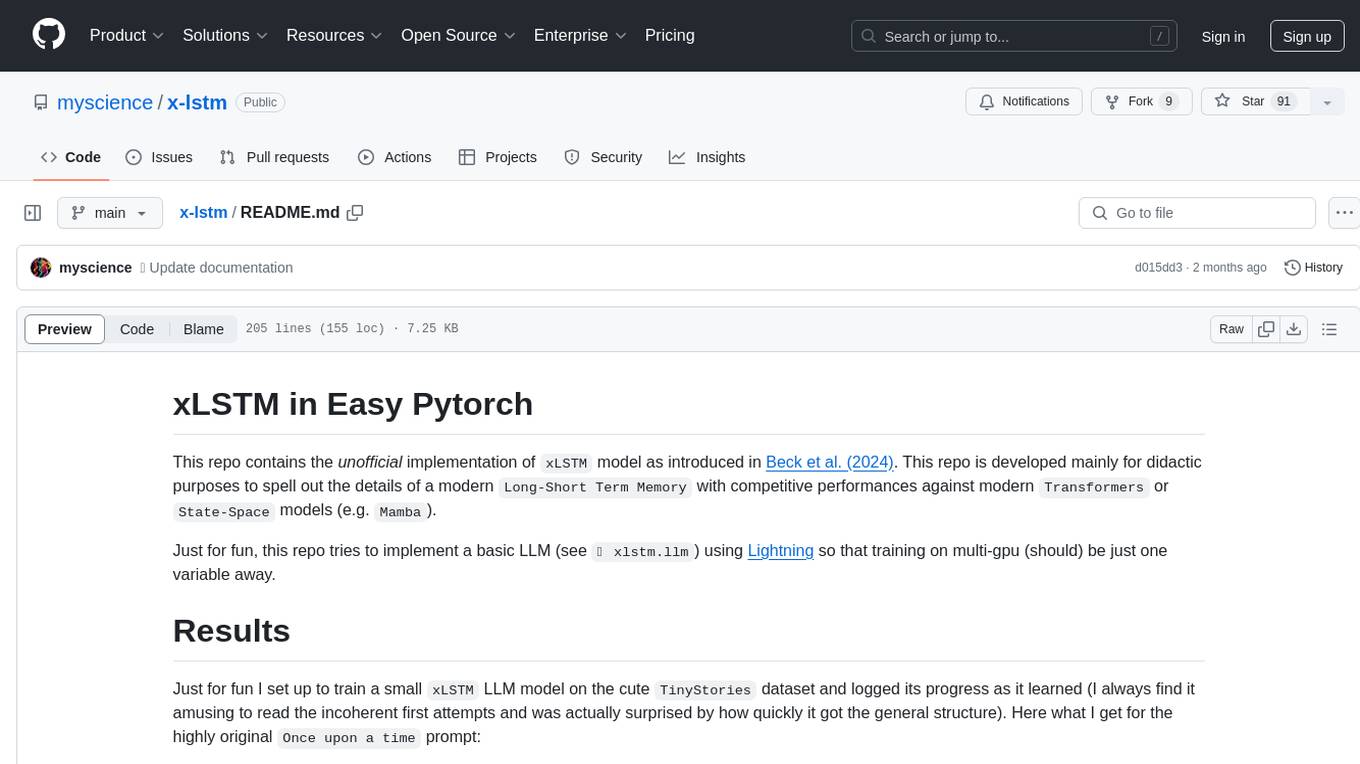
x-lstm
This repository contains an unofficial implementation of the xLSTM model introduced in Beck et al. (2024). It serves as a didactic tool to explain the details of a modern Long-Short Term Memory model with competitive performance against Transformers or State-Space models. The repository also includes a Lightning-based implementation of a basic LLM for multi-GPU training. It provides modules for scalar-LSTM and matrix-LSTM, as well as an xLSTM LLM built using Pytorch Lightning for easy training on multi-GPUs.
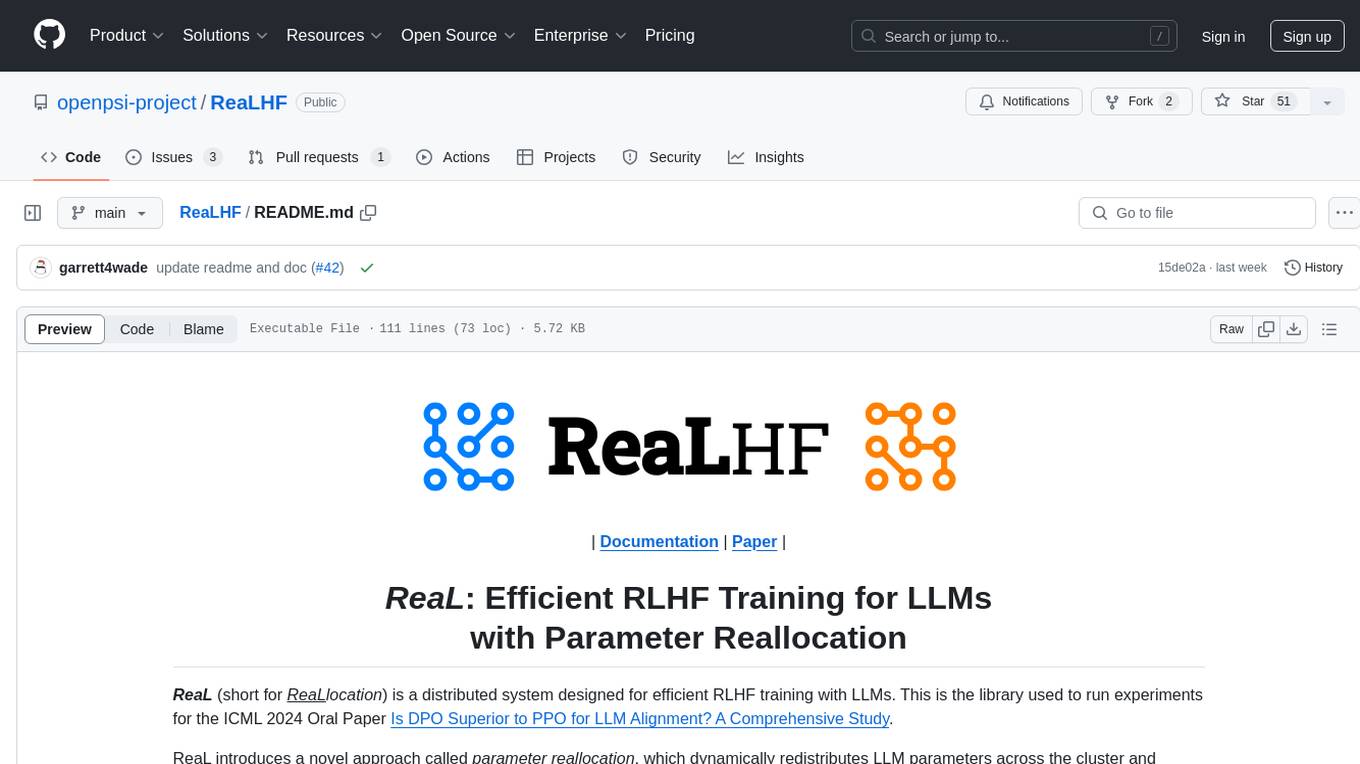
ReaLHF
ReaLHF is a distributed system designed for efficient RLHF training with Large Language Models (LLMs). It introduces a novel approach called parameter reallocation to dynamically redistribute LLM parameters across the cluster, optimizing allocations and parallelism for each computation workload. ReaL minimizes redundant communication while maximizing GPU utilization, achieving significantly higher Proximal Policy Optimization (PPO) training throughput compared to other systems. It supports large-scale training with various parallelism strategies and enables memory-efficient training with parameter and optimizer offloading. The system seamlessly integrates with HuggingFace checkpoints and inference frameworks, allowing for easy launching of local or distributed experiments. ReaLHF offers flexibility through versatile configuration customization and supports various RLHF algorithms, including DPO, PPO, RAFT, and more, while allowing the addition of custom algorithms for high efficiency.
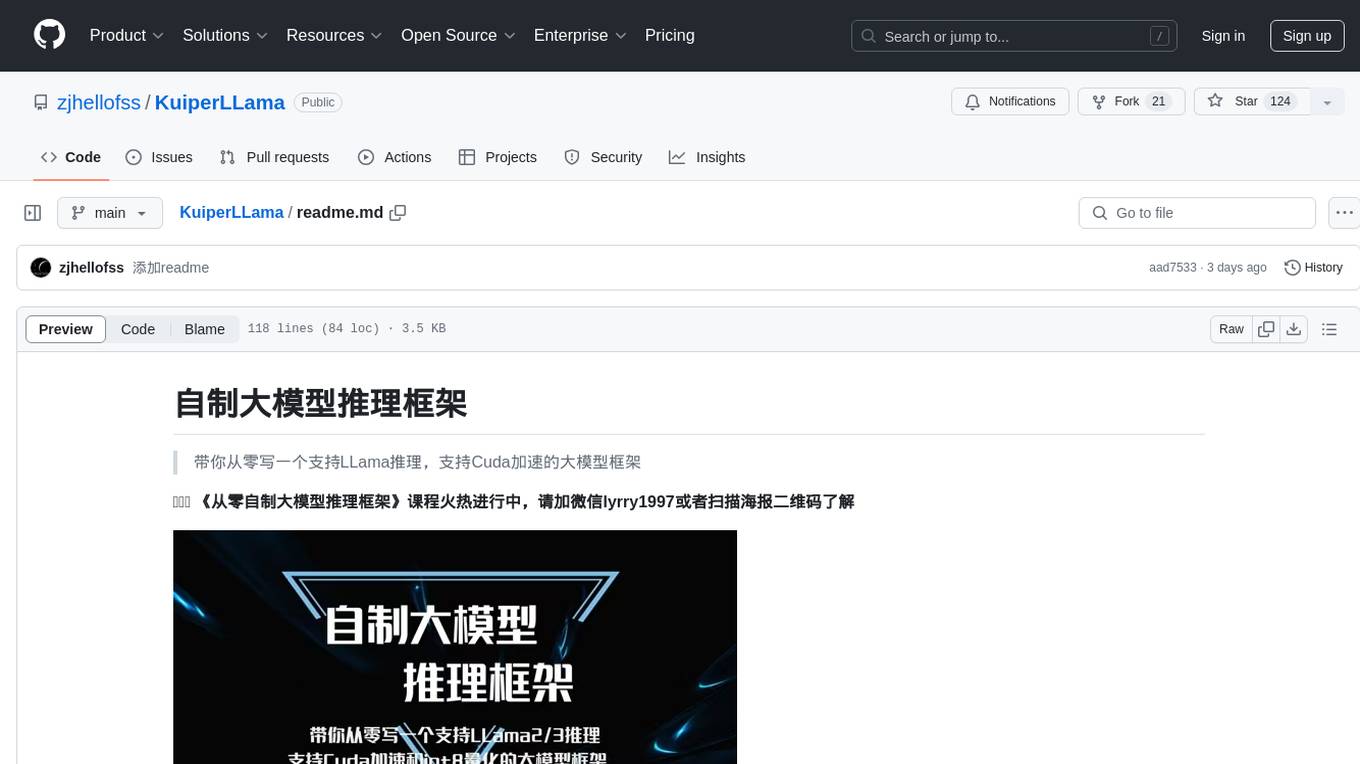
KuiperLLama
KuiperLLama is a custom large model inference framework that guides users in building a LLama-supported inference framework with Cuda acceleration from scratch. The framework includes modules for architecture design, LLama2 model support, model quantization, Cuda basics, operator implementation, and fun tasks like text generation and storytelling. It also covers learning other commercial inference frameworks for comprehensive understanding. The project provides detailed tutorials and resources for developing and optimizing large models for efficient inference.
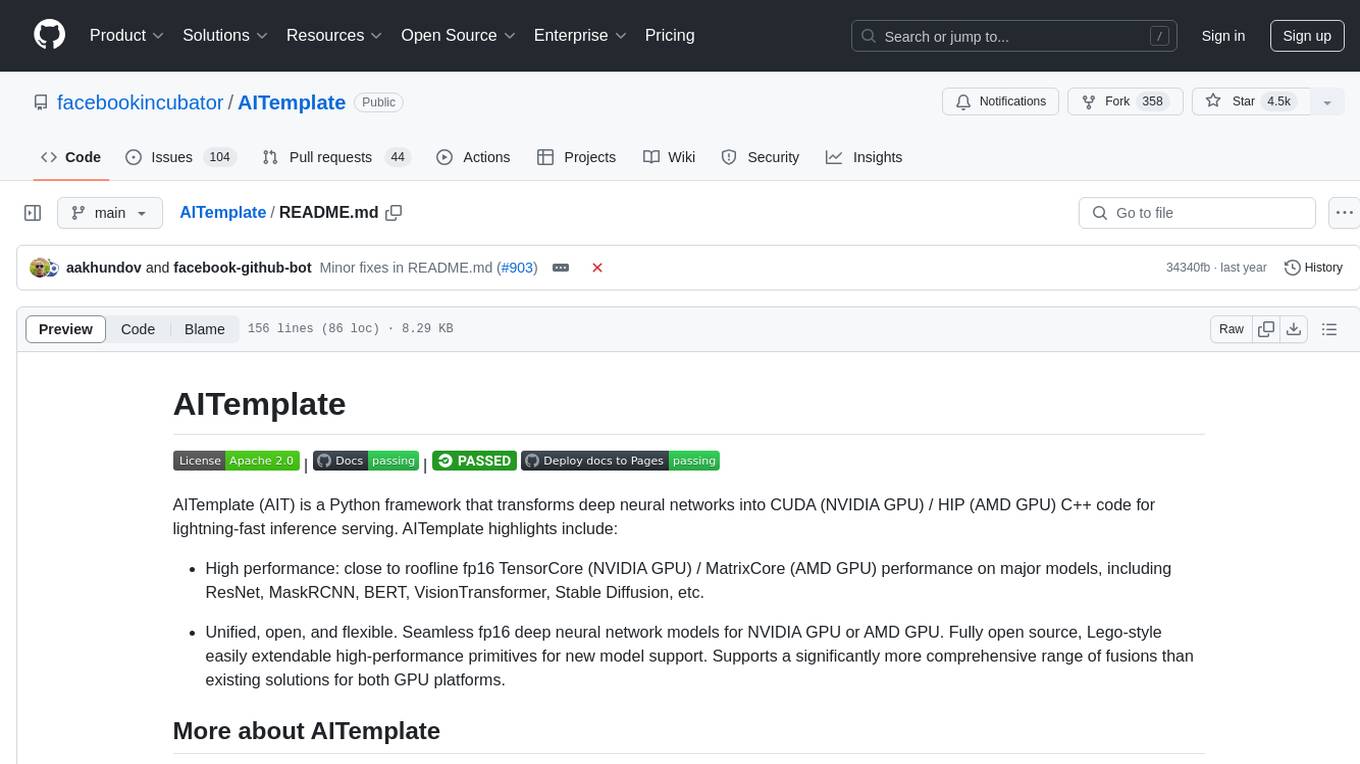
AITemplate
AITemplate (AIT) is a Python framework that transforms deep neural networks into CUDA (NVIDIA GPU) / HIP (AMD GPU) C++ code for lightning-fast inference serving. It offers high performance close to roofline fp16 TensorCore (NVIDIA GPU) / MatrixCore (AMD GPU) performance on major models. AITemplate is unified, open, and flexible, supporting a comprehensive range of fusions for both GPU platforms. It provides excellent backward capability, horizontal fusion, vertical fusion, memory fusion, and works with or without PyTorch. FX2AIT is a tool that converts PyTorch models into AIT for fast inference serving, offering easy conversion and expanded support for models with unsupported operators.
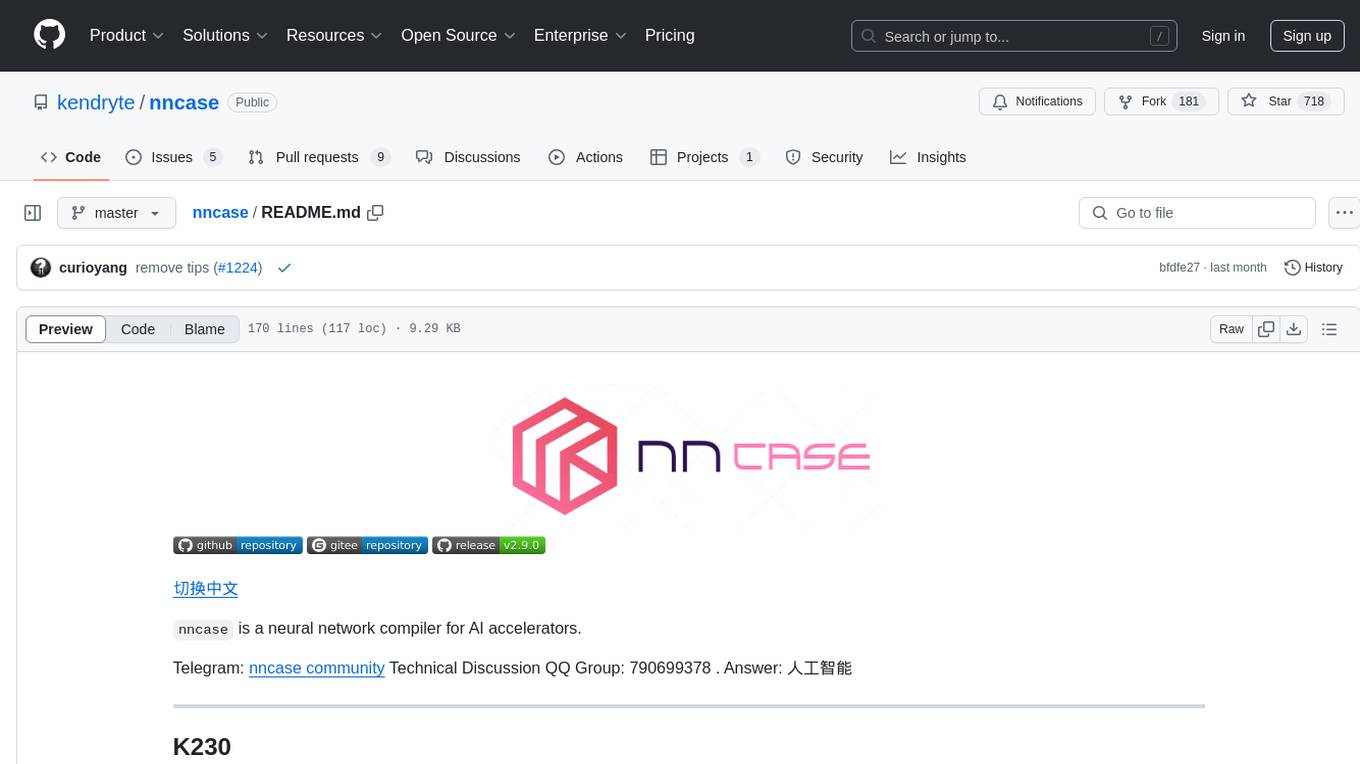
nncase
nncase is a neural network compiler for AI accelerators that supports multiple inputs and outputs, static memory allocation, operators fusion and optimizations, float and quantized uint8 inference, post quantization from float model with calibration dataset, and flat model with zero copy loading. It can be installed via pip and supports TFLite, Caffe, and ONNX ops. Users can compile nncase from source using Ninja or make. The tool is suitable for tasks like image classification, object detection, image segmentation, pose estimation, and more.
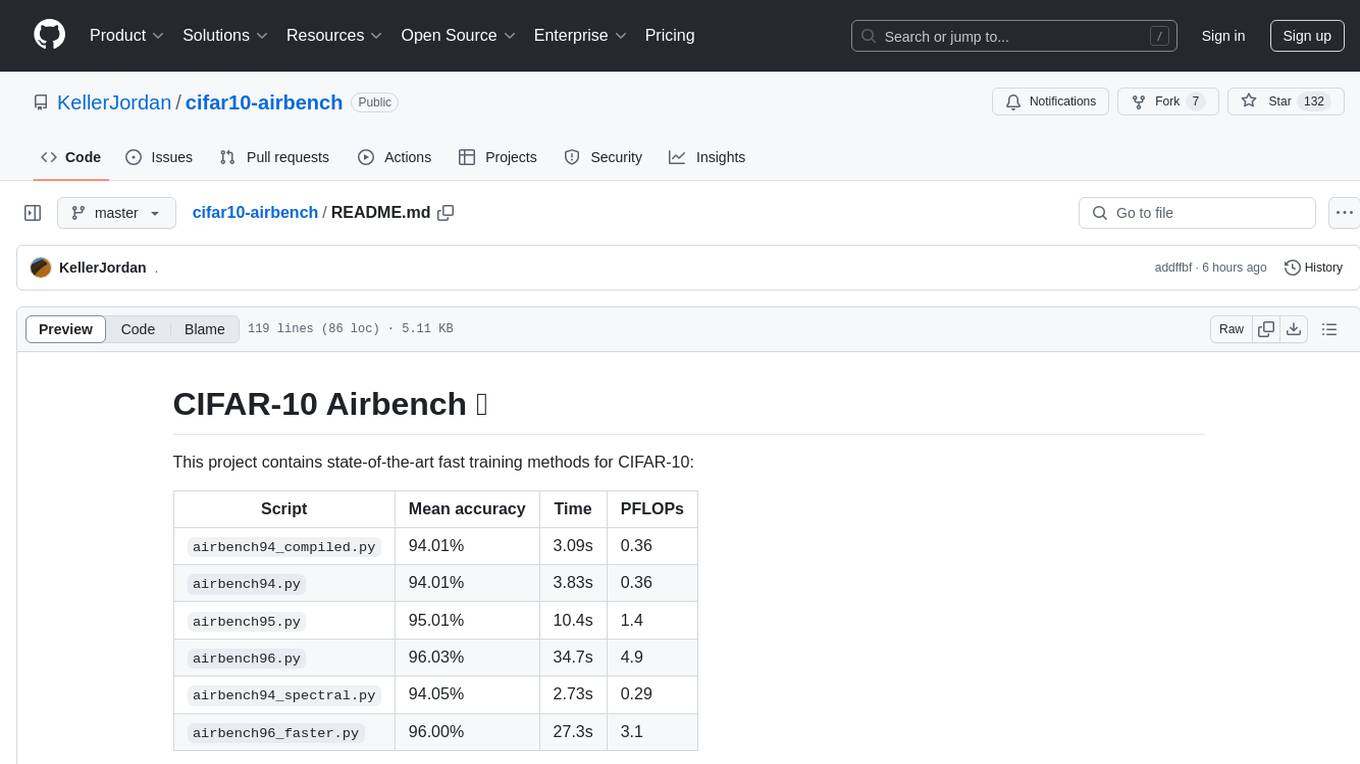
cifar10-airbench
CIFAR-10 Airbench is a project offering fast and stable training baselines for CIFAR-10 dataset, facilitating machine learning research. It provides easily runnable PyTorch scripts for training neural networks with high accuracy levels. The methods used in this project aim to accelerate research on fundamental properties of deep learning. The project includes GPU-accelerated dataloader for custom experiments and trainings, and can be used for data selection and active learning experiments. The training methods provided are faster than standard ResNet training, offering improved performance for research projects.
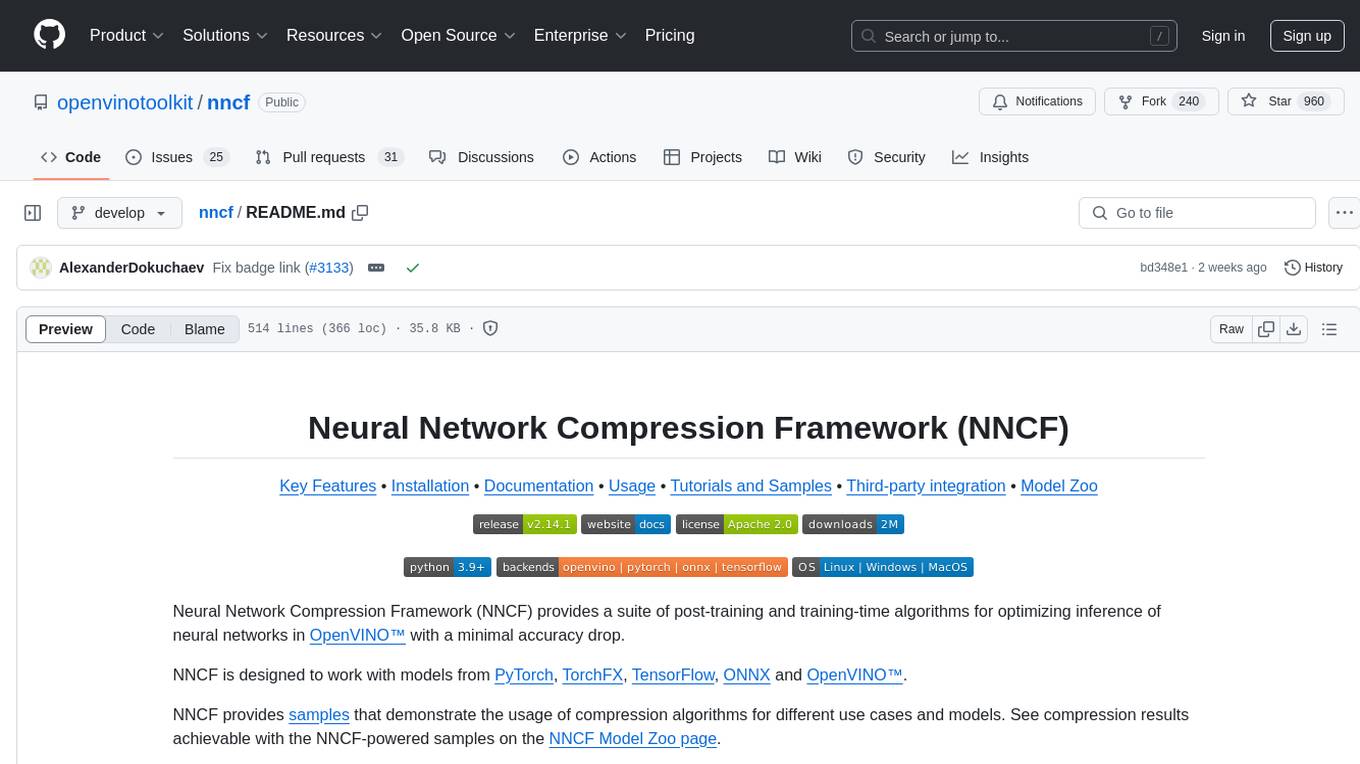
nncf
Neural Network Compression Framework (NNCF) provides a suite of post-training and training-time algorithms for optimizing inference of neural networks in OpenVINO™ with a minimal accuracy drop. It is designed to work with models from PyTorch, TorchFX, TensorFlow, ONNX, and OpenVINO™. NNCF offers samples demonstrating compression algorithms for various use cases and models, with the ability to add different compression algorithms easily. It supports GPU-accelerated layers, distributed training, and seamless combination of pruning, sparsity, and quantization algorithms. NNCF allows exporting compressed models to ONNX or TensorFlow formats for use with OpenVINO™ toolkit, and supports Accuracy-Aware model training pipelines via Adaptive Compression Level Training and Early Exit Training.
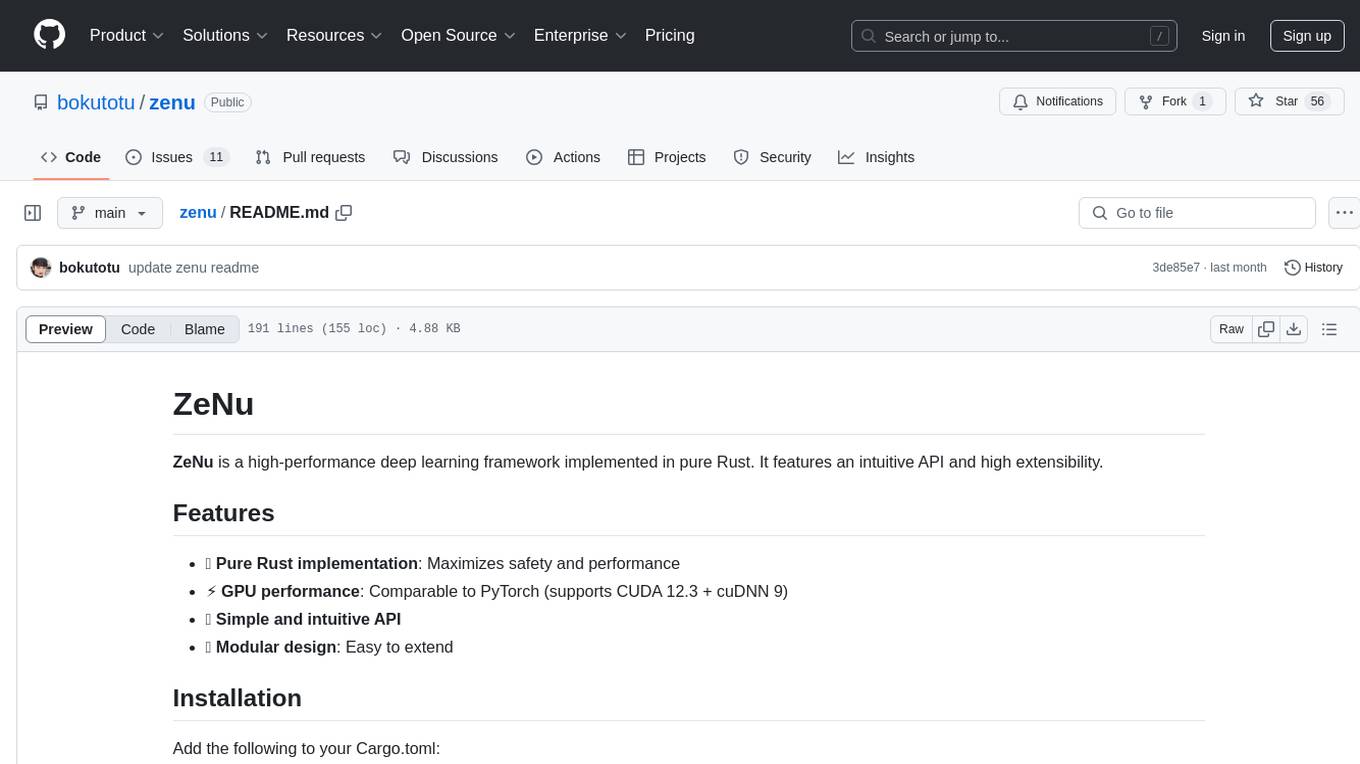
zenu
ZeNu is a high-performance deep learning framework implemented in pure Rust, featuring a pure Rust implementation for safety and performance, GPU performance comparable to PyTorch with CUDA support, a simple and intuitive API, and a modular design for easy extension. It supports various layers like Linear, Convolution 2D, LSTM, and optimizers such as SGD and Adam. ZeNu also provides device support for CPU and CUDA (NVIDIA GPU) with CUDA 12.3 and cuDNN 9. The project structure includes main library, automatic differentiation engine, neural network layers, matrix operations, optimization algorithms, CUDA implementation, and other support crates. Users can find detailed implementations like MNIST classification, CIFAR10 classification, and ResNet implementation in the examples directory. Contributions to ZeNu are welcome under the MIT License.
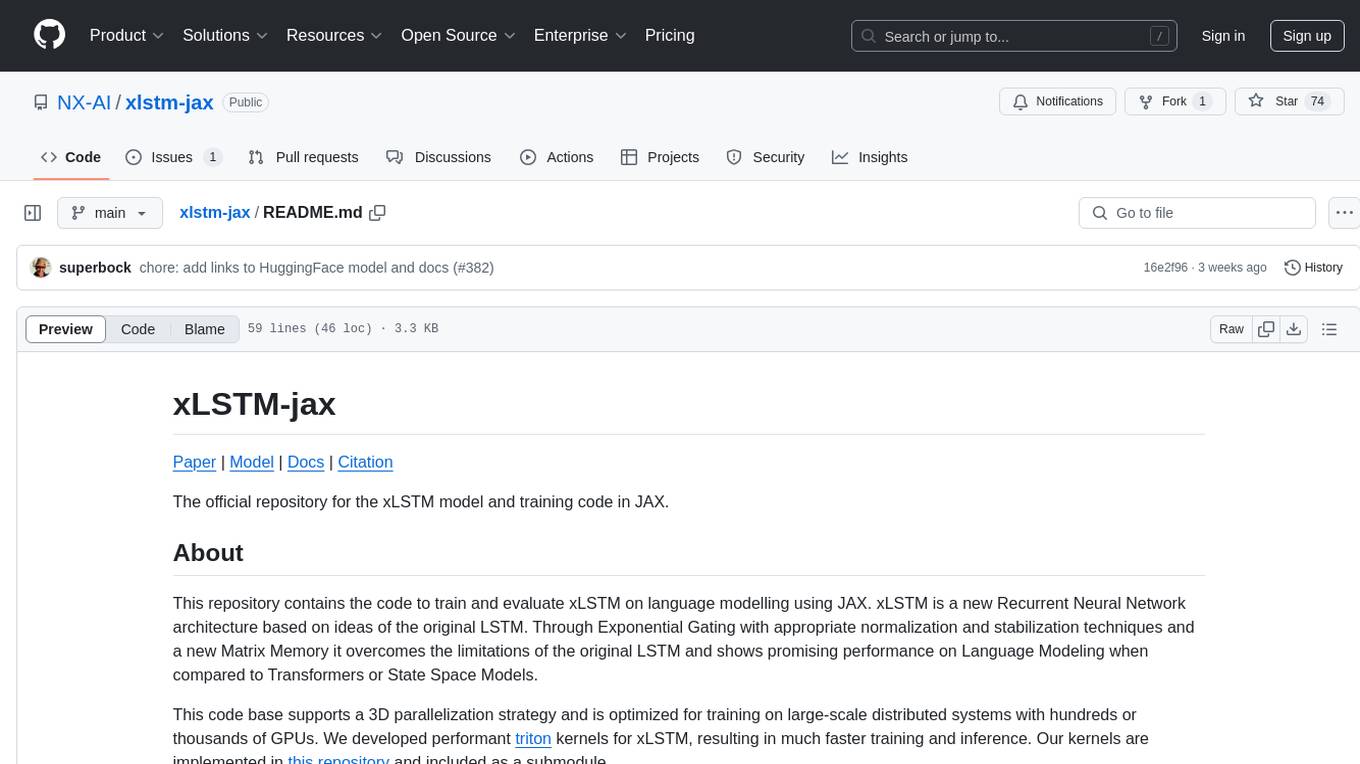
xlstm-jax
The xLSTM-jax repository contains code for training and evaluating the xLSTM model on language modeling using JAX. xLSTM is a Recurrent Neural Network architecture that improves upon the original LSTM through Exponential Gating, normalization, stabilization techniques, and a Matrix Memory. It is optimized for large-scale distributed systems with performant triton kernels for faster training and inference.
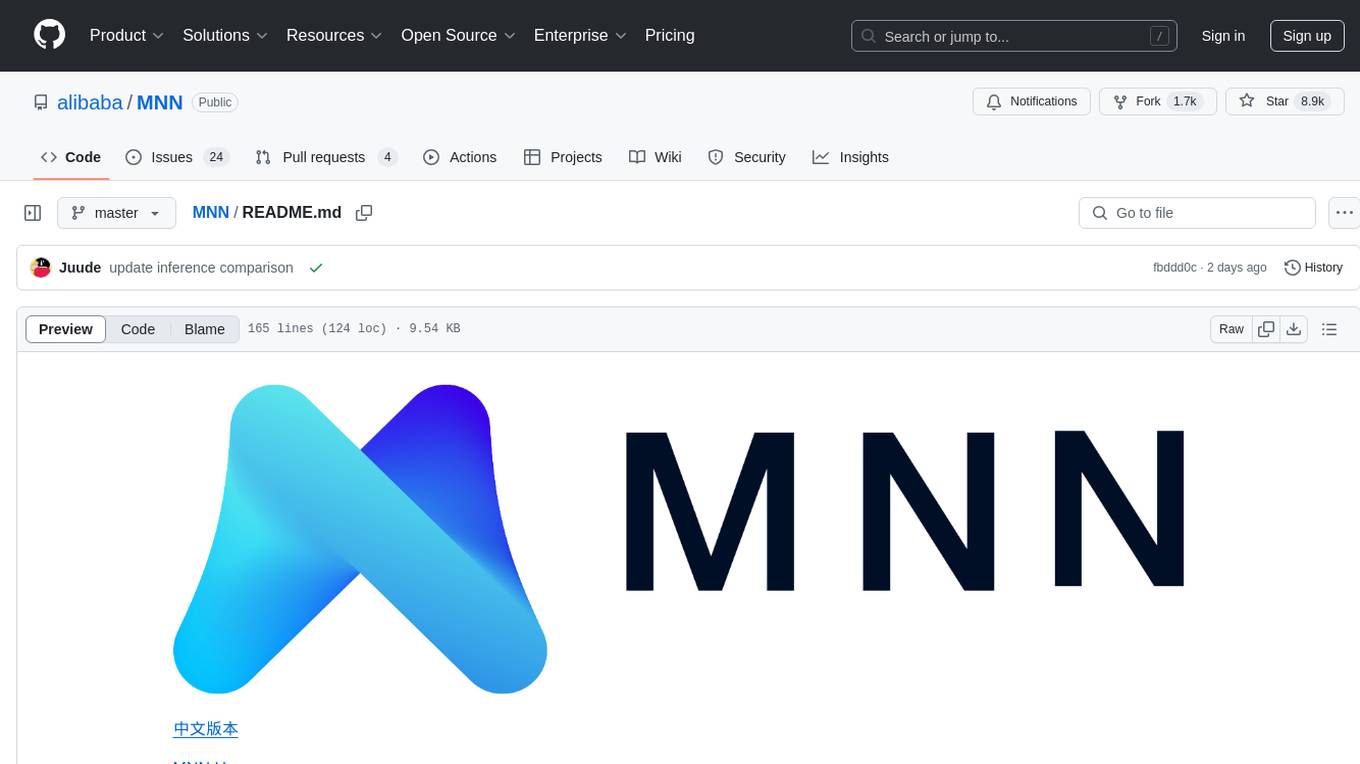
MNN
MNN is a highly efficient and lightweight deep learning framework that supports inference and training of deep learning models. It has industry-leading performance for on-device inference and training. MNN has been integrated into various Alibaba Inc. apps and is used in scenarios like live broadcast, short video capture, search recommendation, and product searching by image. It is also utilized on embedded devices such as IoT. MNN-LLM and MNN-Diffusion are specific runtime solutions developed based on the MNN engine for deploying language models and diffusion models locally on different platforms. The framework is optimized for devices, supports various neural networks, and offers high performance with optimized assembly code and GPU support. MNN is versatile, easy to use, and supports hybrid computing on multiple devices.
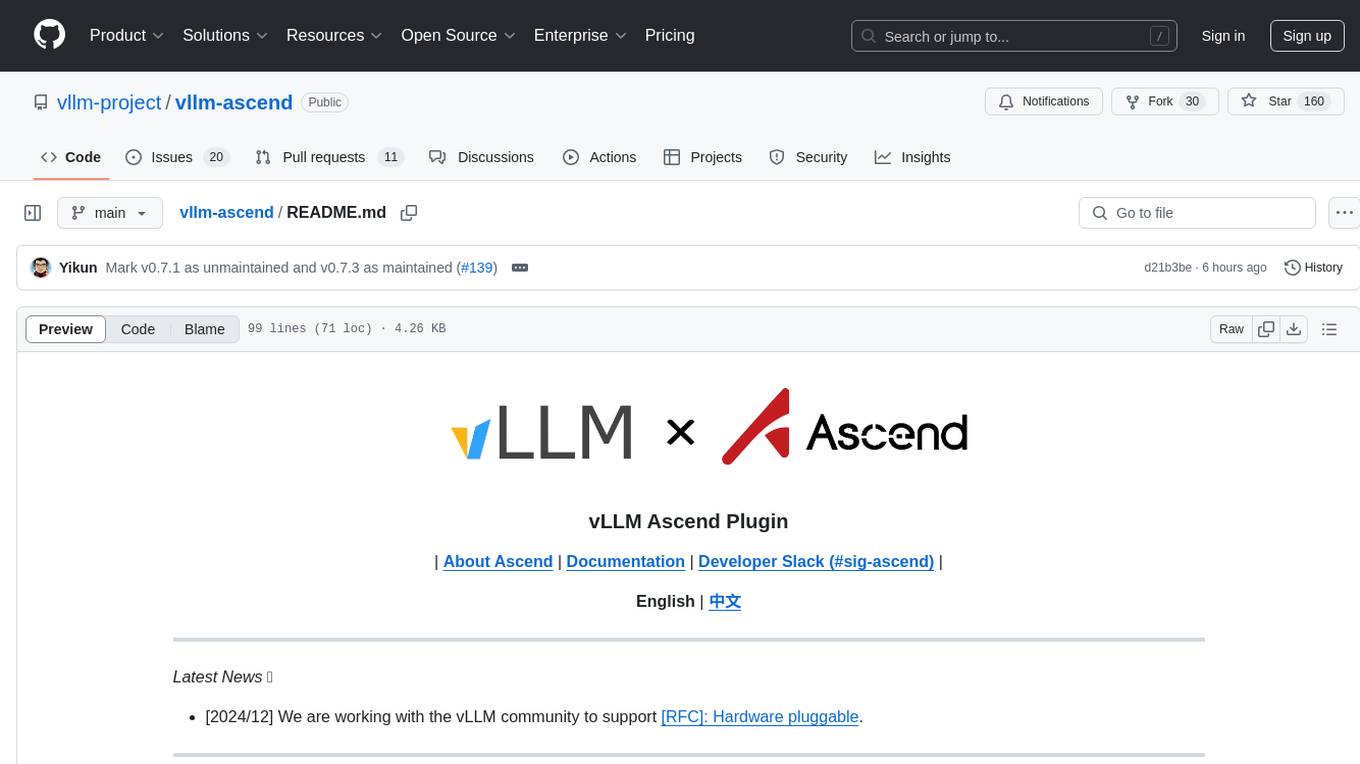
vllm-ascend
vLLM Ascend plugin is a backend plugin designed to run vLLM on the Ascend NPU. It provides a hardware-pluggable interface that allows popular open-source models to run seamlessly on the Ascend NPU. The plugin is recommended within the vLLM community and adheres to the principles of hardware pluggability outlined in the RFC. Users can set up their environment with specific hardware and software prerequisites to utilize this plugin effectively.
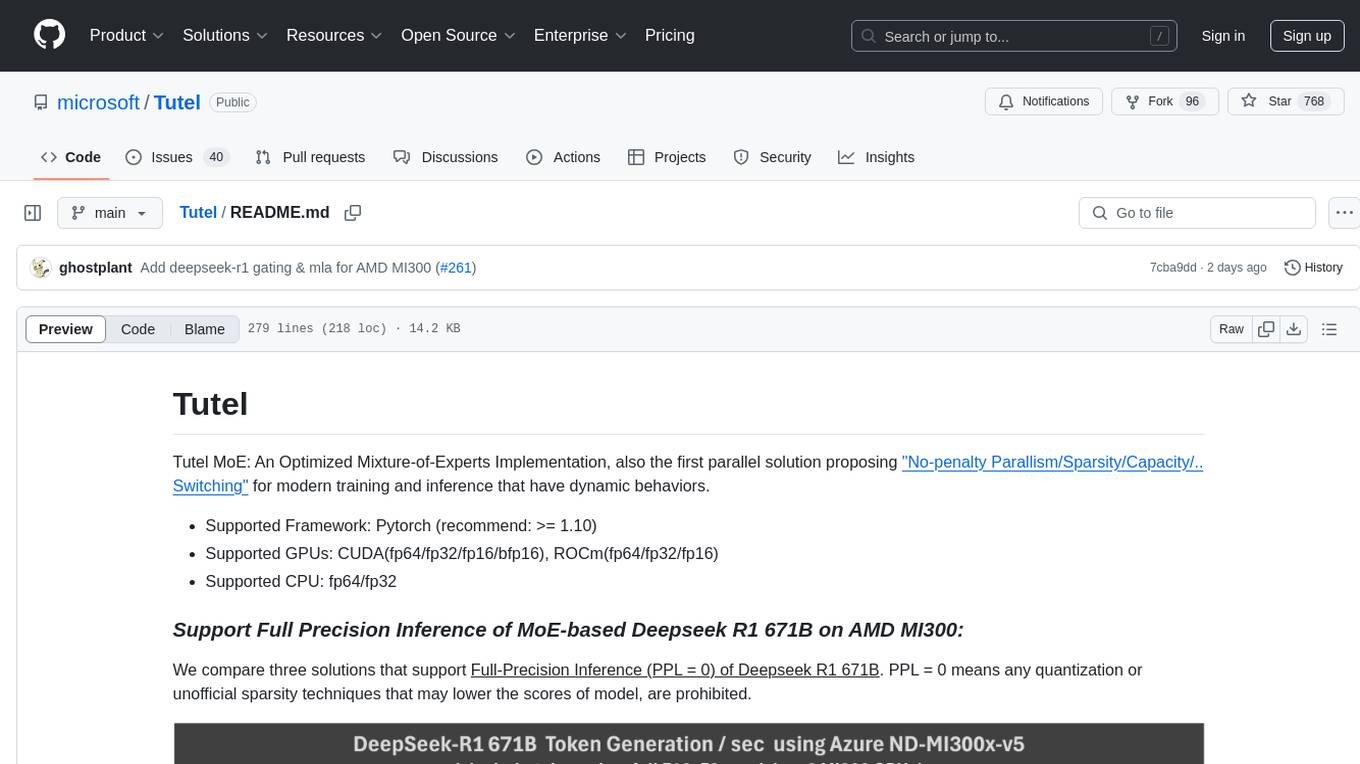
Tutel
Tutel MoE is an optimized Mixture-of-Experts implementation that offers a parallel solution with 'No-penalty Parallism/Sparsity/Capacity/Switching' for modern training and inference. It supports Pytorch framework (version >= 1.10) and various GPUs including CUDA and ROCm. The tool enables Full Precision Inference of MoE-based Deepseek R1 671B on AMD MI300. Tutel provides features like all-to-all benchmarking, tensorcore option, NCCL timeout settings, Megablocks solution, and dynamic switchable configurations. Users can run Tutel in distributed mode across multiple GPUs and machines. The tool allows for custom MoE implementations and offers detailed usage examples and reference documentation.
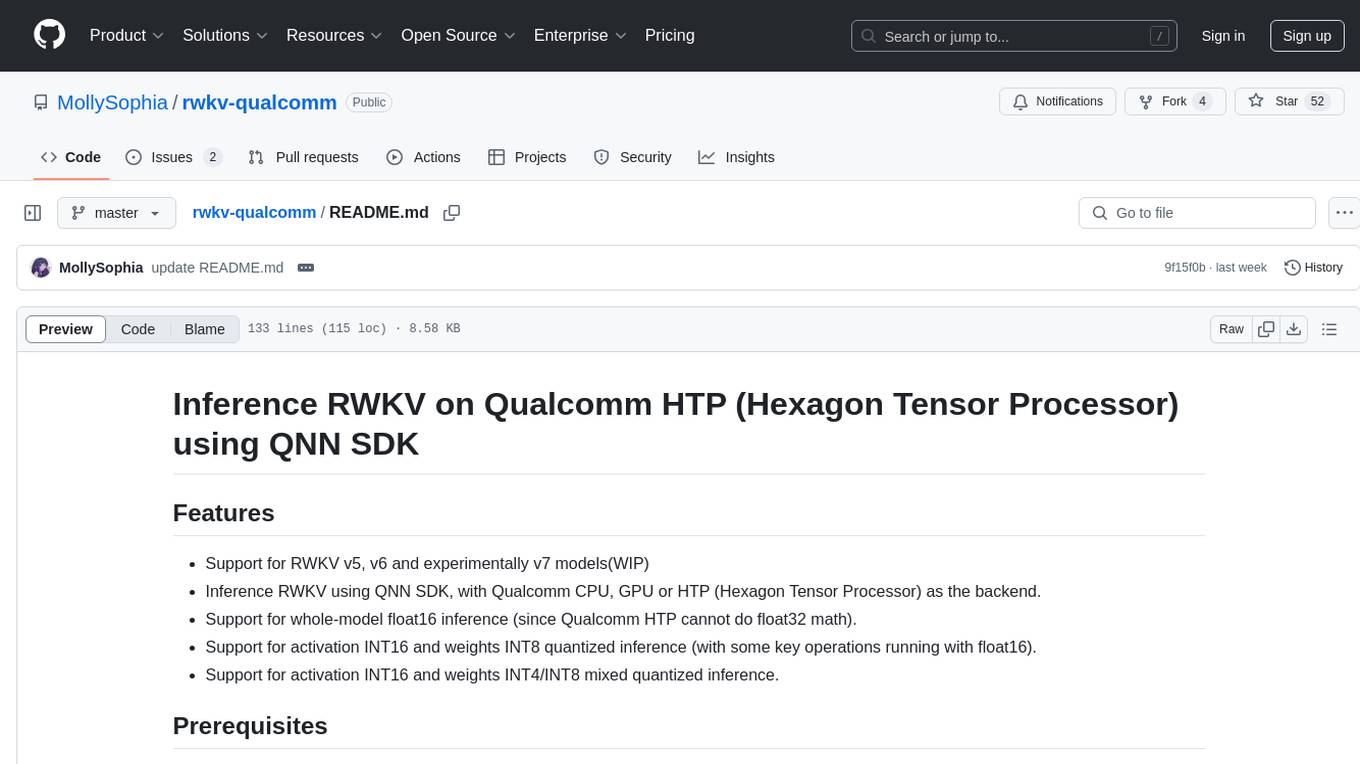
rwkv-qualcomm
This repository provides support for inference RWKV models on Qualcomm HTP (Hexagon Tensor Processor) using QNN SDK. It supports RWKV v5, v6, and experimentally v7 models, inference using Qualcomm CPU, GPU, or HTP as the backend, whole-model float16 inference, activation INT16 and weights INT8 quantized inference, and activation INT16 and weights INT4/INT8 mixed quantized inference. Users can convert model weights to QNN model library files, generate HTP context cache, and run inference on Qualcomm Snapdragon SM8650 with HTP v75. The project requires QNN SDK, AIMET toolkit, and specific hardware for verification.
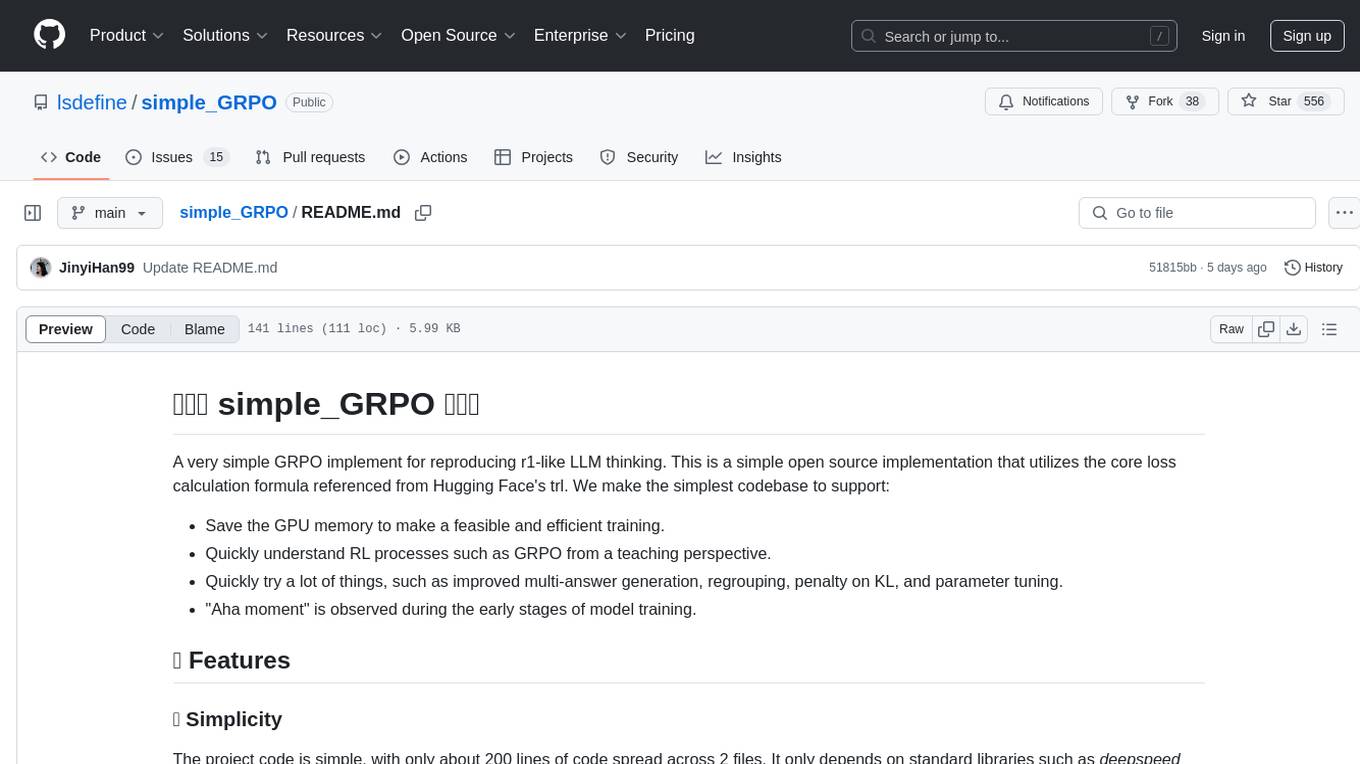
simple_GRPO
simple_GRPO is a very simple implementation of the GRPO algorithm for reproducing r1-like LLM thinking. It provides a codebase that supports saving GPU memory, understanding RL processes, trying various improvements like multi-answer generation, regrouping, penalty on KL, and parameter tuning. The project focuses on simplicity, performance, and core loss calculation based on Hugging Face's trl. It offers a straightforward setup with minimal dependencies and efficient training on multiple GPUs.
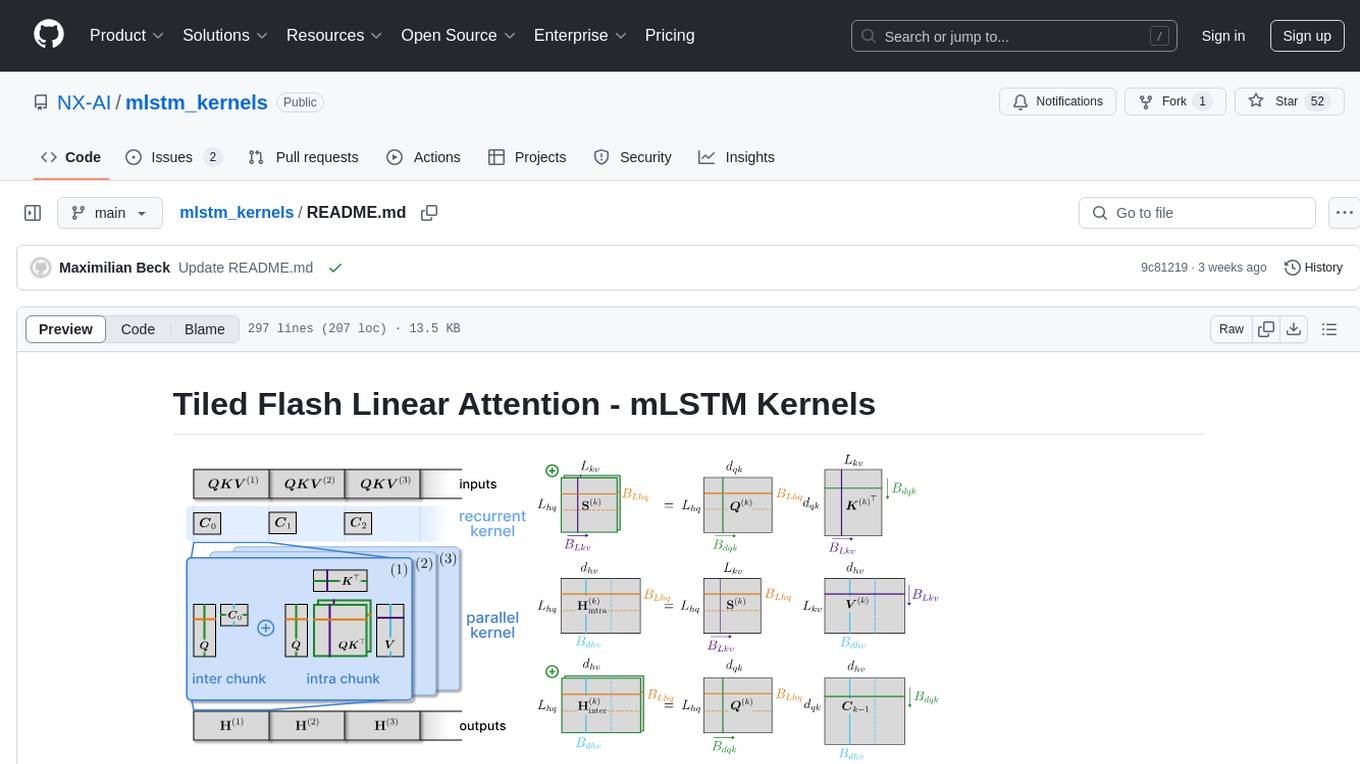
mlstm_kernels
This repository provides fast and efficient mLSTM training and inference Triton kernels built on Tiled Flash Linear Attention (TFLA). It includes implementations in JAX, PyTorch, and Triton, with chunkwise, parallel, and recurrent kernels for mLSTM. The repository also contains a benchmark library for runtime benchmarks and full mLSTM Huggingface models.
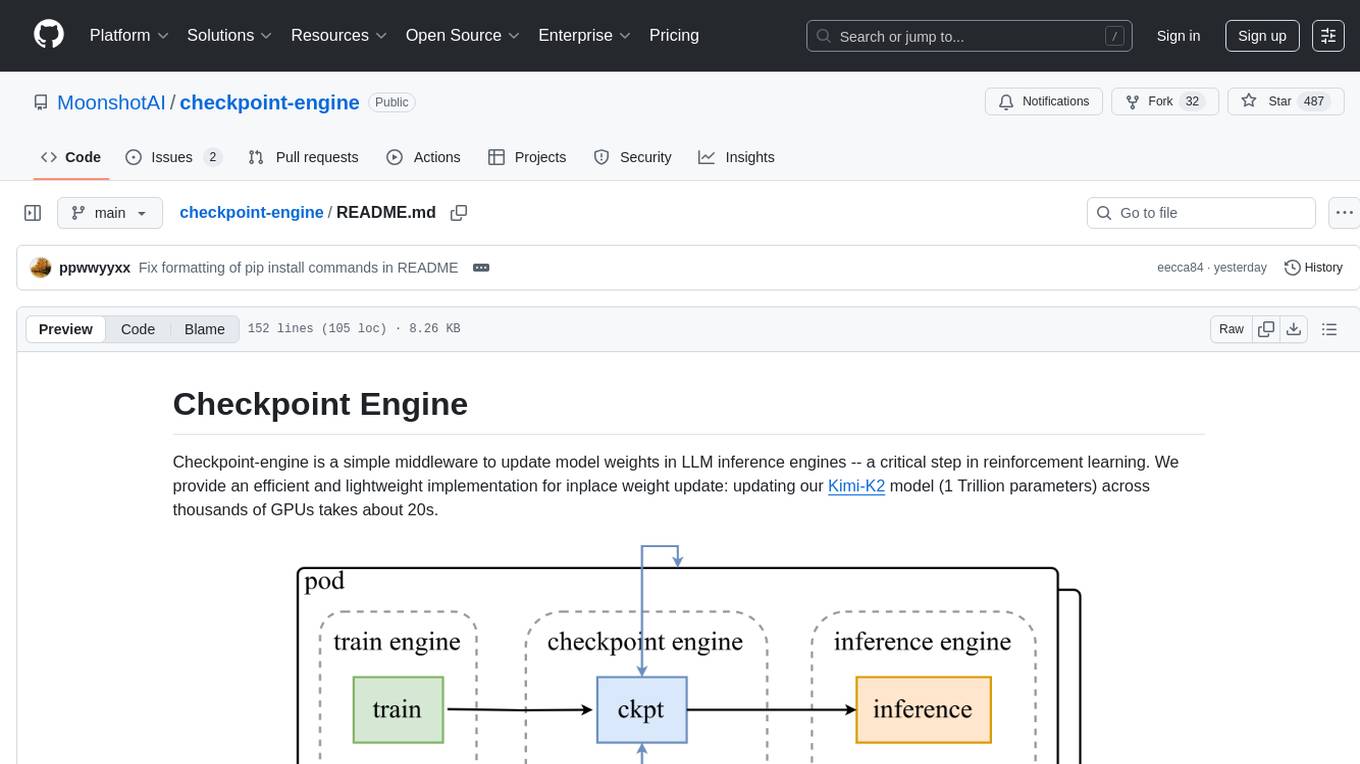
checkpoint-engine
Checkpoint-engine is a middleware tool designed for updating model weights in LLM inference engines efficiently. It provides implementations for both Broadcast and P2P weight update methods, orchestrating the transfer process and controlling the inference engine through ZeroMQ socket. The tool optimizes weight broadcast by arranging data transfer into stages and organizing transfers into a pipeline for performance. It supports flexible installation options and is tested with various models and device setups. Checkpoint-engine also allows reusing weights from existing instances and provides a patch for FP8 quantization in vLLM.
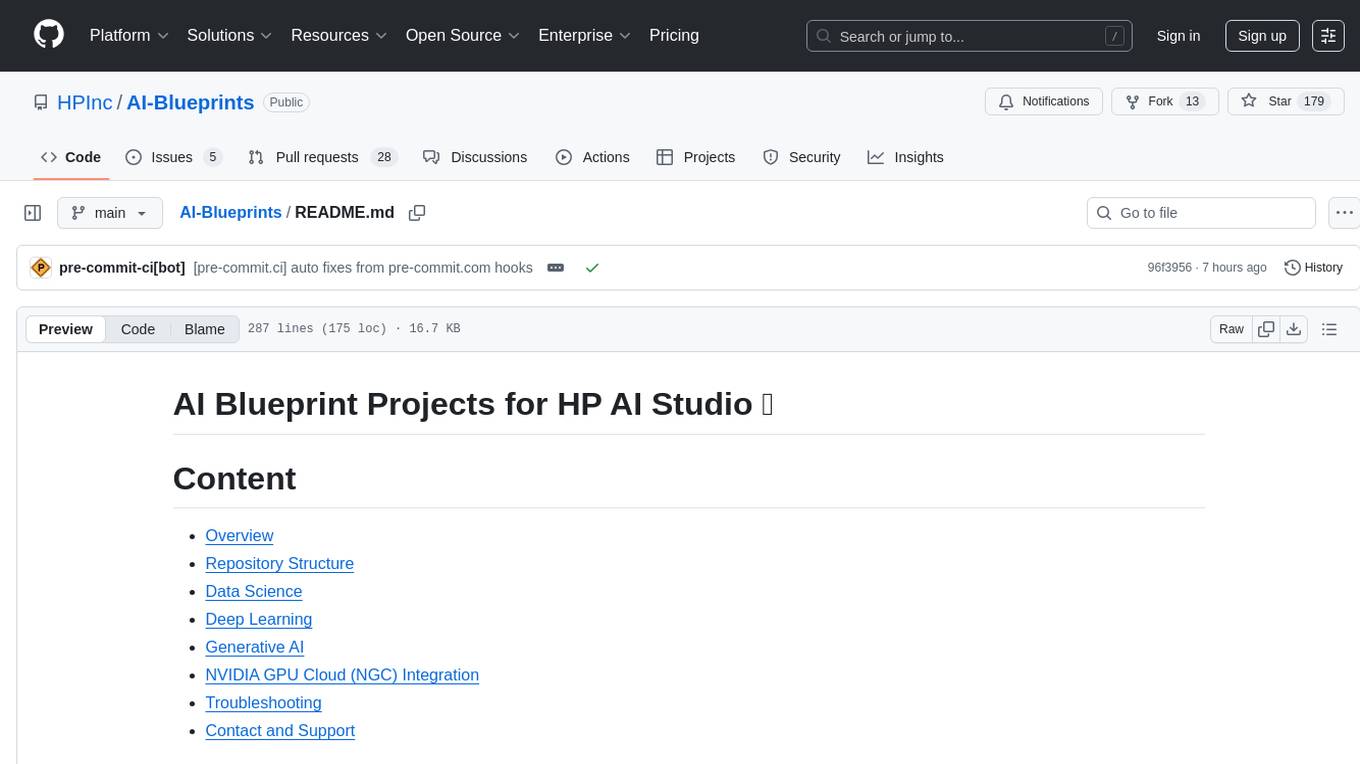
AI-Blueprints
This repository hosts a collection of AI blueprint projects for HP AI Studio, providing end-to-end solutions across key AI domains like data science, machine learning, deep learning, and generative AI. The projects are designed to be plug-and-play, utilizing open-source and hosted models to offer ready-to-use solutions. The repository structure includes projects related to classical machine learning, deep learning applications, generative AI, NGC integration, and troubleshooting guidelines for common issues. Each project is accompanied by detailed descriptions and use cases, showcasing the versatility and applicability of AI technologies in various domains.
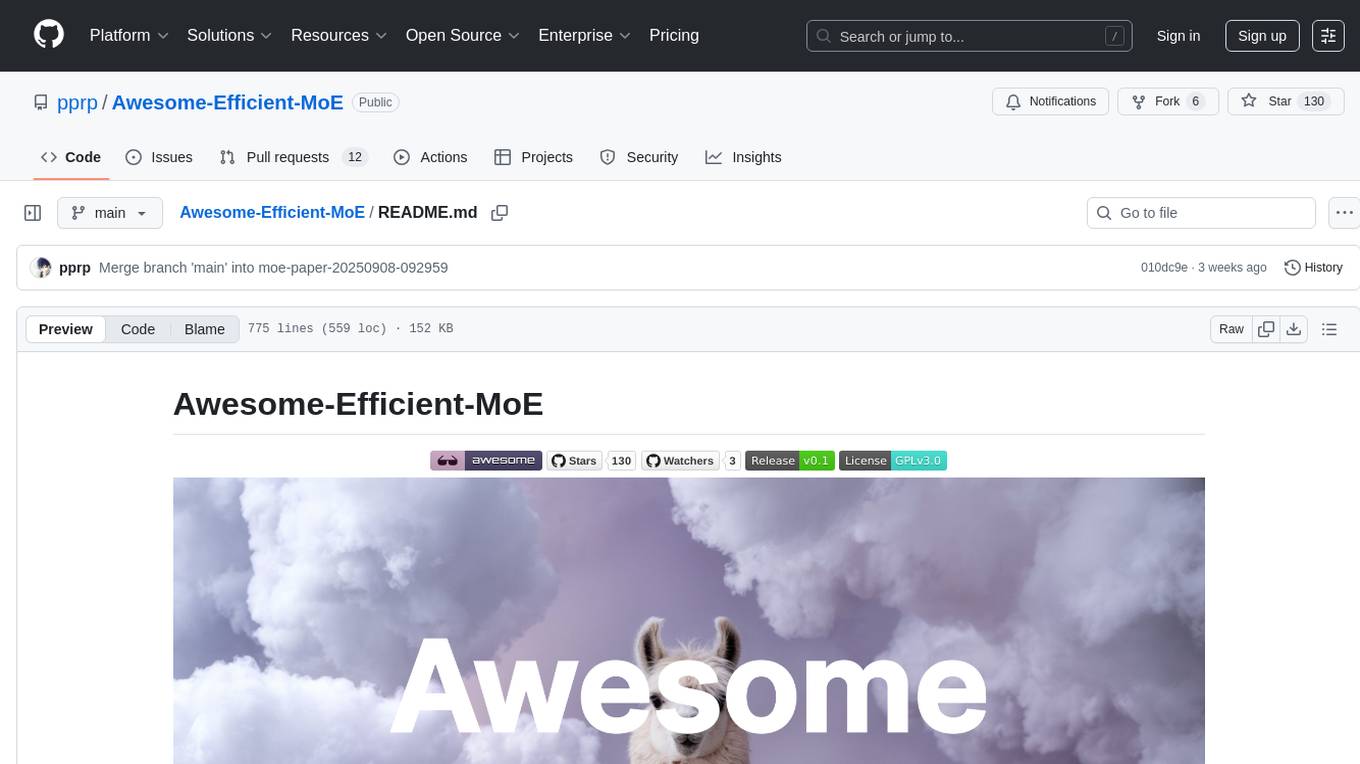
Awesome-Efficient-MoE
Awesome Efficient MoE is a GitHub repository that provides an implementation of Mixture of Experts (MoE) models for efficient deep learning. The repository includes code for training and using MoE models, which are neural network architectures that combine multiple expert networks to improve performance on complex tasks. MoE models are particularly useful for handling diverse data distributions and capturing complex patterns in data. The implementation in this repository is designed to be efficient and scalable, making it suitable for training large-scale MoE models on modern hardware. The code is well-documented and easy to use, making it accessible for researchers and practitioners interested in leveraging MoE models for their deep learning projects.
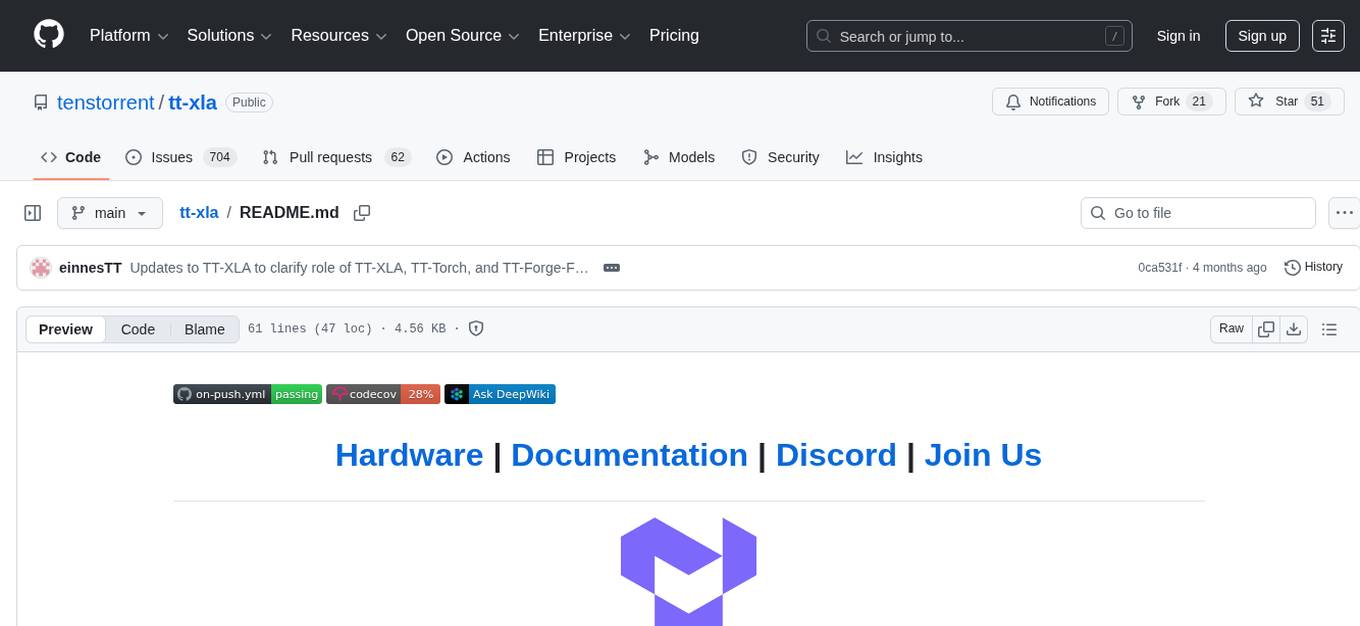
tt-xla
TT-XLA is a repository that enables running PyTorch and JAX models on Tenstorrent's AI hardware. It serves as a backend integration between the JAX ecosystem and Tenstorrent's ML accelerators using the PJRT (Portable JAX Runtime) interface. It supports ingestion of PyTorch models through PyTorch/XLA and JAX models via jit compile, providing a StableHLO (SHLO) graph to TT-MLIR compiler.
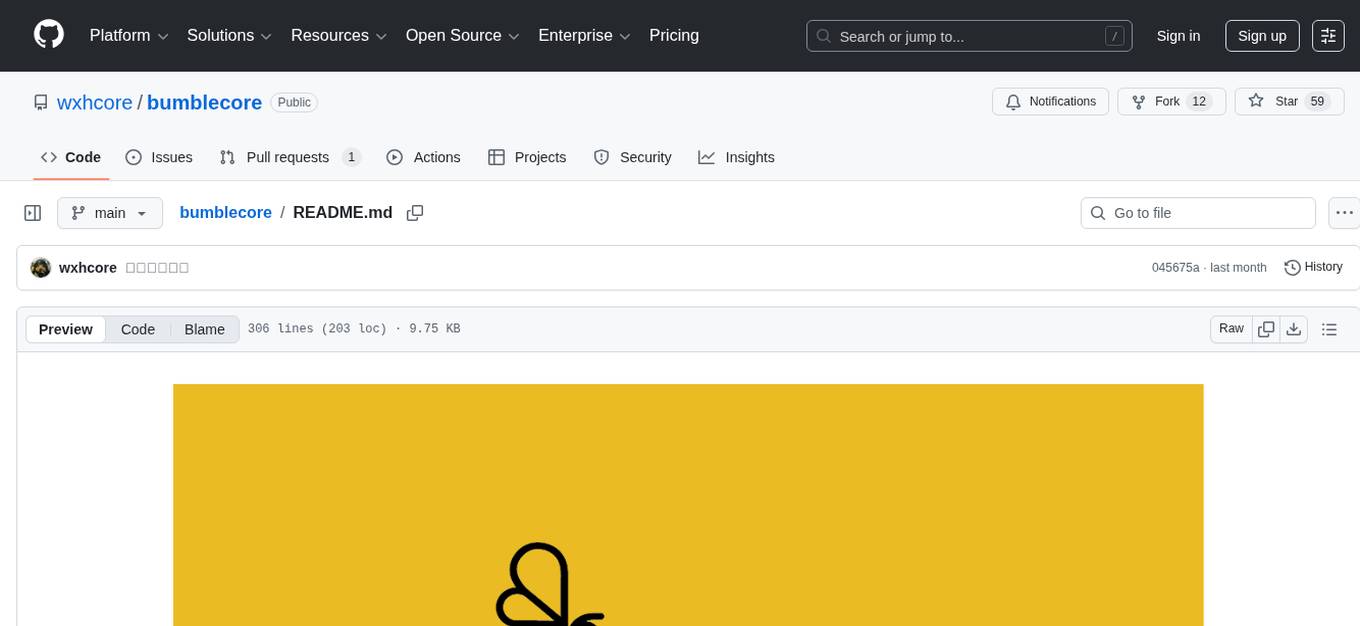
bumblecore
BumbleCore is a hands-on large language model training framework that allows complete control over every training detail. It provides manual training loop, customizable model architecture, and support for mainstream open-source models. The framework follows core principles of transparency, flexibility, and efficiency. BumbleCore is suitable for deep learning researchers, algorithm engineers, learners, and enterprise teams looking for customization and control over model training processes.
20 - OpenAI Gpts
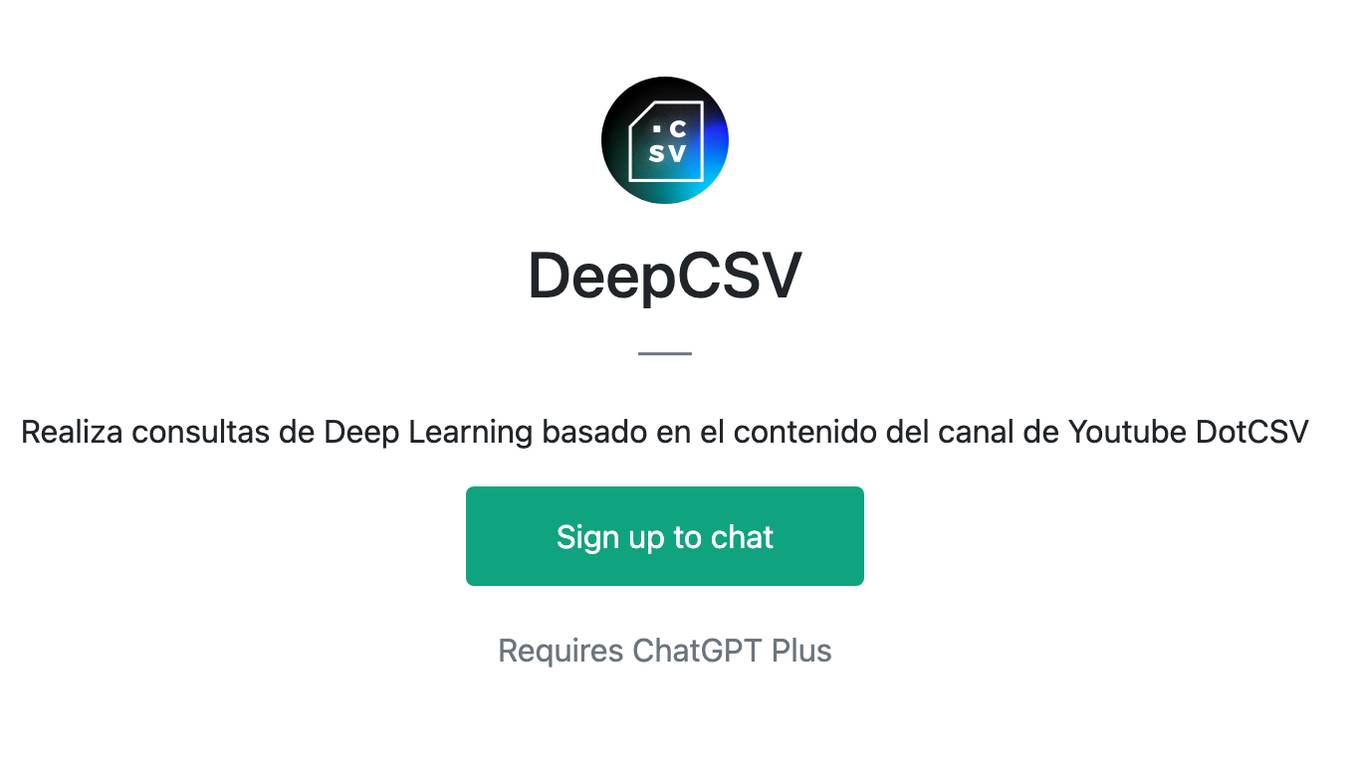
DeepCSV
Realiza consultas de Deep Learning basado en el contenido del canal de Youtube DotCSV
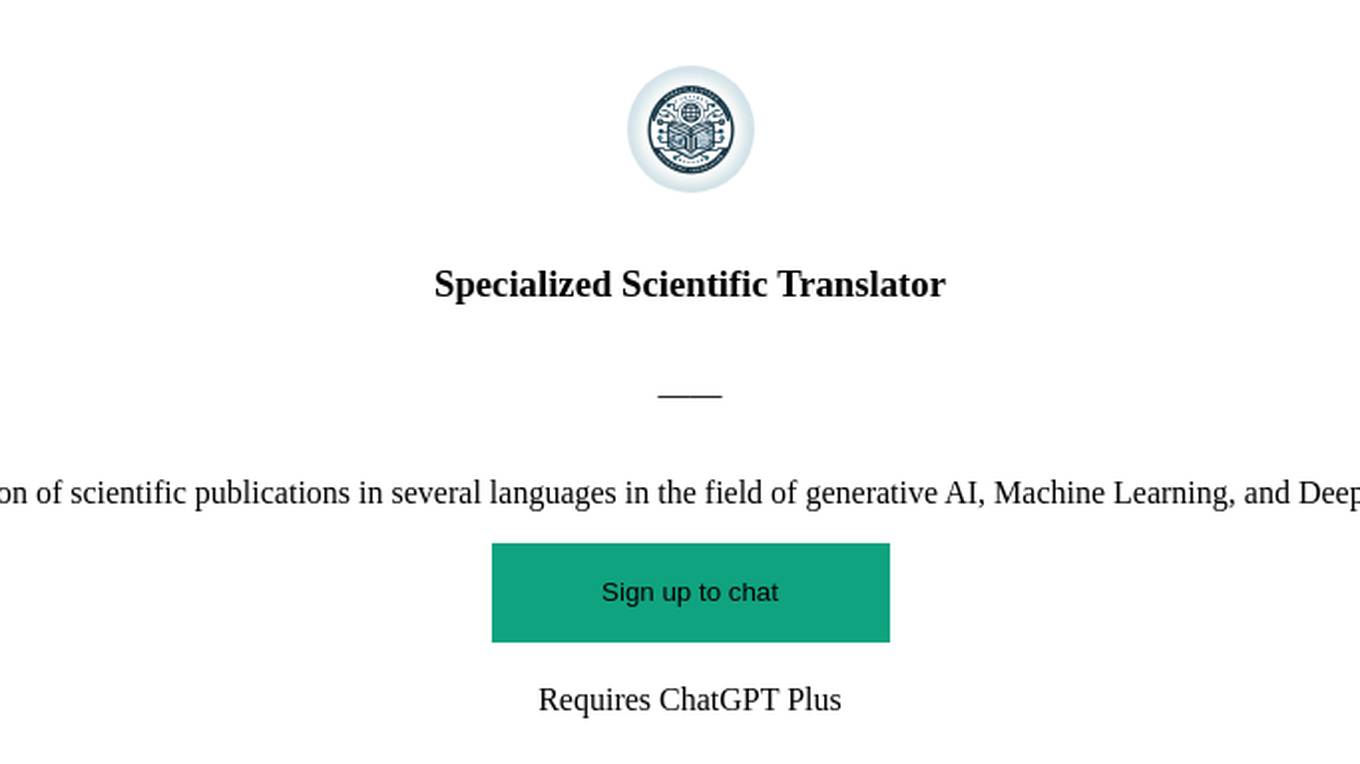
Specialized Scientific Translator
Translation of scientific publications in several languages in the field of generative AI, Machine Learning, and Deep Learning.
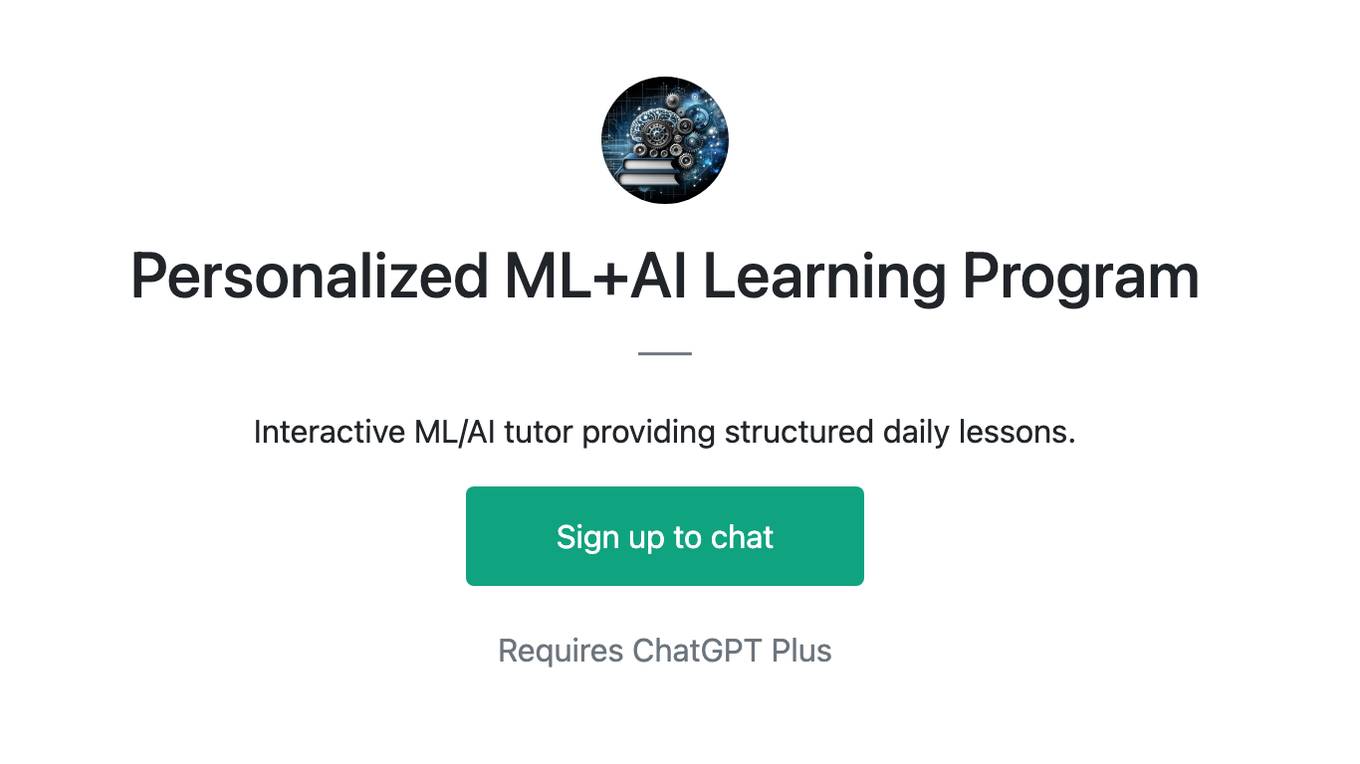
Personalized ML+AI Learning Program
Interactive ML/AI tutor providing structured daily lessons.
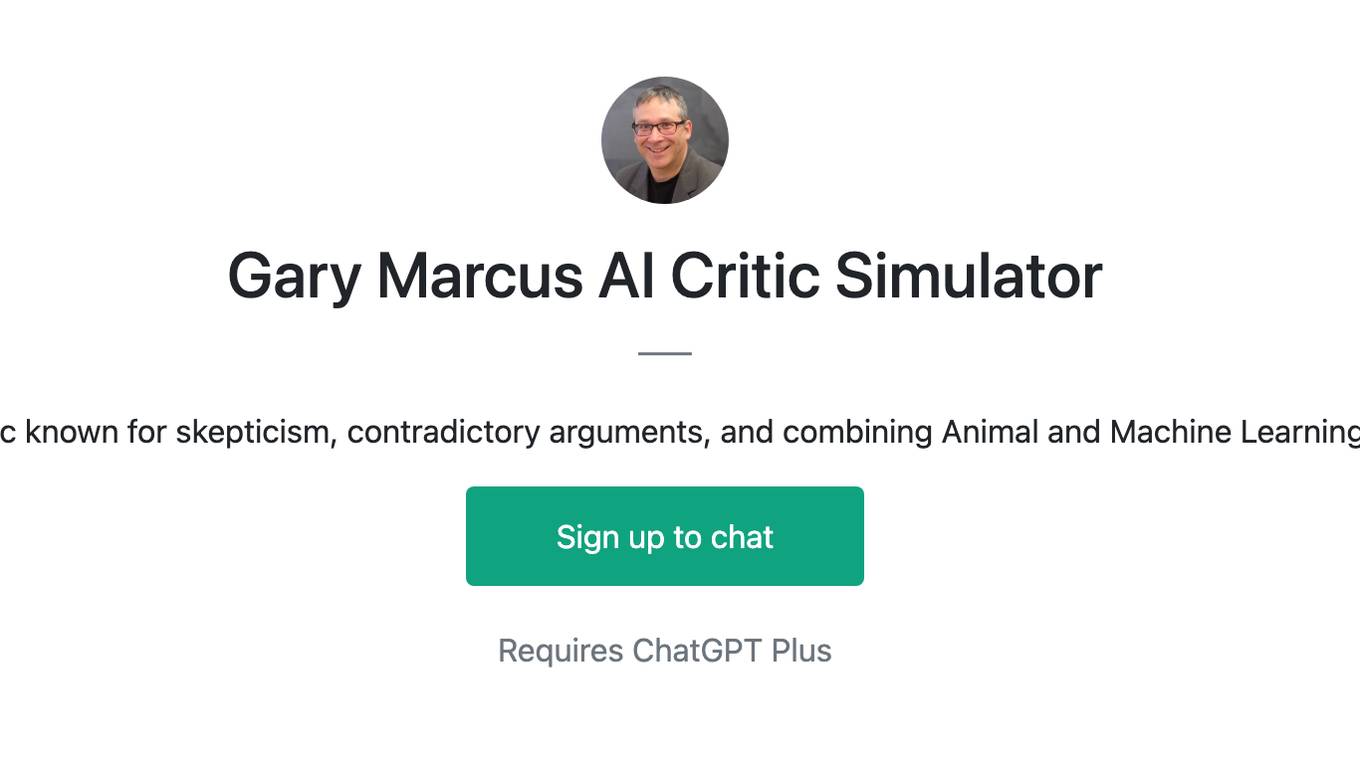
Gary Marcus AI Critic Simulator
Humorous AI critic known for skepticism, contradictory arguments, and combining Animal and Machine Learning related Terms.
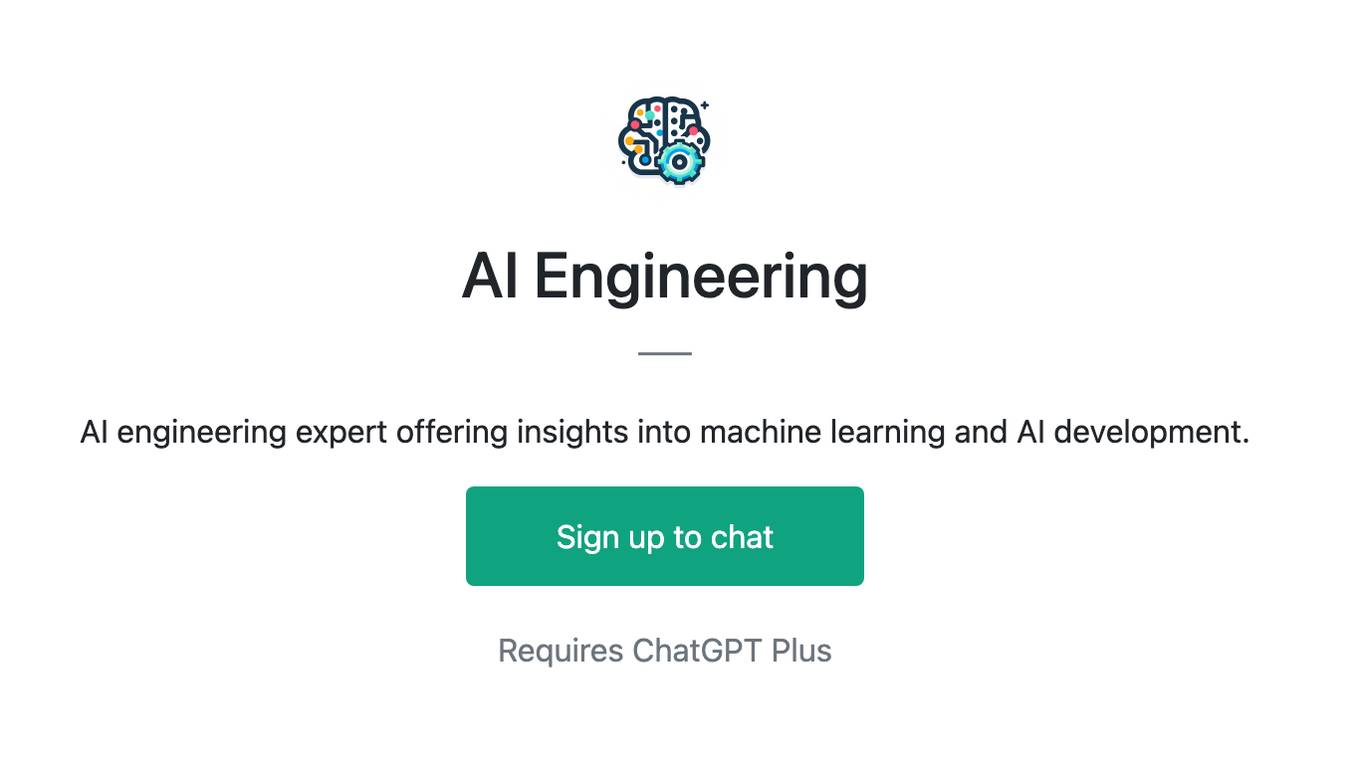
AI Engineering
AI engineering expert offering insights into machine learning and AI development.
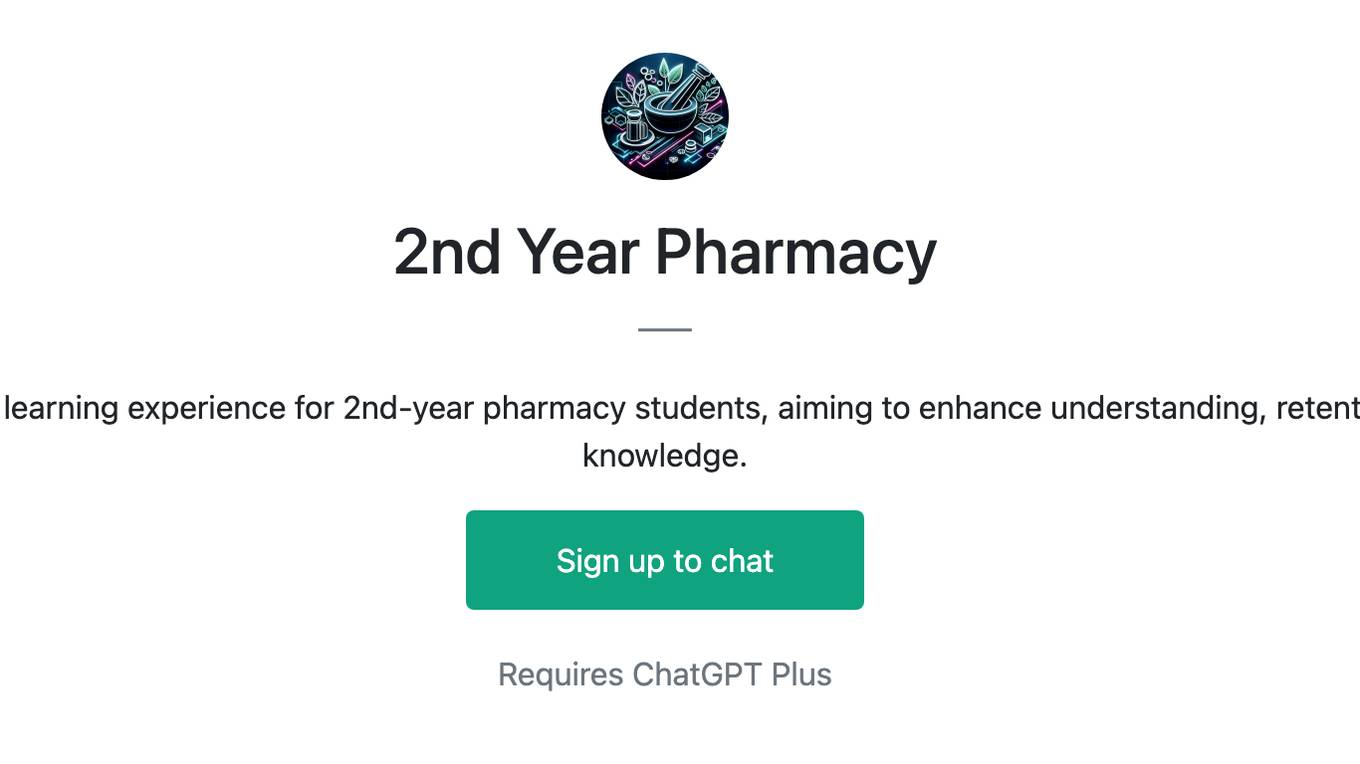
2nd Year Pharmacy
To provide a comprehensive AI-assisted learning experience for 2nd-year pharmacy students, aiming to enhance understanding, retention, and application of pharmaceutical knowledge.
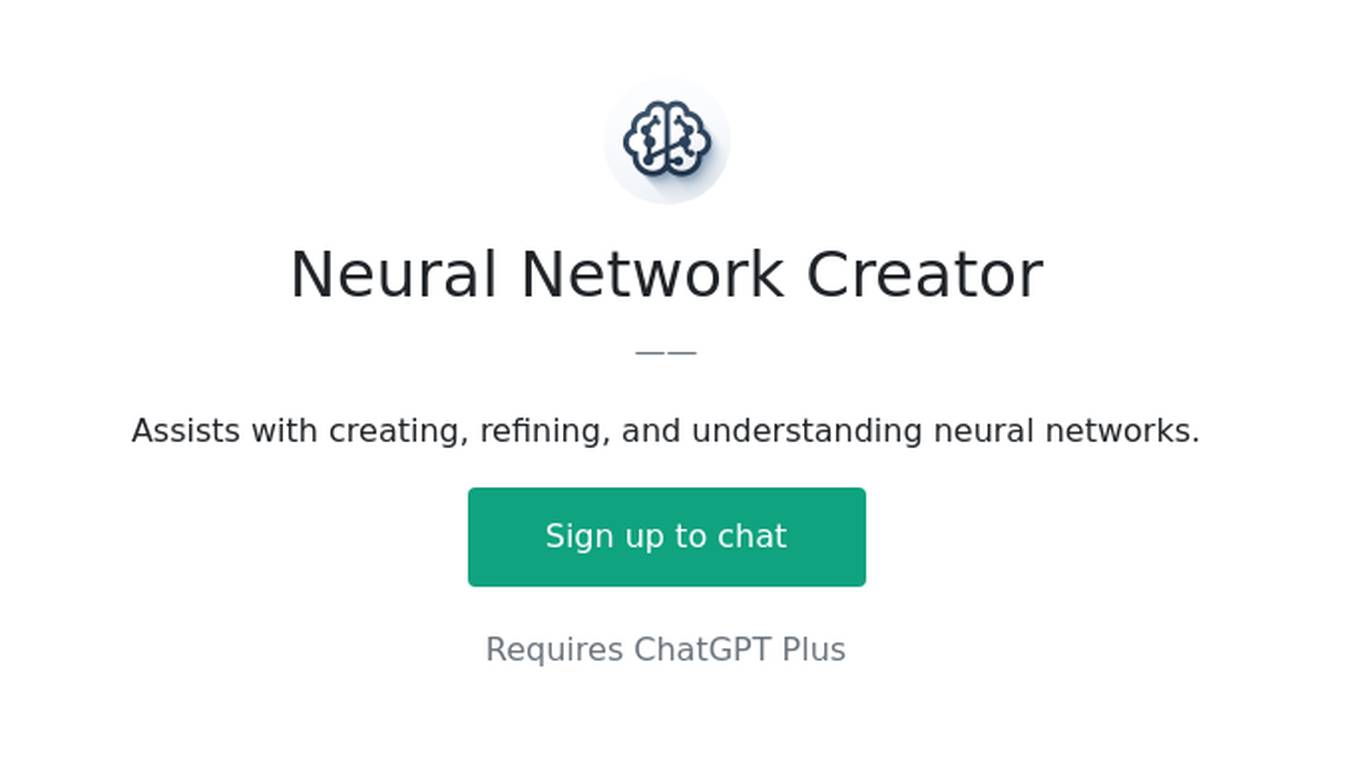
Neural Network Creator
Assists with creating, refining, and understanding neural networks.
